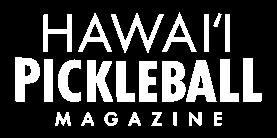
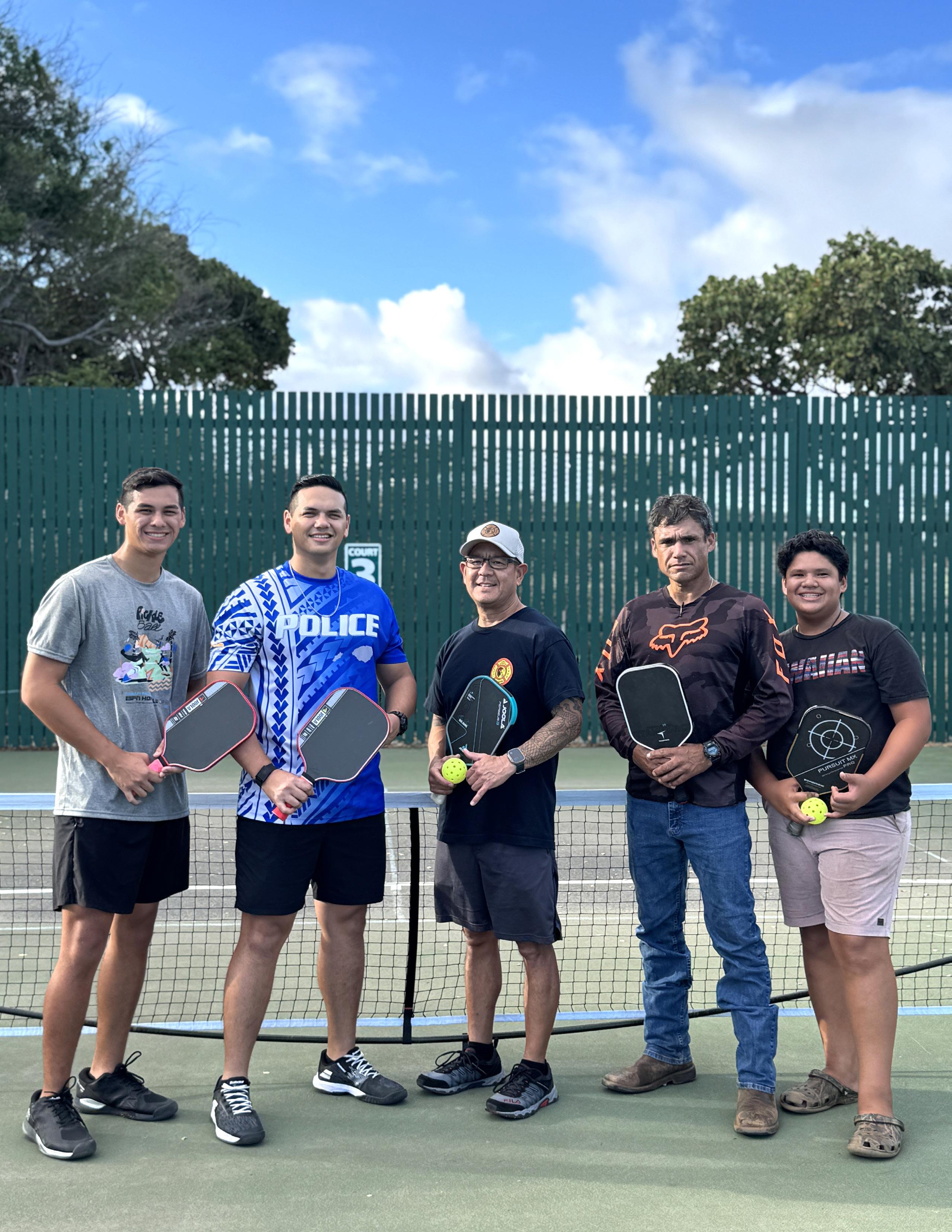
TWO YEARS
STRONG FROM ASHES TO THE COURT: MAUI PICKLEBALLERS REFLECT ON WHAT’S BEEN LOST—AND WHAT’S BEEN FOUND
HAWAI‘I EDITION | ISSUE #10 | AUGUST 2025

ALOHA PLAYS HERE. ALL LOCAL. ALWAYS.
PROUDLY PUBLISHED BY HAWAII PICKLEBALL




PROUDLY PUBLISHED BY HAWAII PICKLEBALL
AS WE CELEBRATE TWO YEARS OF HAWAII PICKLEBALL MAGAZINE, WE’RE FILLED WITH GRATITUDE FOR THIS INCREDIBLE COMMUNITY THAT’S GROWN WITH US — ON AND OFF THE COURT.
This issue wouldn’t be possible without the generous support of our anniversary sponsors, partners, and contributors. Your belief in this publication helps keep our mission moving forward: to spread the aloha spirit far and wide by telling the stories of the people, places, and passion that make Hawaii’s pickleball scene so special.
To our incredible volunteer team...we're grateful beyond words. We couldn’t have done it without you.
JANA CHANG
CARLTON CHUN
BRUCE FUJIMOTO
MARI FUJIO
CAROL FURUYA
KATA BIAKINA CLEMENS GRAUTE
TOSHIKO JAGER
JEANNIE KAWAKAMI
NORMAN KAWAKAMI
SANDY KOBAYASHI
RIKKI MITSUNAGA
TO OUR PROS:
HONZA HROCH CONNER KOGA
GARY NAKANO CAROL TANJI
NOAH TOM ANNIE YOKOYAMA
DANIEL RODI KEVEN WONG
...AND TO MARTINA KOSTALOVA AND THE CREW AT PICKLES AT FORTE, OUR INCREDIBLE HOSTS.
JEN WILSON, EDITOR
KEEPING IT LOCAL.
TRACEY BENNETT
OUR GO-TO RULES GURU AND REFEREE COLUMNIST. KYLE PAREDES BRINGS TOP-TIER INSIGHT TO EVERY COLUMN. ENDLESS THANKS TO TRACEY AND KYLE — YOUR MONTHLY INSIGHTS MAKE US BETTER PLAYERS.
ROCKIE CHONG, CODIE CHONG, JAY FUJITA, KENEKE KUKAHIKO AND KEIJI KUKAHIKO
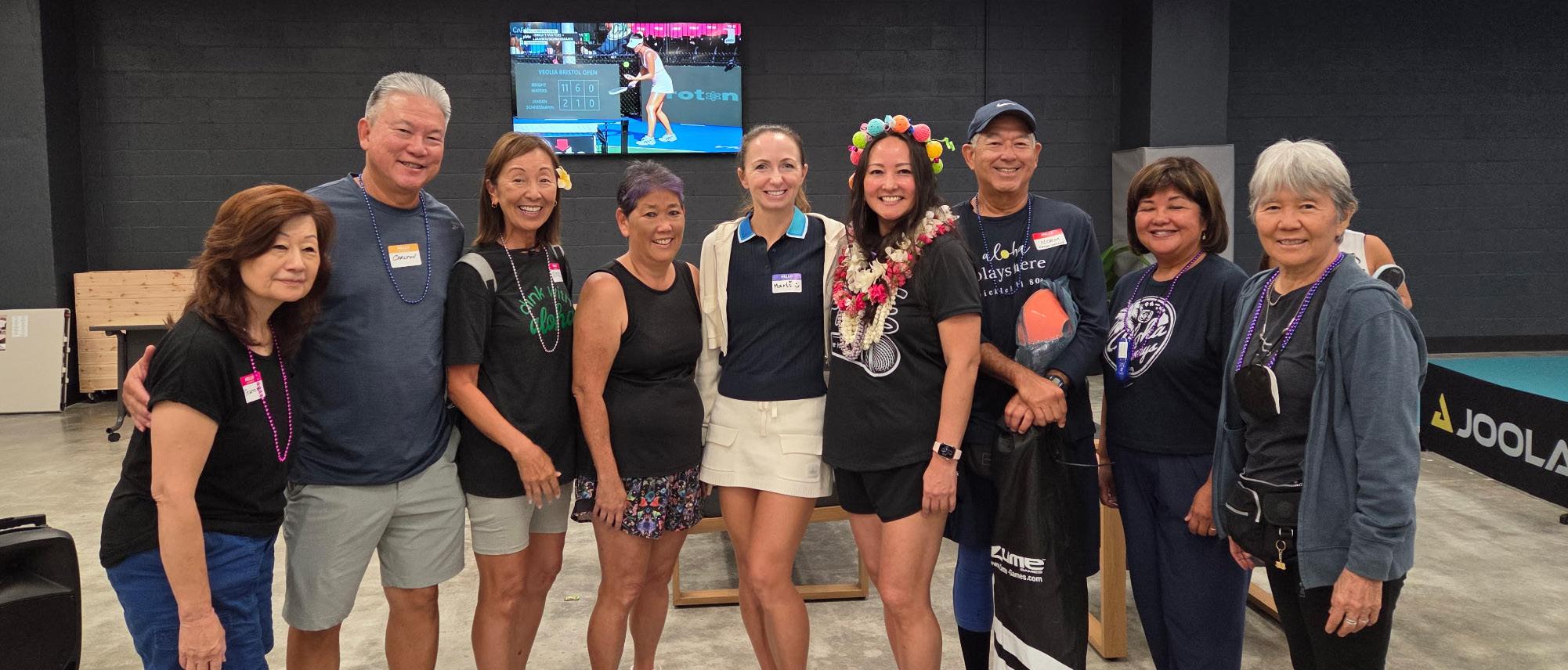


TWO YEARS AGO, ON AUGUST 8, 2023, WE HIT “SEND” ON THE VERY FIRST ISSUE OF HAWAII PICKLEBALL MAGAZINE—WITH NO IDEA THAT AUGUST 8 ALSO HAPPENED TO BE NATIONAL PICKLEBALL DAY.
I didn’t plan it that way. But looking back, I love that this magazine was born on a day already meant to celebrate the sport we love so much. Since that first issue, we’ve grown alongside the pickleball community across the islands and beyond.
We’ve told the stories of rising stars and everyday players who’ve made the sport what it is in Hawaii. What began as a simple idea has become something much bigger: a way to reflect the energy, heart, and aloha of our Hawaii PB community.
This August, as we mark our two-year milestone, we do so with celebration and with remembrance.
August 8 is also the anniversary of the Maui Wildfires. In this issue, we honor that day with a special feature: four vignettes from Maui players.
What may surprise you, and what surprised me, is that these stories aren’t about tragedy and blame. Instead, they’re rooted in resilience, gratitude, and the ways people choose to move forward. They remind us that healing doesn’t always happen in obvious places. Sometimes, it happens on a court, with a paddle in hand, surrounded by others who show up, again and again.
To everyone who has supported Hawaii Pickleball Magazine, whether you’ve been reading since day one or just picked up your first issue...mahalo. This anniversary edition is more than a celebration. It’s a reflection of where we’ve been and a reminder of what this community can do when it comes together.
#seewhatpickleballcando
With aloha and deep gratitude,
Jen Wilson Editor, Hawaii Pickleball Magazine HPM
Three Generations
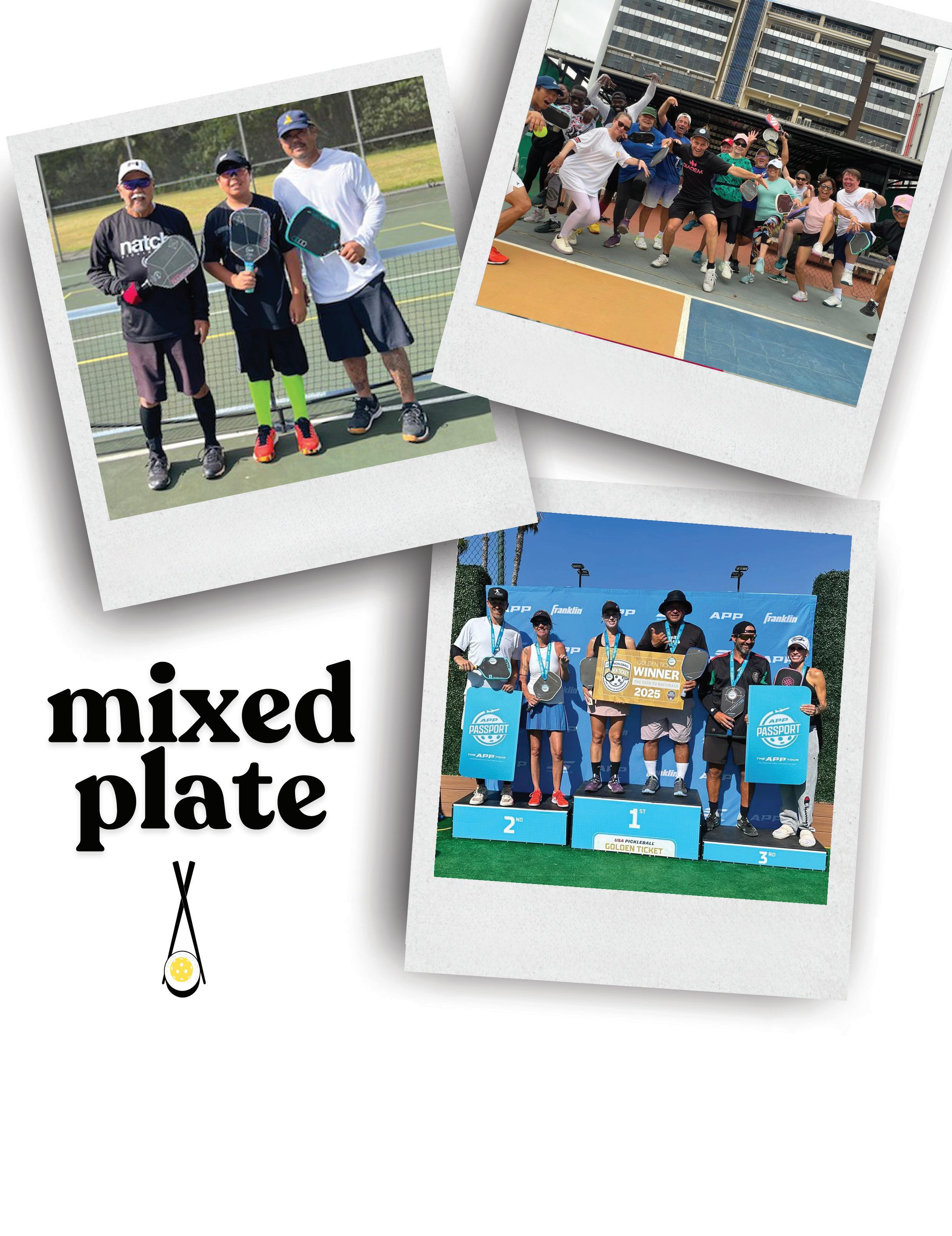
Photo #1: From age 10 to 70, three generations of the Kano family play pickleball. From L-R: Reed (70), Brayden (10), and Davin (43)
Photo #2: Kauai players showing their playful side after a clinic in Nairobi
Photo #3: This Garden Isle duo (Brant and Seela) struck gold at APP Newport Beach, bringing their winning game and aloha spirit HPM
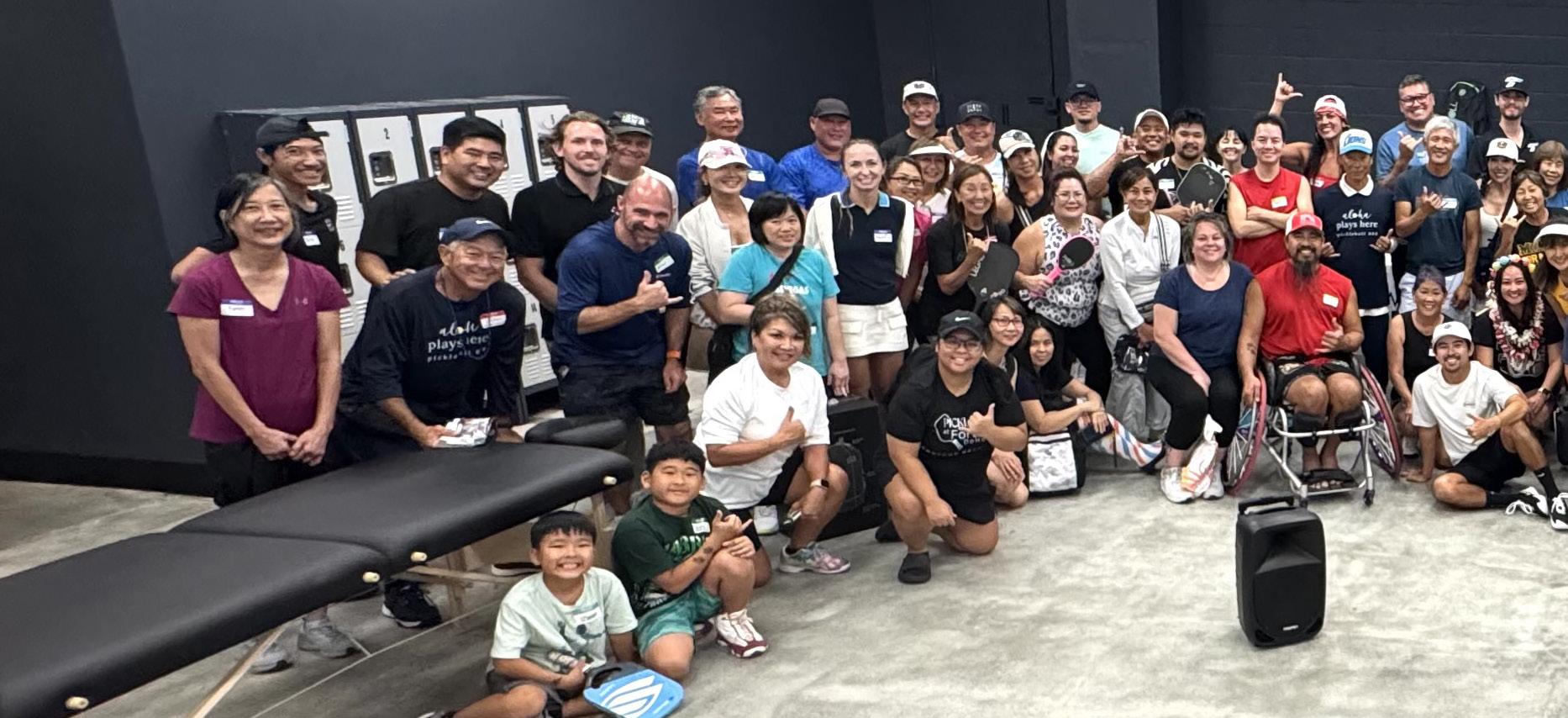
When we scheduled our very first email newsletter to go out at 6:27 a.m. on August 8, 2023, we had no idea what was about to unfold. What started as an email to just 64 people has since grown into a digital magazine, a community, and a statewide movement. Here’s a look back at some of the moments, big and small, that brought us to today.
AUGUST 7, 2023
At 11:00 p.m., the first "Pickleball 808" newsletter was scheduled to send the next morning…to 64 people.
AUGUST 8, 2023

22, 2023
At 6:27 a.m., our very first issue launched, featuring “Pickleballers in the 808” Mel and Jennifer Ona. As Oahu was just beginning to stir, Maui was already in crisis—a tragedy we wouldn’t fully grasp until later that morning What we also didn’t realize? August 8 just happened to be National Pickleball Day.
Two weeks later, the next newsletter featured Brian and Joy Rogers.
29, 2023
We shared a video interview with local pro Keven Wong about being selected to star in “Pickleball Paddle Battle”
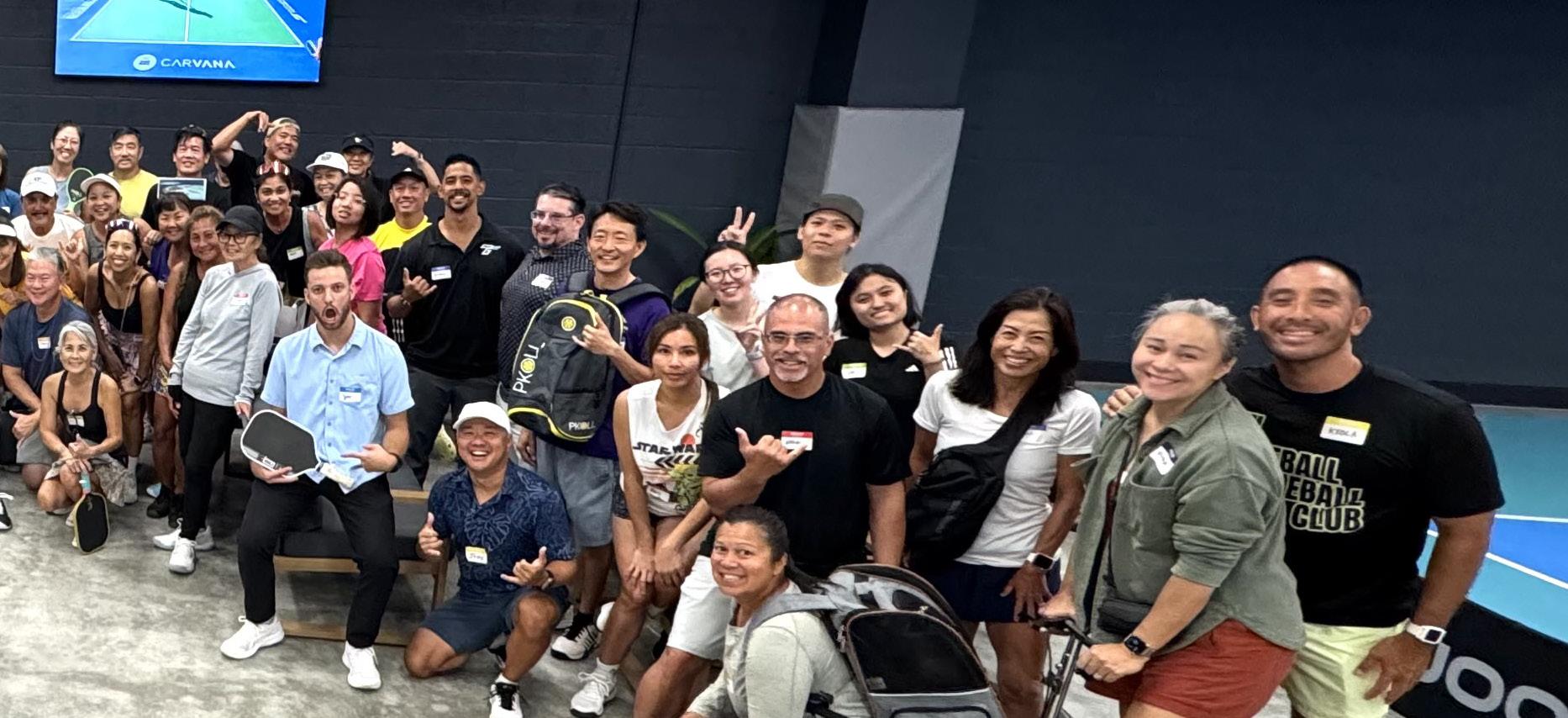
APRIL 2024
Sixteen Oahu players flew to Maui for the first-ever inter-island pickleball event, the Maui-Oahu Ohana Style Social Mixer—an intentional effort to build community across islands.
AUGUST 8, 2024
We celebrated our first anniversary with a community giveaway with $2500+ in prizes.
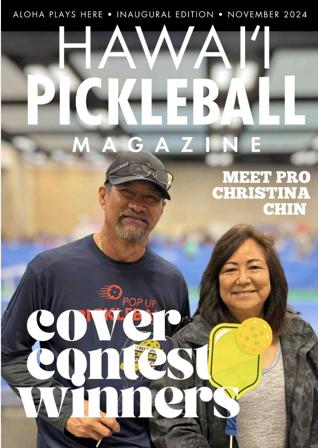
NOVEMBER 5, 2024
We officially launched Hawaii Pickleball Magazine as a digital monthly publication. Our first cover featured contest winners Glenn Gabriel and Colleen Omai, chosen by the HPM Ambassador Team. The weekly “Pickleball 808” newsletter also got a name upgrade to match the magazine.
3, 2024
We closed out the year with a festive (and inspiring) holiday issue featuring Garrett Kuwada.
JANUARY 2025
We kicked off the new year with a feature on Hawaii’s own Bobbi Oshiro—fresh off a Nationals double gold and our first professional athlete cover story.
2025
We announced the launch of our sister publication: New Mexico Pickleball Magazine.
JULY 11, 2025
We took HPM on the road (er, the rail) and visited our pickleball friends in Sapporo, Japan.
AUGUST 8, 2025
We mark two years of stories, community, and aloha with an epic giveaway and our first in-person anniversary celebration at Pickles at Forté. Along the way, we’ve featured players from Oahu, Maui, Kauai, and the Big Island—each one part of the fabric that makes this community so special. HPM

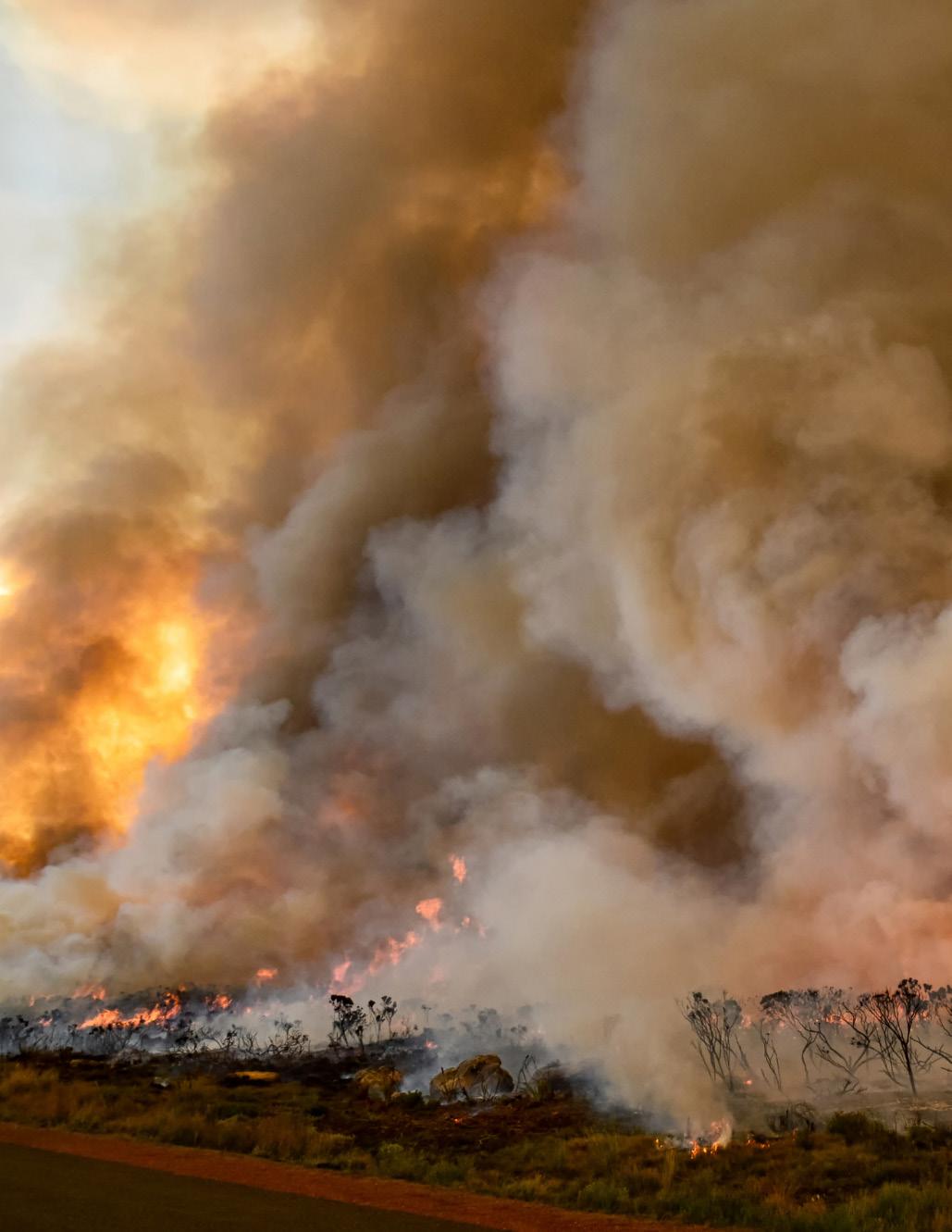
Icame into these interviews expecting heavy conversations—reflections soaked in emotion and lingering trauma. After all, the Maui Wildfires stand as the deadliest wildfire in the U.S. in more than a century. But what I found instead surprised me. These weren’t stories about tragedy, self-pity, or blame. They were stories of resilience. They were stories of forward motion and hope—and of the truths we uncover about the strength of the human spirit.
Each person I spoke with had processed the events of August 8th in their own way, and found the courage to move ahead. Not with denial or dismissal, but with resolve. I heard about perspective, priorities, and the ways those days reshaped how they now approach life, family, and community. For them, honoring Maui means continuing to live well, lead well, and stay grounded in gratitude. Here are their stories.
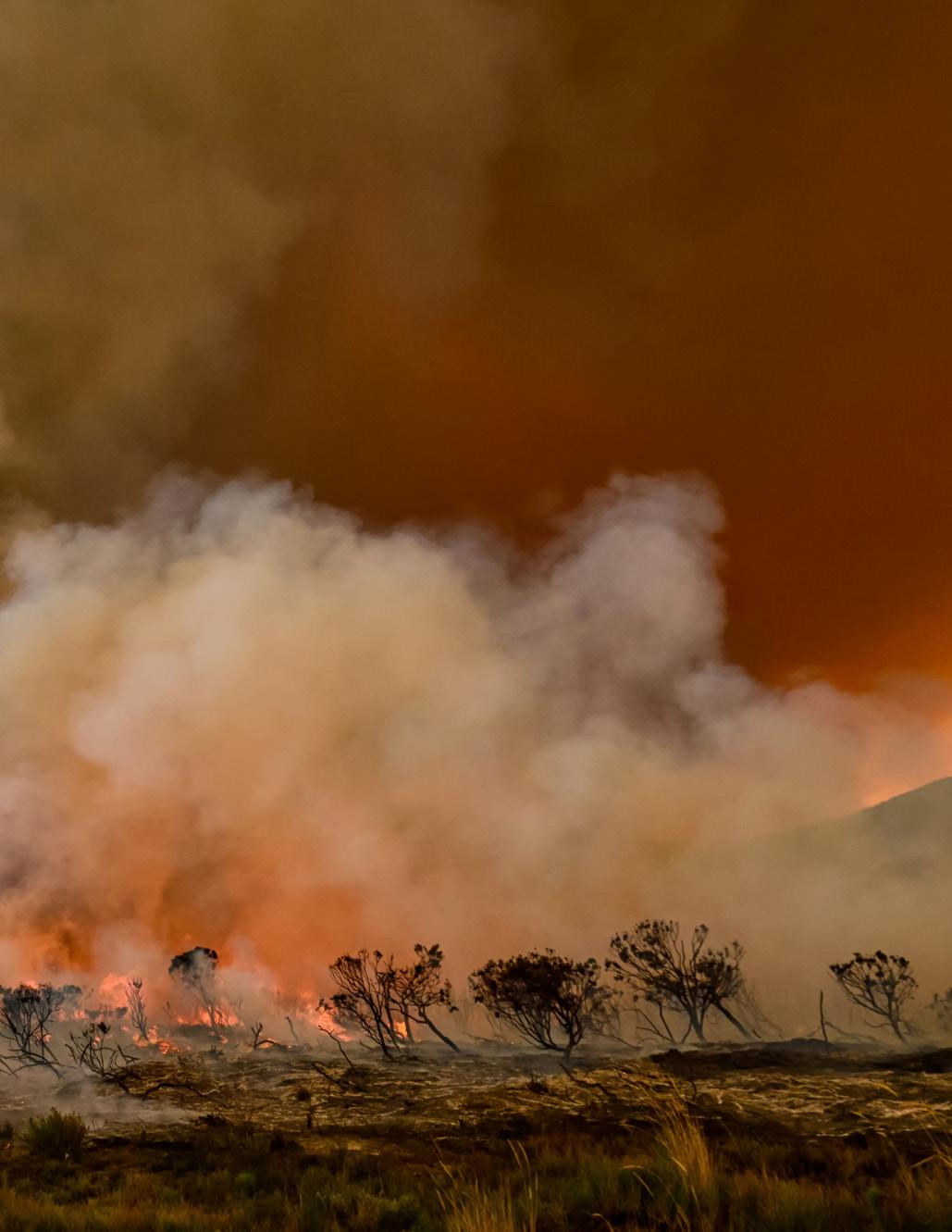
Fire Captain Jay Fujita didn’t plan to become the face of Maui’s wildfire response. He’s not someone who seeks the spotlight. He’d rather be behind the scenes, taking care of his crew and doing the work. But when 60 Minutes came calling, he stepped up…not for attention, but for Maui.
Jay was born in California but raised in Maui from age six. A former schoolteacher, he’s been with the fire department since 1999 and now leads Engine 1 out of Wailuku Station. What still stays with him from that day in August 2023 is a humbling realization: “This was one of the few times in my career that we didn’t win.”
Jay and his crew pushed into the fire with courage, fully aware that their own brothers in the department were losing homes at that very moment. “Some of those homes had been in families for generations. They were fighting to save other people’s homes while their own were burning down,” he said.
He remembers racing into neighborhoods engulfed in smoke, the air so thick you could barely breathe. “The fire moved faster than anything I’ve ever seen,” Jay said. "You’d put water down, and the wind would whip the flames right past you. It was like chasing a ghost."
In an interview with 60 Minutes, Jay recalled being trapped and sheltering in place. He texted his wife, telling her he loved her and asking her to pass the message on to his family—“because there was a good chance we might not make it out.” But it was too hot inside the fire truck, and the message never went through.
Looking back, Jay reflects on how the experience shaped him. “I think through my whole career, there was maybe only one other time we didn’t win,” he says. “Usually we win in these fights against the fires. This was the one time we were totally outnumbered, trampled. It keeps you humble—knowing there are things we can’t overcome. You just do the best you can. That’s always been my mentality. We take care of it and win. But this one gave me a different perspective.”
When asked how his outlook has changed, Jay is thoughtful. “At the time, there was a good possibility we wouldn’t make it out. So yeah,
you try not to take things lightly or for granted.” Still, he says, it didn’t change his personality. “I think I’m pretty much the same. It just opened our eyes more to the reality of what can happen.”
He continues: “I just hope and believe that our department will be better from it. Because we had to deal with and live through that, we’ve prepared for a lot—and there’s very little that can be more than that.
Pickleball, for him, is less therapy and more release. Introduced to the game at the fire station just before COVID, he and his crew used it as a way to stay active, connect, and blow off steam. “I’ve never really thought of it as a form of recovery,” he says, “but when I’m playing, my mind’s off everything else. I guess it does help.”
Pickleball quickly became a station-wide staple— replacing the basketball, volleyball, and other sports they used to play.
Jay sometimes plays as often as five times a week at the courts just two minutes away from his station—schedule and wind permitting. He prefers the finesse of the kitchen game over baseline power and plays with the JOOLA Gen 3.
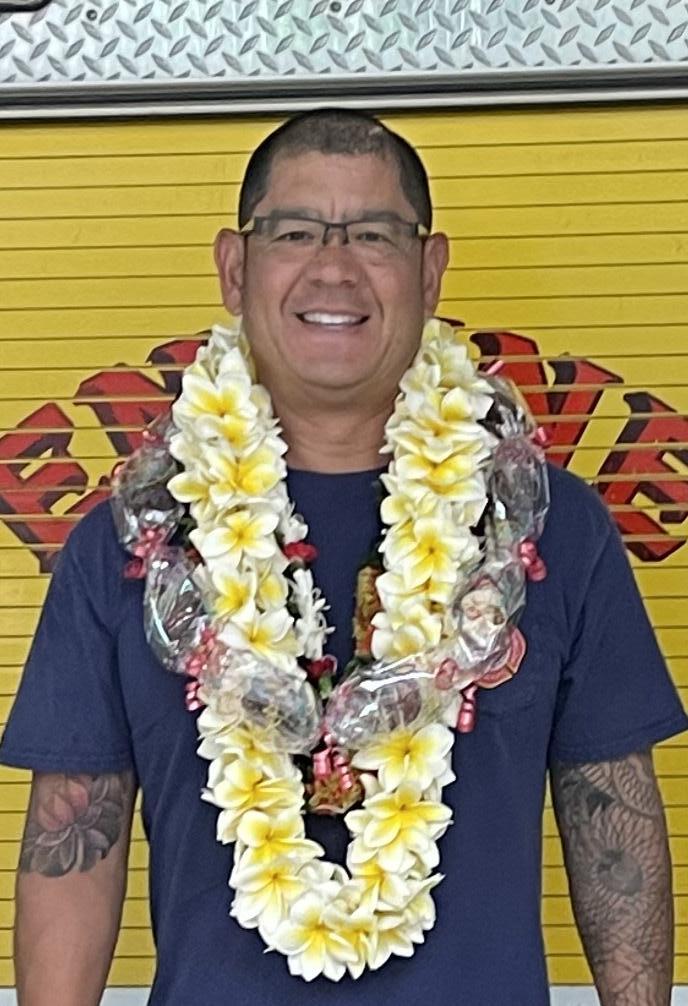

When asked what he enjoys most about the game, Jay points to its accessibility: “You can play on your first day. You can’t do that with tennis.”
Jay carries a deep sense of responsibility to Maui. When asked to do media, he steps out of his comfort zone—not because he enjoys the spotlight, but because he believes it’s important to keep the memory alive and ensure continued support for those affected.
“I had the opportunity to bring awareness,” he says.
That deep sense of service—to protect and honor the stories of others—is rooted in a lifetime of public safety. And that’s what keeps him speaking up. For Jay, it’s not about reliving the past. It’s about making sure it’s never forgotten.
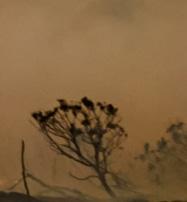

“My hope was to get the message out so it’s never forgotten. If it can happen here, it can happen anywhere. It’s about learning from it and helping us move forward.”

For Kaia Kala, the healing didn’t begin right away. It couldn’t. She had just lost everything.
On August 8, 2023, Kaia had just finished her shift at the Hilton Grand Vacations in Kaanapali and was heading home to Lahaina. But traffic was backed up, and she saw thick black smoke as the backdrop to Lahaina. When she reached the split at Front Street, someone was waving her to turn around—Front Street was already closed.
She turned around and headed to Kahana, where she ended up staying with a friend for the next two nights.
“I left for work and my house was full of belongings,” she said. “And when I left work, I had nothing.”
Nothing but what was in her car: her sun hat, a swimsuit, her snorkeling mask—and two pickleball paddles. “I took a picture. I said, ‘This is all I own.’”
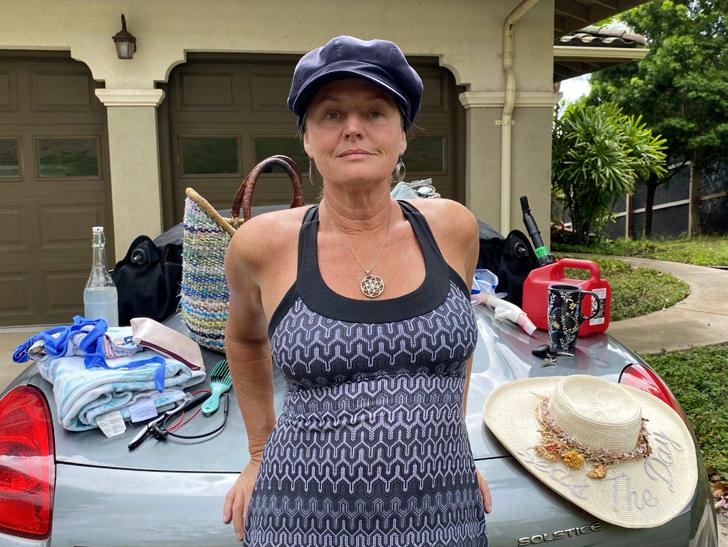
“PTSD is no match for pickleball. You can quote me on that.”
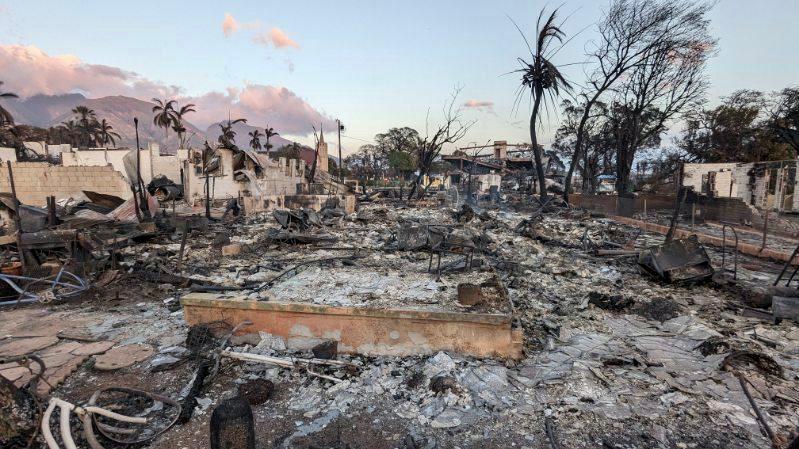
There were things she saw that day that she doesn’t speak of.
“By the time I got from Wailuku to Makawao, I had developed a stutter”
For the next few months, the grief was all-consuming. “I cried every day for the first three months,” she said. “Then every other day. It came in waves.”
Buying paddles on Amazon for her October 28th birthday was a turning point. It took another month before she actually made it to the courts. “I was still stuttering. Still crying a little uncontrollably,” she said. “But I knew I had to start doing something.”
She started playing again, and movement quickly became medicine. Drills with Maui coach Laurie Loney helped her improve fast. “I started to feel a sense of accomplishment again,” Kaia said. “Like I could actually get better at something. Like maybe joy was possible after all.”
The transformation touched every part of her life. “I went from being withdrawn and quiet to cracking jokes again,” she said. “People invited me to more courts just because I made them laugh.”
Even keeping score felt like progress. “Pickleball brought things back online—physically, emotionally, mentally. I felt capable again”
Kaia was moved by how easy it is for anyone to feel included—regardless of skill or age. Beginners help each other out, experienced players offer coaching, and the community spans generations. “Pickleball helped me come out of my shell. Everyone was so friendly, so kind, so understanding”
When asked what she’d say to someone going through trauma, she said about pickleball:
“There’s nothing else quite like it,” she said. “You can be the average person and still feel like a winner”
The people who complain about pickleball, she joked, just haven’t played it yet. “Maybe they’d stop being so unhappy if they just picked up a paddle”
When Kaia lost everything, including her voice, she didn’t know if joy would ever return. But with a paddle in hand, it snuck back into her life.
Turns out, PTSD didn’t stand a chance.


“October was my birthday. So I bought myself a new set of pickleball paddles.”
For Maui homegrown brothers Codie and Rockie Chong, pickleball isn’t just a pastime—it’s a path back to each other. After years of busy schedules and separate lives, the sport gave them a reason to reconnect.
Codie left Maui for college, attending the University of Hawaii at Manoa. After graduation, he taught school for a few years, but later returned home and is now a police officer with the Maui Police Department.
As a first responder, Codie saw firsthand how fragile life could be on August 8, 2023. “You don’t take things for granted anymore,” he said. “Life is finite. Limited. And that plays out on the court, too. You make the most of every moment.”
He and his wife first discovered pickleball in 2021 at a now-closed sport court that hosted socially distanced games. It was fun, easy to pick up, and gave them a way to stay active and spend time together. They even entered a few tournaments—but once they bought a home and had their first child, life took over and the game fell to the side.
Then in 2024, Rockie called his brother and declared: “I’m ready for pickleball.”
Rockie had been hearing from friends about how good they were at it, and how it came naturally to them. So he figured, why not him too? Codie started training Rockie— and Rockie hasn’t stopped playing since.
These days, Rockie finds joy in bouncing from district to district, playing seven days a week at times—from Kihei to Lahaina to Upcountry. He’s started traveling for tournaments and even has his sights set on going pro. At the recent Maui Pukaball Tournament, the brothers took home gold together.
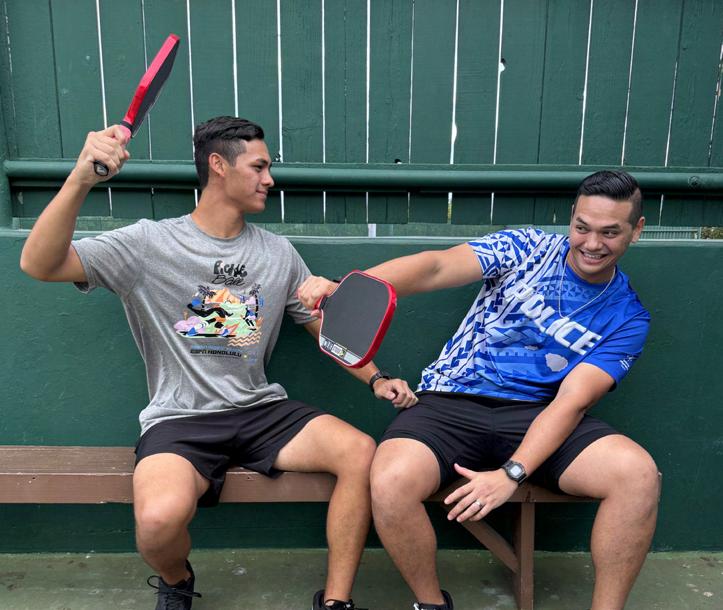
"You know, there’s the Johns Bros... and then there’s the Chong Bros.”
“Definitely one of my favorite memories is winning gold with him,” Codie said. “To see him go from not playing pickleball to winning a tournament in six months—it was awesome. Bringing it home together as brothers.”
Their sibling rivalry is alive and well. “I don’t want to admit it, but he’s better than me,” Codie laughed. “For now.”
The brothers are on the rise—and they’ve set their sights on becoming Hawaii’s top brotherly duo. The plan: play as many tournaments together as possible in the islands, while Rockie trains for a year or two before taking a shot at going pro on the mainland.
But beyond the medals and match points, the wildfires gave them a renewed sense of what matters most.
“It’s crazy how something so tragic and devastating can glue us together,” he added. “Not just immediate family, but extended family. The whole community.”
Codie said one of the biggest things he’s taken away from the fires is cherishing the smaller moments and learning to be more compassionate and forgiving toward others. “The margins that separate us are actually really small,” he said. “Everyone’s busy, but you never know what someone else is going through. So you treat people with respect—because they could be here today and gone tomorrow.”
And for Rockie, one of the most meaningful outcomes has been reconnecting with his brother (who is ten years his senior) after a few years apart. That personal reconnection mirrored something bigger.
“The community aspect is king now,” Codie said. “It’s brought so many people together, even from different parts of the island. It’s glued us together in a way that makes you stop taking things for granted. That’s why the pickleball community on Maui is so strong—it’s tight-knit. We travel all over the island, not just for great games, but to make great friends.”
The brothers agree: pickleball has been a gift.
“Having a positive place—an outlet—was huge,” said Codie. “Not just for us, but for a lot of people. Pickleball doesn’t care where you come from or what you’ve been through. You step onto the court, and you get to decompress, laugh, compete if you need to. That’s been a blessing. It’s been therapy—for me, and for so many people.”
For Codie and Rockie, pickleball rekindled their bond as brothers. For Maui, it became a bridge—linking neighbors, friends, and even strangers through rallies and sideline talk story.
What matters most isn’t the scoreboard. It’s connection. And the little moments in between.


“We cherish the smaller moments now…dinner with family, talking story, the little things—it all means more.”
-Codie
Maui built. Lahaina grown.
On August 8, 2023, Keneke Kukahiko was home—in the house he and his family had just settled into.
There was no school that day, and he was watching a movie with his 12-year-old son, Keiji. “We didn’t even realize the power was out because we had solar,” he said. “Then we saw our neighbor spraying their roof. I would have stayed, but the propane tanks were blowing up in the backyard. So I was like, well, we gotta go.”
They made it out, but when Keneke returned, everything was gone.
They lost it all in the fire—including a family heirloom: his grandfather’s ukulele, with handwritten notes still tucked inside. “That one hurt,” Keneke said. “He had just passed, and he gave it to me. I didn’t grab it. I thought we were coming back.”
After evacuating, the family relocated to a hotel in Kahana. It was there that someone gifted them a wooden paddle set. “We learned to play during COVID, but we really picked it up after the fire,” he said. “We had nothing to do. Playing at the hotel gave us something to do.”
Now living in Kula, Keiji commutes to school in Lahaina every weekday.
The alarm rings at 4 a.m., and the days are long. “By the time we get home, he’s always sleeping. He’s tired,” Keneke said. “But I try to get him to the courts. I want us to keep playing.”
What started as a way to pass the time quickly became a lifeline.
“We had something to go to every day—we could play, let out some stress, and argue because we’re so competitive”, said Keneke.
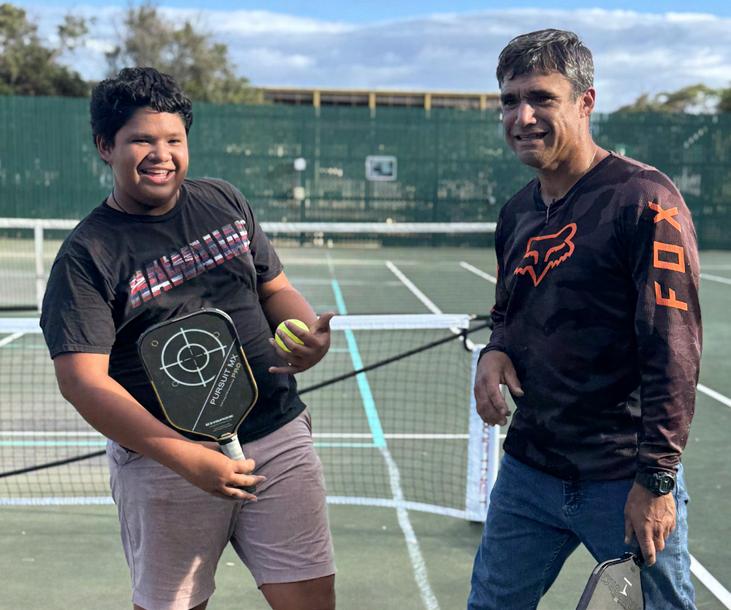
“I guess for us, we lost everything. We still feel it. It’s gonna take time, I think, for us. I cried already. I did my crying. But still, when I go fishing and I see the town from the ocean… my heart gets ripped out. I get blown away and I lose it again. But through pickleball, we can heal. We can heal ourselves. We will heal ourselves.”
Keneke played multiple sports growing up—football, basketball, baseball. But while his father coached him and they used to “butt heads” all the time, he didn’t want that same tension with Keiji. Pickleball just worked. It freed both father and son from falling into the old coach-player dynamic.
Now, they play together and push each other to improve. Keiji, at just 12, only plays with adults, and holds his own. “He’s got a better DUPR than I do,” Keneke laughed.
That competitive drive runs deep in both of them.
“We didn’t want to just be the guys playing on the side. We wanted to compete,” he said. “It’s got to be a daily
thing. That’s just in us—the athletic part, I guess. We can’t settle for just being okay.” With the way Keiji competes among adults, it’s not hard to imagine a future where he’s playing at the collegiate level.
For now, they’re just enjoying the ride—on the days Keiji isn’t completely wiped out from that 4 a.m. alarm and a full day of school.
Still, there are times when the memories come flooding back.
For Keneke, that daily grind is its own kind of therapy. “We're still struggling—we’re not back in our home yet. But pickleball gave me a solid base—something to always look forward to, something to fall back on when we were just feeling down.”
And part of that healing is the energy that comes from the people around him.
“They give you some good energy on the court. You take that home—you take that home as a high. After we beat each other up on the court, we all go home to our families. And the next day, you want that good feeling, that good energy again.”
So you type into the group chat:
‘Who’s playing today?’” HPM

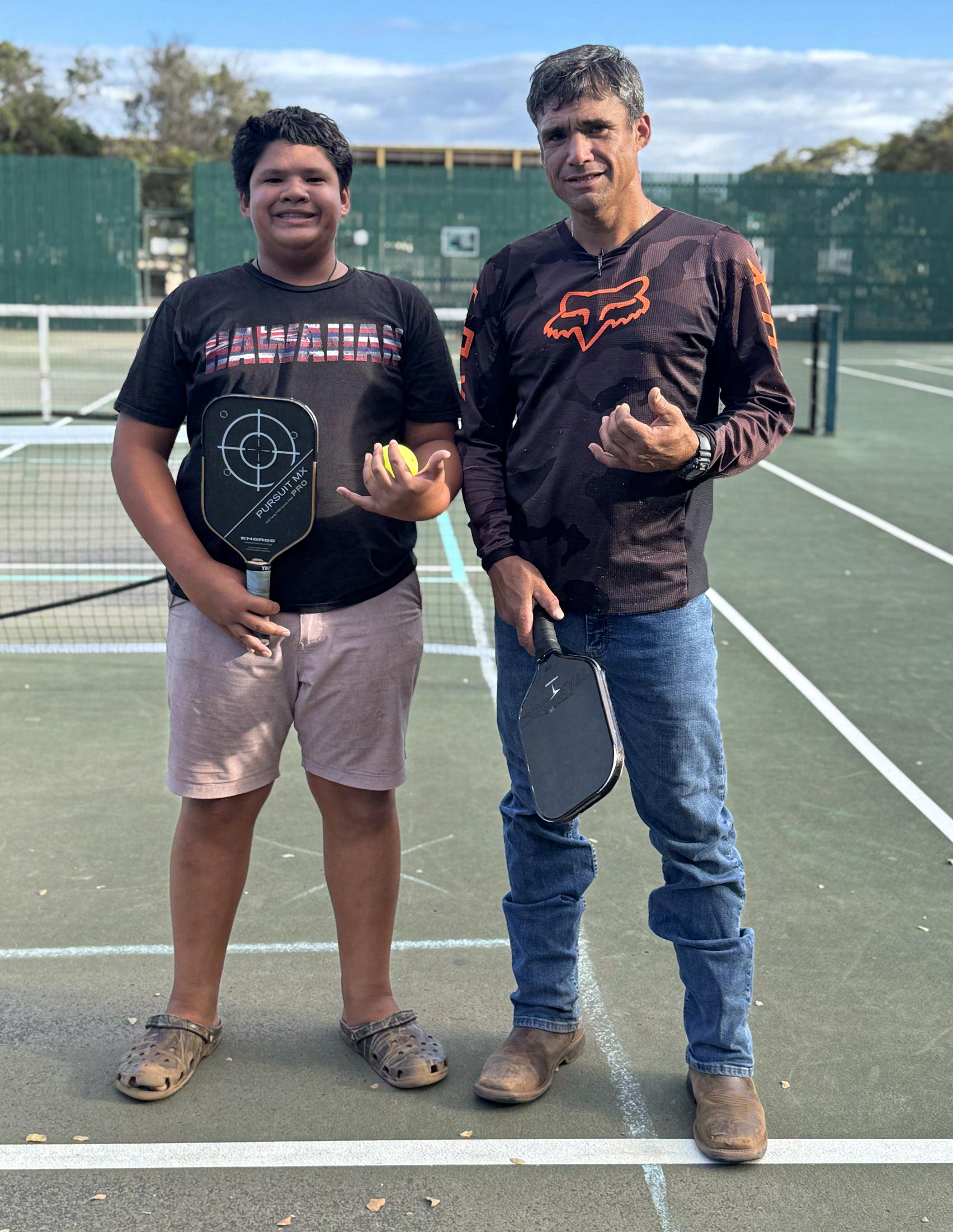
“Pickleball saved our lives.”

Backhand shots can make or break your game—but which one is right for you? Coach Kyle Paredes breaks down three different types of backhands and offers simple advice to help you choose the style that plays to your strengths. If you’ve ever wondered why your backhand feels awkward—or how to make it a weapon—this tip is for you. And just like our last two videos, stick around until the end for a fun bonus clip.

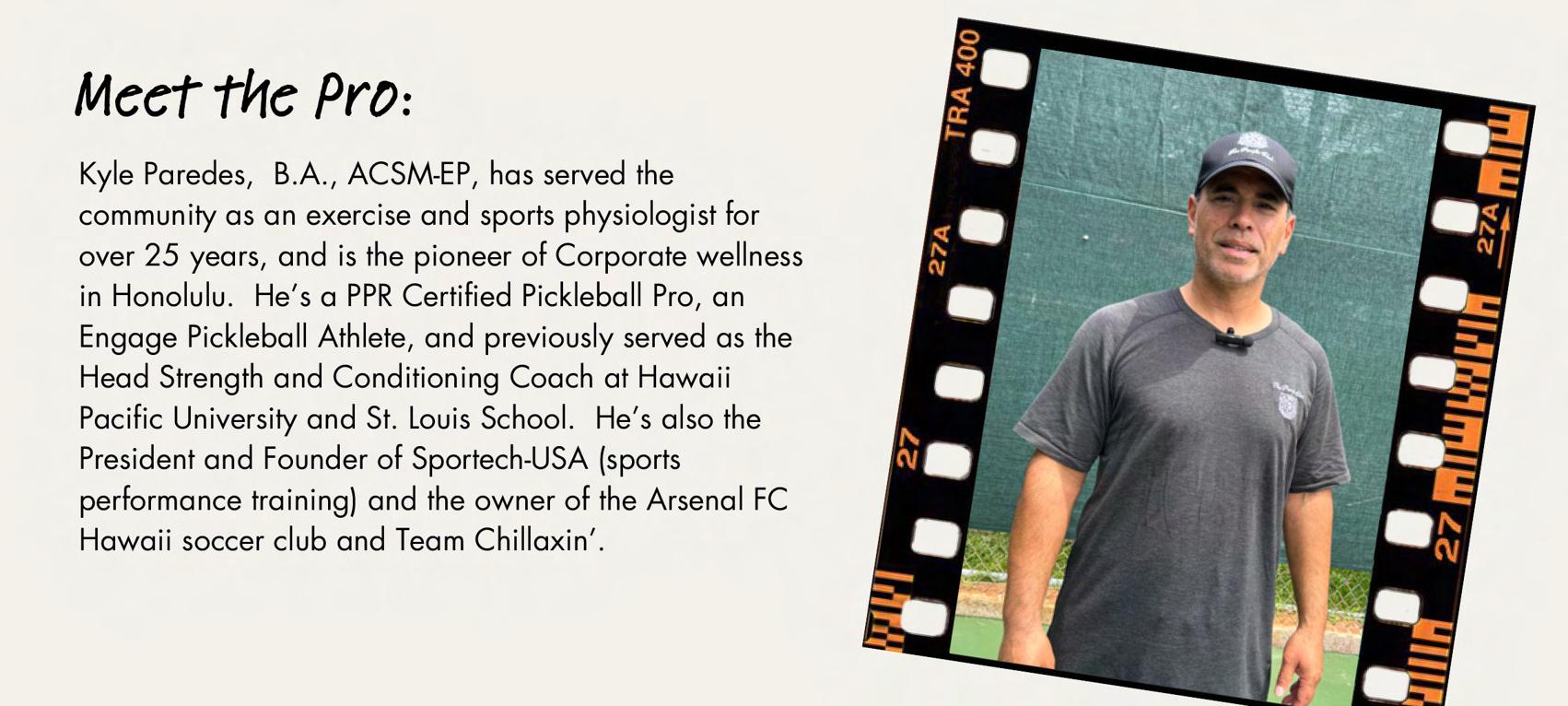

I reffed the Hawaii Senior Games in 2018. (Four days with too little sleep. Bleary. Ugh.)
Got my L1 badge in 2022. By mid-2023 I'd reffed 400 games in rec play and tournaments from Mililani to Kailua. Earned my L2 ranking in September 2023.
Check out Tracey’s spotlight feature HERE.
Q: During rec play the ball bounced near the sideline and Fred said, “I think it was out.” But he hit the ball, and the rally continued. Did Fred make a line call?
A: In a wishy-washy way, yes. What does the Rulebook say?
3.A.19. Line Call – A loud word(s) spoken by a player or line judge(s) and/or a hand signal to indicate to the referee and/or players that a live ball has not landed in the required court space.
All the players heard Fred. He didn’t whisper. So his call should have created a dead ball and no further play. You could have asked Fred’s partner, “Jo, did YOU see if the ball was out?” Jo might have said,
1. “I didn’t see it,” so the call stands.
2. “I’m not sure,” so the call stands.
3. “I thought it was in,” creating doubt about Fred's call, so 6.C Code of Ethics for Line Calling applies. It says, in part, “…[A]ll questionable calls must be resolved in favor of the opponent.”
If either Fred or Jo asked your opinion, it’s a whole ’nother ball of wax:
6.C.5. A player/team may ask the opponent’s opinion to make the line call on the player’s end of the court. If requested and the opponent makes a clear “in” or “out” call, it must be accepted. If the opponents cannot
make a clear “in” or “out” call, then the ball is ruled as being “in” on the receiving team. The moment the receiving player/team asks for the opponent's opinion, they lose their right to make any subsequent "in" or "out" call for that rally. The receiving team/player may also appeal to the referee to make a clear call. If the referee cannot make a clear call, the outcome of the opponent’s ruling will stand.
By the way, a replay is never an option. HPM
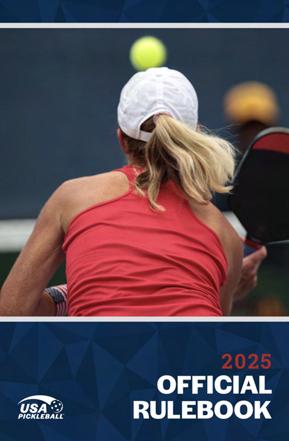
DON’T LET YOUR SHOULDER SIDELINE YOU: 3 KEY TIPS FROM A PT

One arm cable row to increase shoulder and core strength
Rotator cuff injuries account for more than half of all shoulder complaints in adults with reported shoulder pain. Injuries are multifactorial in nature: trauma, wear and tear, overuse, and age-related tendon atrophy. For throwing/swinging athletes, it is imperative to have a balanced strength and mobility routine to maximize shoulder health.
Here are my TOP 3 TIPS to improve performance and minimize injury risk:
1. Improve your thoracic spine (mid to upper back) flexibility
The thoracic spine is naturally rounded forward (slouched) and often gets worse with aging due to poor postural habits and the effects of gravity.
On training days, spend a few minutes stretching the thoracic spine over a foam roller into a slightly arched (extended) position. The extended position of the thoracic spine is necessary for full overhead shoulder range of motion. Improved thoracic mobility will help your reach on overhead shots!
2. During resistance training, focus on ribcage and shoulder blade range of motion
Your ribcage flexibility has a direct effect on how well your shoulder blade (scapula) can move. A stiff ribcage will limit shoulder blade motion and drastically increase the strain on the rotator cuff.
When exercising, include unilateral push/pull drills and allow your ribcage to rotate/bend. Performing these exercises with moderate resistance will increase the strength of your abdominal muscles and create more power and speed on your serves!
3. Load your shoulder appropriately to minimize muscle atrophy
Make sure to use a cable machine or free weights to provide appropriate strength training to the shoulder complex. For competitive and recreational athletes, a theraband is not enough load and creates an abnormal resistance profile!
In muscle (EMG) studies, the rotator cuff shows significant activity when the arm is raised overhead. Meaning, this is how you should train this muscle group! Vertical pushing and pulling exercises (ie. shoulder press and lat pulldown) are fantastic exercises to improve rotator cuff strength and resilience. Improved strength and resilience equals more time for pickleball! HPM
Questions? Reach out to Dr. Dan to keep your game strong and injury-free—so you can spend more time on the court.
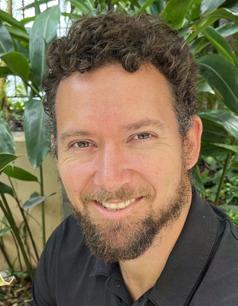
With Ekaterina Biakina
Based in Honolulu, Kata Biakina is making quiet moves and big statements on the pro pickleball tour. Seeded 14th at the 2024 PPA Hyundai Masters, she made headlines by defeating former tennis star Genie Bouchard in straight games, 11–1, 11–7.
With a DUPR rating of 5.227 and over 20 pro events under her belt, Kata’s ranked inside the top 50 in women’s singles and continues to rise.
We caught up with Kata between tournaments to see what she carries on (and off) the court.





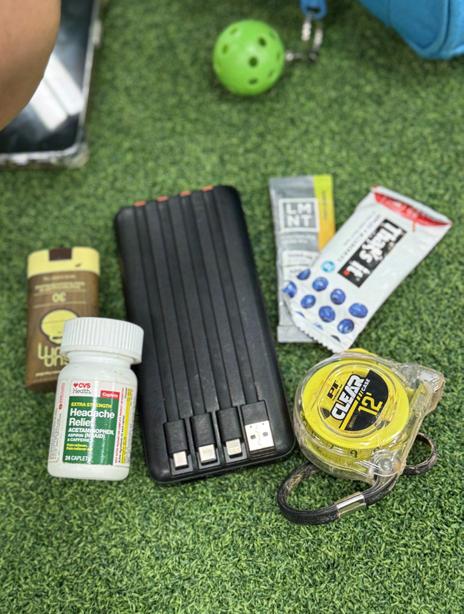
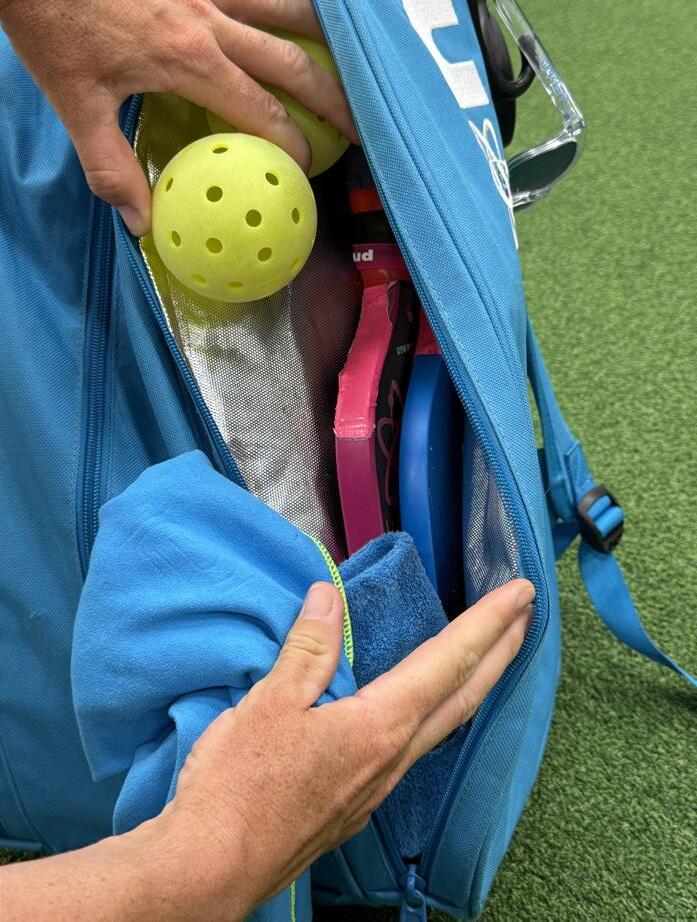

Q: What brand is your pickleball bag, and what do you like about it?
My pickleball bag is Proton, and I have it because I play with the Proton paddle. And I like the color. They have this bag in different colors, but I think blue kind of fits me best. It’s simple but pretty.
Q: What shoes do you play with?
I play with HEAD shoes. They started making a separate line for pickleball, so I’ve been trying out different shoes of theirs, and all of them fit. I move a lot, so not all shoes fit me. Some other brands really destroyed my feet. So I had to choose something that is soft enough, but hard enough to withstand.
Q: What do you like about the Proton paddle?
I like that they have a lot of power. And I like the shape. It’s a little bit on the harder side—some paddles feel a little softer.
I play with the Flamingo now, but before that, I played with the Series One.
This paddle doesn’t fail—if you go to a tournament for testing, you know that you will pass. You know that you will play with the same equipment and material that you’ve trained with, and for me, that is really, really important.
Passing paddle deflection tests at tournaments is critical for pros like Kata. Some paddles change over time and can fail under scrutiny.
Of course, if you get a lot of paddles from your company and you have the luxury of always playing with a new one, it probably won’t bother you as much. But I have been in situations where I’ve been at a tournament—and back then I played just with the Series Three (not the Flamingo version) and I had no more paddles. I had to completely find some other (paddle). It was very stressful.
For recreational players, this might never be an issue. But for Kata, who trains and competes, this is a major concern. That experience helped solidify her loyalty to more consistent models like the Series One and now the Flamingo.
Q: What snacks or drinks do you keep in your bag?
I have Liquid I.V. And balls, a towel, and water.
I have a separate towel for my paddles and a separate towel for myself, because I clean the face and the overgrip. Painkillers, emergency stuff like shoelaces— just in case. These shoes never betrayed me, but you never know. Another headband, a rubber band, things like that. Anything can happen and you want to be prepared.
Q: Any quirky or sentimental items in your bag?
I like to carry little things from different tournaments. Like this little pin from Six Zero. It can be something that I hang on the bag—it’s all from tournaments.
My bag also has a lot of stickers on it. It makes it feel more personalized, like it’s been part of my journey. If I changed the bag, I would probably put all these little things on that bag.
It’s not about the bag—it’s about the little things.
Q: What’s the one item you can’t live without on the pickleball court?
Well, I guess it’s the paddle that I play with. If anybody wants to really throw me off, they’d have to steal my paddle—the exact one
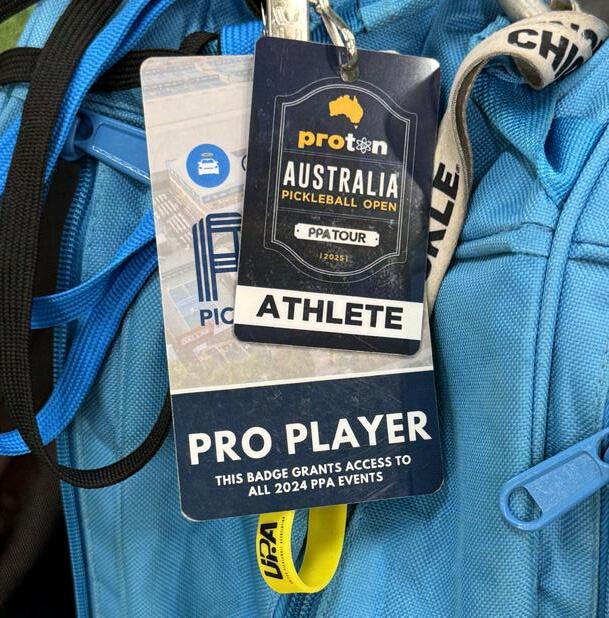

Serves 2-3 | Ready in 20 minutes (using pre-cooked rice)
Tofu, then brown rice… and something called larb? I know— it sounds weird and potentially pretty awful. It would almost certainly get an automatic “hard pass” from my kids. But hear me out. Larb is a classic dish in Thai cuisine, and you’ve probably had a version of it before—maybe at PF Chang’s or CPK—the crumbly, savory filling served in lettuce cups? That’s larb. This version just swaps in tofu for the meat. Traditionally made with minced pork or chicken, this version uses crumbled tofu for the protein, brown rice for substance, and the whole thing comes together in just 20 minutes if you’ve got pre-cooked rice on hand (no shame—I use it too since my family doesn’t do brown rice).
It’s fresh, fast, and definitely not bland.
A total W.
For the tofu:
■ 7oz firm (or extra firm) tofu, drained and pressed, and then crumbled (about 1/2 a typical block)
■ 1 tbsp neutral oil (e.g., avocado or light olive oil)
■ 1/2 tbsp light soy sauce
For the dressing:
■ 2 tbsp lime juice
■ 1 tbsp light soy sauce
■ 1 tbsp fish sauce
■ 1 tbsp neutral oil
■ 1 tsp maple syrup
■ 1 garlic clove, minced
■ ½ tsp crushed red pepper flakes
Remaining salad ingredients:
■ 1 cup cooked brown rice
■ ½ cup carrot, finely sliced or shredded
■ ½ cup cucumber, finely sliced
■ 2 green onions (scallions), thinly sliced (green parts only)
■ Small handful of fresh mint, finely chopped
■ Small handful of cilantro, finely chopped
■ 2 tbsp Thai basil, finely chopped (optional)
■ 1 head of butter lettuce or romaine hearts, leaves separated and washed
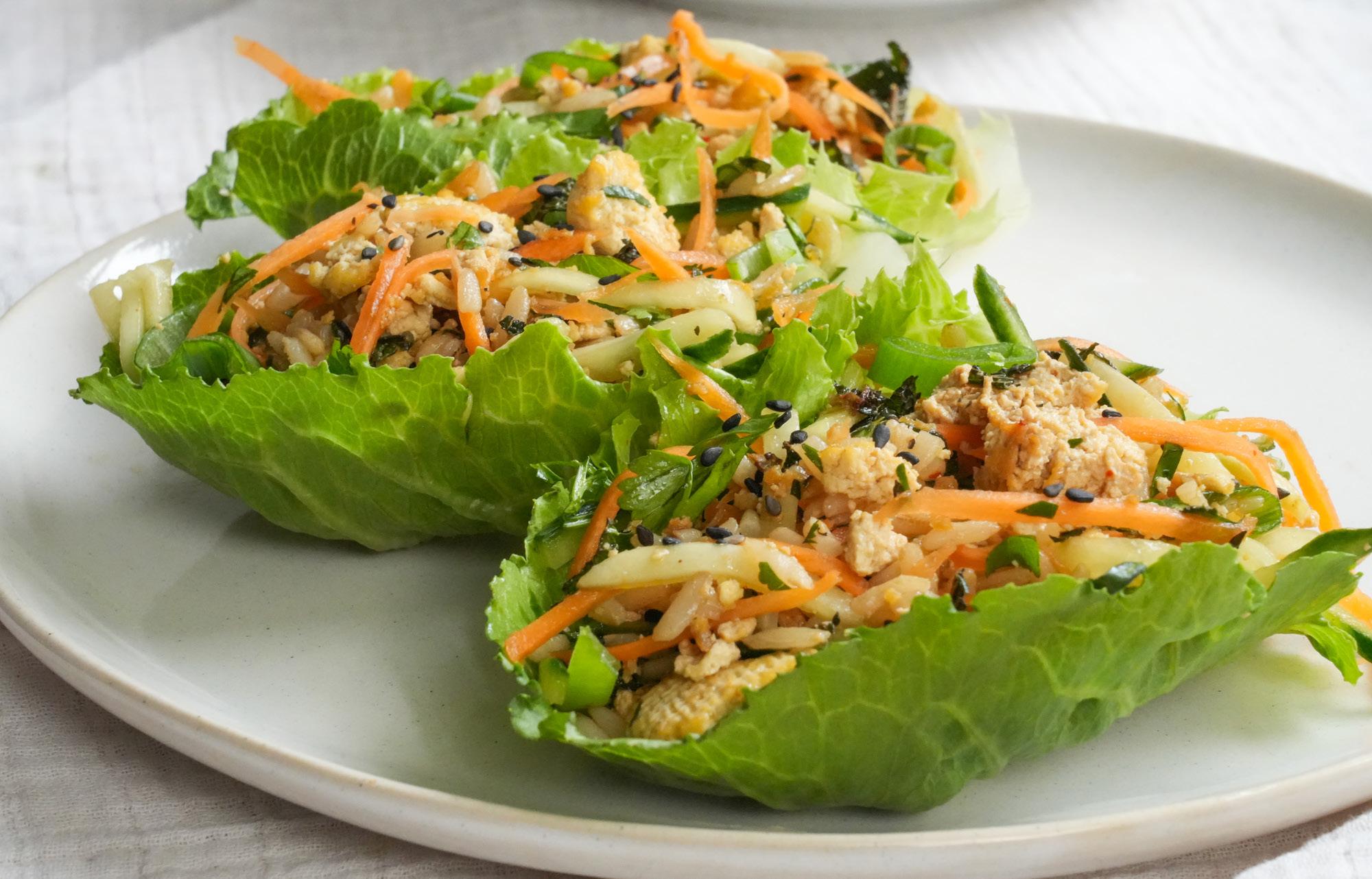
1. Cook the brown rice (if needed): If not using pre-cooked rice, cook according to package instructions and allow to cool.
2. Cook the tofu: Heat the oil in a pan over medium heat. Add the crumbled tofu and cook for 6-7 minutes, stirring frequently, until starting to brown. Add the soy sauce and cook for 1 more minute. Remove from the heat and set aside to cool.
3. Prep the salad ingredients: Slice the carrot, cucumber, green onions, and fresh herbs. Wash and separate the lettuce leaves.
4. Make the dressing: In a small bowl, whisk together lime juice, soy sauce, fish sauce, oil, maple syrup, garlic, and crushed red pepper flakes.
5. Assemble the salad: In a large bowl, combine the tofu, rice, carrot, cucumber, scallions, and herbs. Pour over the dressing and toss well to combine.
6. Serve: Spoon the mixture into lettuce leaves to create wraps/cups. Enjoy immediately!
Store the tofu and rice mixture in an airtight container in the fridge for up to 3 days. Assemble with lettuce leaves just before serving.
■ Before crumbling and cooking, be sure to drain and press your tofu for at least 10–15 minutes to remove excess moisture. This gives you a firmer texture and helps the tofu brown nicely in the pan.
■ Fast and fresh: Ready in 20 minutes
■ Big flavor, no meat
■ Herby, citrusy, satisfying
■ Packs protein, fiber, and flavor
■ Works warm or cold— hello leftovers! HPM


Bread and Butter Pickleball was founded in 2022 by Doug Sapusek with a simple mission: to bring more joy, creativity, and connection to the world of pickleball. Today, he runs the company alongside his two adult children, Devin and Aurora, forming a small but passionate family team.
From the beginning, BNB has focused on building something different: gear that performs at a professional level, but doesn’t take itself too seriously. Our lineup of paddles includes standouts like The Filth, The Shogun, The Invader, and The Wild Thang, each one designed to reflect the playful spirit we love about the game. We’re also known for doing things a little differently when it comes to marketing. We’ve launched paddles into space (yes, really), suited up in Bigfoot costumes, and leaned into themed photo shoots that celebrate the weird and wonderful world of pickleball. If it makes people
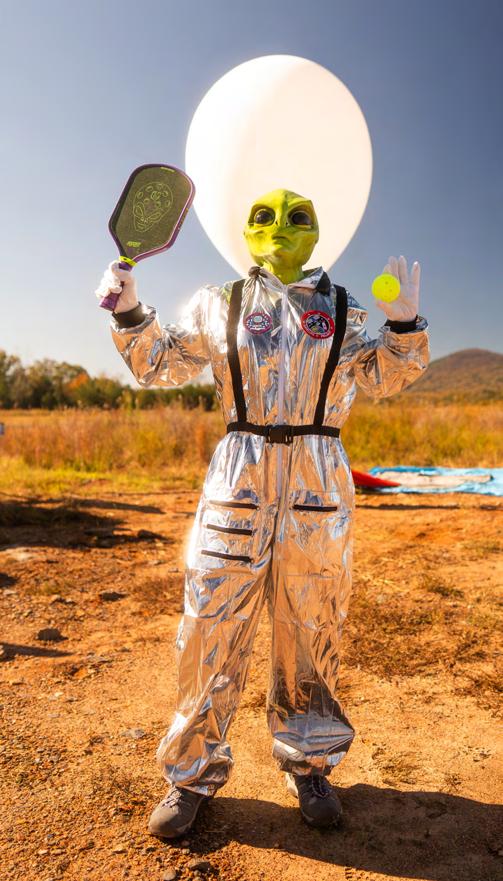
laugh, smile, or say “what on earth are they doing?” we’re probably doing it.
At our core, we’re about people. We believe pickleball is more than a sport; it’s a way to connect, to laugh, to move, and to belong. That’s why we’re so committed to cultivating a positive, welcoming customer experience and a brand that makes players of all levels feel seen and celebrated.
Bread and Butter is a small operation with a big heart. We’re proud to be part of this incredible community and to grow alongside it— one paddle and one ridiculous marketing campaign at a time.
— from the BNB Team

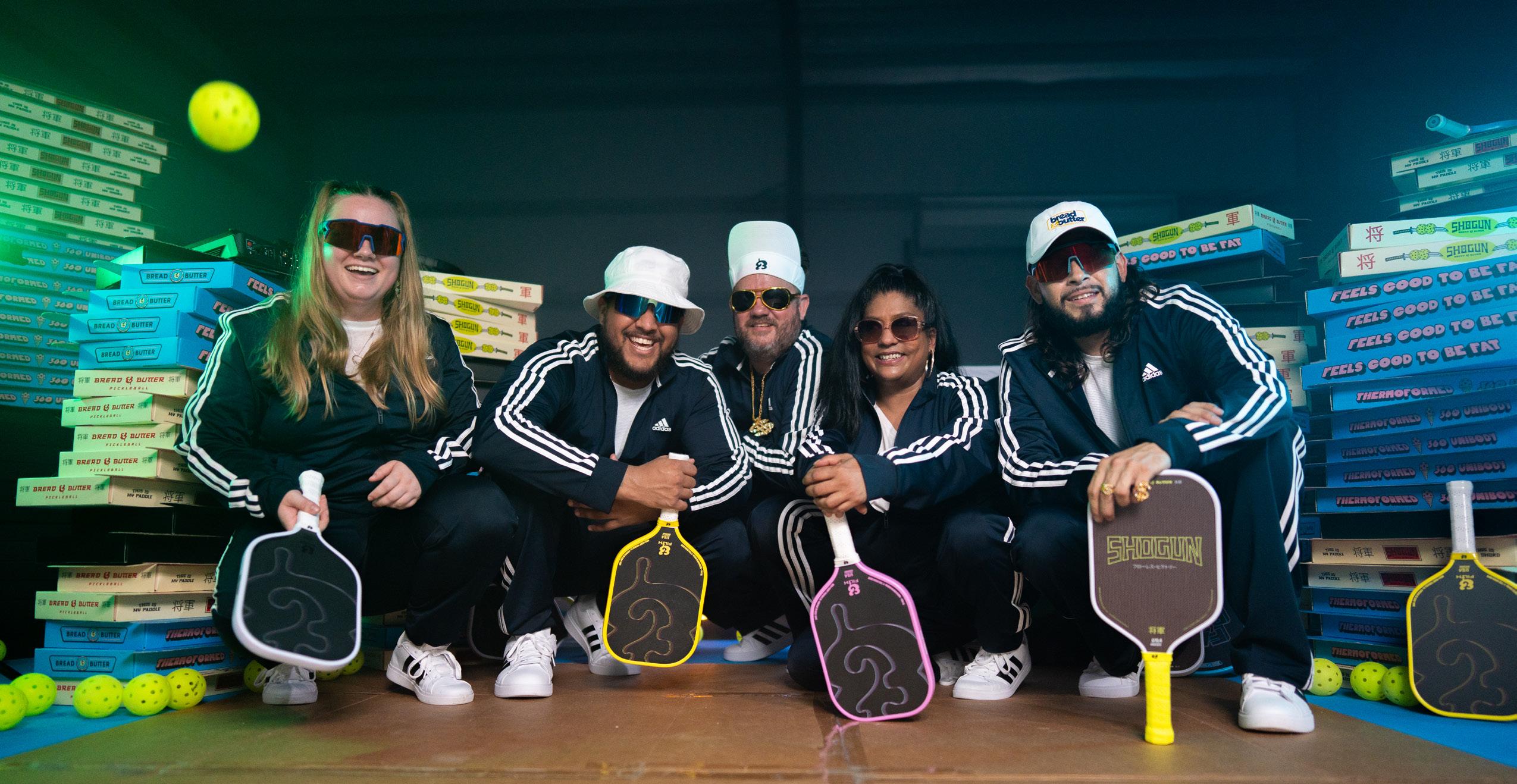



FROM ASHES TO THE COURT: MAUI PICKLEBALLERS REFLECT ON WHAT’S BEEN LOST—AND WHAT’S BEEN FOUND

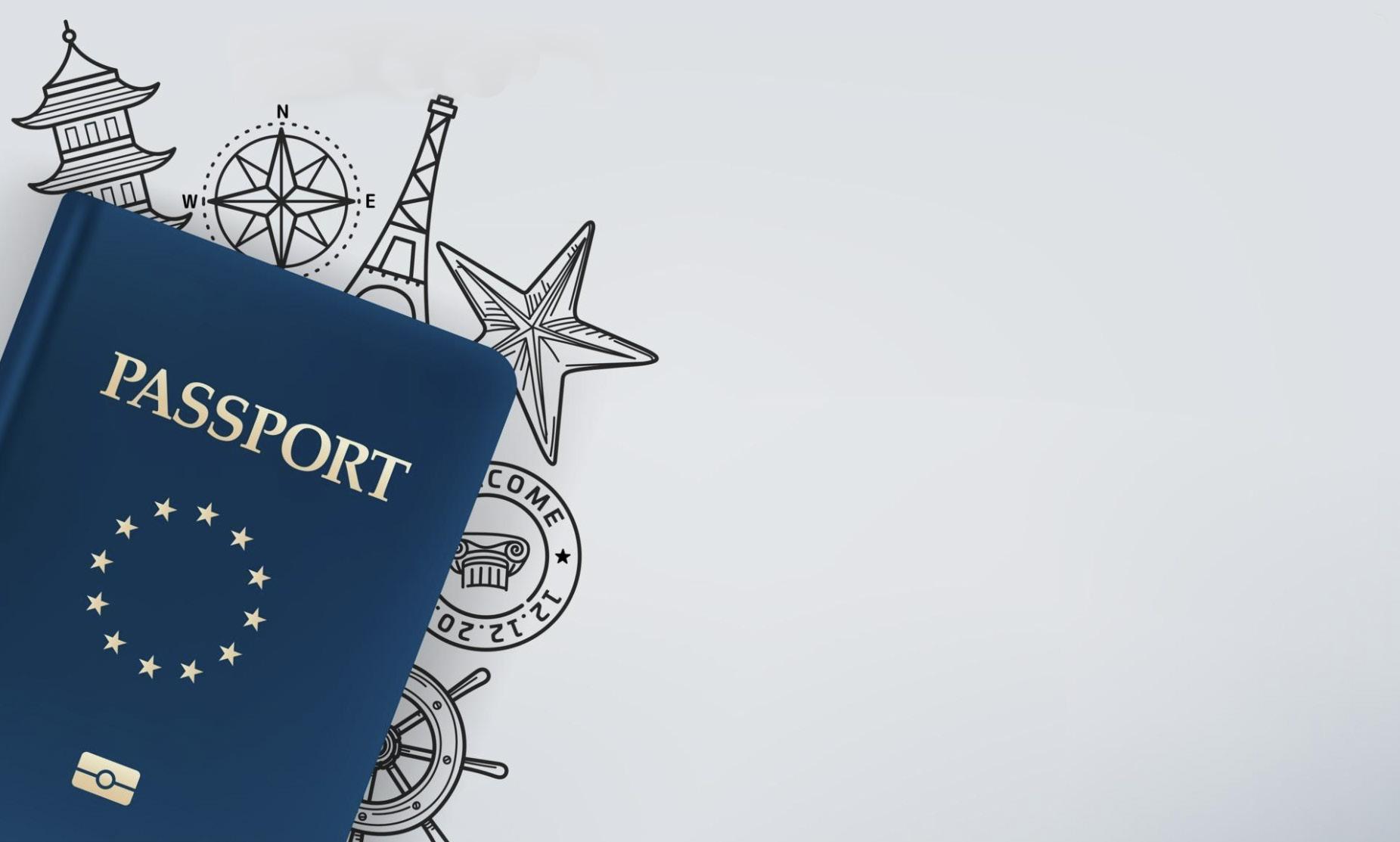
ABOUT PICKLEBALL PASSPORT: PICKLEBALL PASSPORT IS OUR WINDOW INTO THE GAME AROUND THE WORLD — SHORT SNAPSHOTS OF PLAYERS, COURTS, AND COMMUNITIES THAT REMIND US HOW ONE SPORT CONNECTS US ACROSS CULTURES.
From Tokyo to Hawaii, the game speaks the same language. Thanks to one of our ambassadors traveling in Tokyo, Toshiko Jager, we had the chance to connect with local players and hear their stories firsthand. Through these short interviews, we caught a glimpse of what the sport means in Japan. Here are two of those voices.

How did you discover pickleball?
妹がハワイ在住で、妹の住まい から帰国した母から勧められま した。母曰く、ピックルボール というものを始めて知り、実際 に体験してみたところ、あまり の面白さに、私もハマると思っ てさそったそうです。
My sister lives in Hawaii, and my mother, who came back from her home, recommended it to me. My mother said that when she first heard about pickleball and tried it, it was so much fun that she thought I would get hooked, so she invited me to play.
What do you love most about pickleball?
テニスやバドミントン、卓球と 言ったラケットスポーツとは違 う打った時の音で す。打った時 のパコーンという気持ちよい音 が癖になります。
The sound it makes when you hit the ball is different from other racket sports such as tennis, badminton, and table tennis. The pleasant sound of the ball hitting the ball is addictive.
What’s your favorite shot?
曲がるスライスサーブが好きで す。今では、サーブを打つ際ど れくらい曲がるのか、自分の限 界にチャレンジしています。
I like the curved slice serve. Now, I challenge myself to see how much I can curve the serve.
How often do you play?
Do you play regularly here? 週3-4回。実家に帰った際 は、父母が所属する「なごぴ」 や、ハワイに行った際は、「ピ ートリー」で色々な人とピック ルをしています。
3-4 times a week. When I go back to my hometown, I play pickleball with various people at “Nagopi”, where my parents play, and when
I go to Hawaii, I play pickleball at “Petrie”.
Have you played pickleball anywhere else in the world?
ハワイでプレーしたことがあり ます。毎年一回はハワイに行く のですが、観光とかするわけで もなく、滞在期間のほとんどを ピックルボールをプレーしてい ます。
I’ve played pickleball in Hawaii. I go to Hawaii once a year, but I don’t do any sightseeing, and I play pickleball most of the time I’m there.
If so, what’s different about pickleball in Japan?
プレースタイルがどう違うか? という場合: 大きく違うこと は、パワフルの差でしょうか。 私の見た事で一概にはそうとは 言えませんが、日本では相手が スマッシュを打とうとした時、 後ろにさがって取ろうとしま す。しかし海外の方は、キッチ ンで構えたまま、自分の所に飛 んできたスマッシュボールを強 気で返そうとします。しかも、 かなりご高齢の方がそれをして いてとてもびっくりしました。 海外では高齢の方が若い方と競 い合っている光景をよく見か け、とてもパワフルだなという 印象をもちました。
If you’re asking how the playing styles are different: I guess the biggest difference is the difference in power. I can’t say that in general, but in Japan, when an opponent player tries to hit a smash, we step back and try to hit it back. However, people overseas stay at the kitchen and try to aggressively return the smash. What’s more, I was very surprised to see that older people doing this. I often see older people competing with younger people overseas, and I was impressed by how powerful they are.
What paddle are you using today?
Honolulu Pickleball Company の パドルは、性能が良いのに、他 のパドルに比べリーズナブルな ので気に入ってます。又豊富な パドルがあり、自分のプレイス タイルに合ったパドルを選べる のも魅力です。
I like the Honolulu Pickleball Company paddles because they are reasonably priced compared to other paddles, even though they perform well. They also have a wide variety of paddles, so you can choose one that suits your playing style.
What advice would you give to someone playing for the first time?
きっかけは何でもいいです。変 な先入観なんかも持たず、とに かくパドルでボールを打ってみ てください。以外にもハマりま す。私自身も最初はピックルボ ール?何それ、面白いの?とは 思っていましたが、母に強制参 加させられてからは、ドはまり し、今では週に4回、仕事終わ りにピックルボールをするのが 日課になりました。やる気がな くても、一度でもピックルとい う単語を聞いたなら、それはピ ックルを始めるチャンスです。 是非やってみて下さい。
Whatever the reason, just try hitting the ball with a paddle without any strange preconceptions. You will be hooked. At first, I thought, “Pickleball? What is that? Is it fun?” But after my mother forced me to participate, I got hooked, and now I play pickleball four times a week after work. Even if you don’t feel like it, if you hear the word “pickle” even once, it’s a chance for you to start pickleball. Please give it a try.
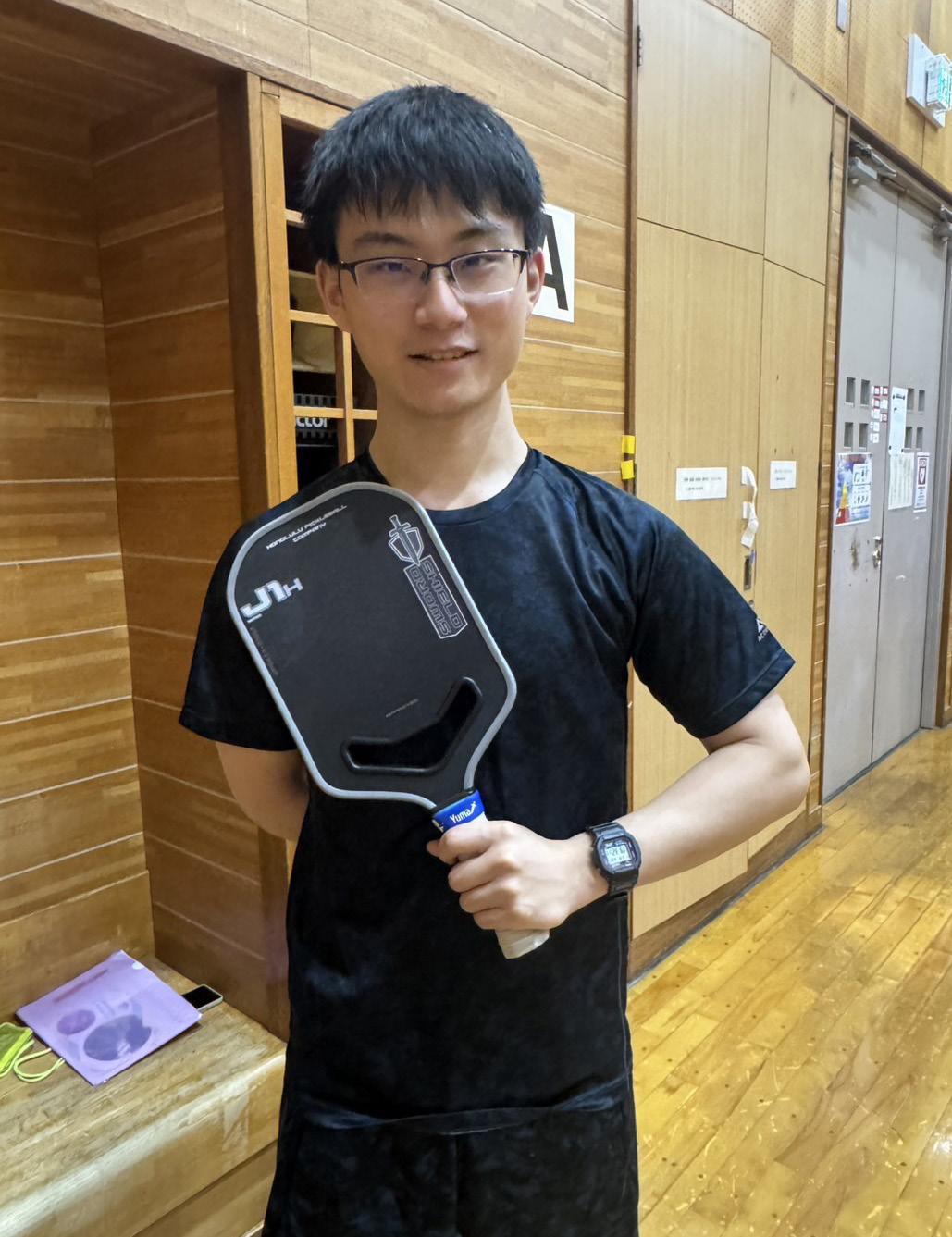

How did you discover pickleball?
5 年くらい前に、バドミントンのグ ループが初めて見るスポーツ(ピッ クルボール)をやっていて、興味を 持ちました。
About 5 years ago, I saw a badminton group playing a sport I’d never seen before (pickleball) and became interested in it.
What do you love most about pickleball?
誰とでもゲームができること
You can play games with anyone. What’s your favorite shot?
3rd shot and dinking
How often do you play? Do you play regularly here?
週2-3回。スギックルのみ
2-3 times a week. Only with Sugikkuru group.
Have you played pickleball anywhere else in the world?
無し
No.
What paddle are you using today?
CRBN 1X
What advice would you give to someone playing for the first time?
初めてでもボールを打つことは簡単 ですが、とても奥深いスポーツなの で、長くやる程楽しくなります。
It’s easy to hit the ball even for the first time, but pickleball is very deep with so much to learn, so the longer you play, the more fun it becomes. HPM

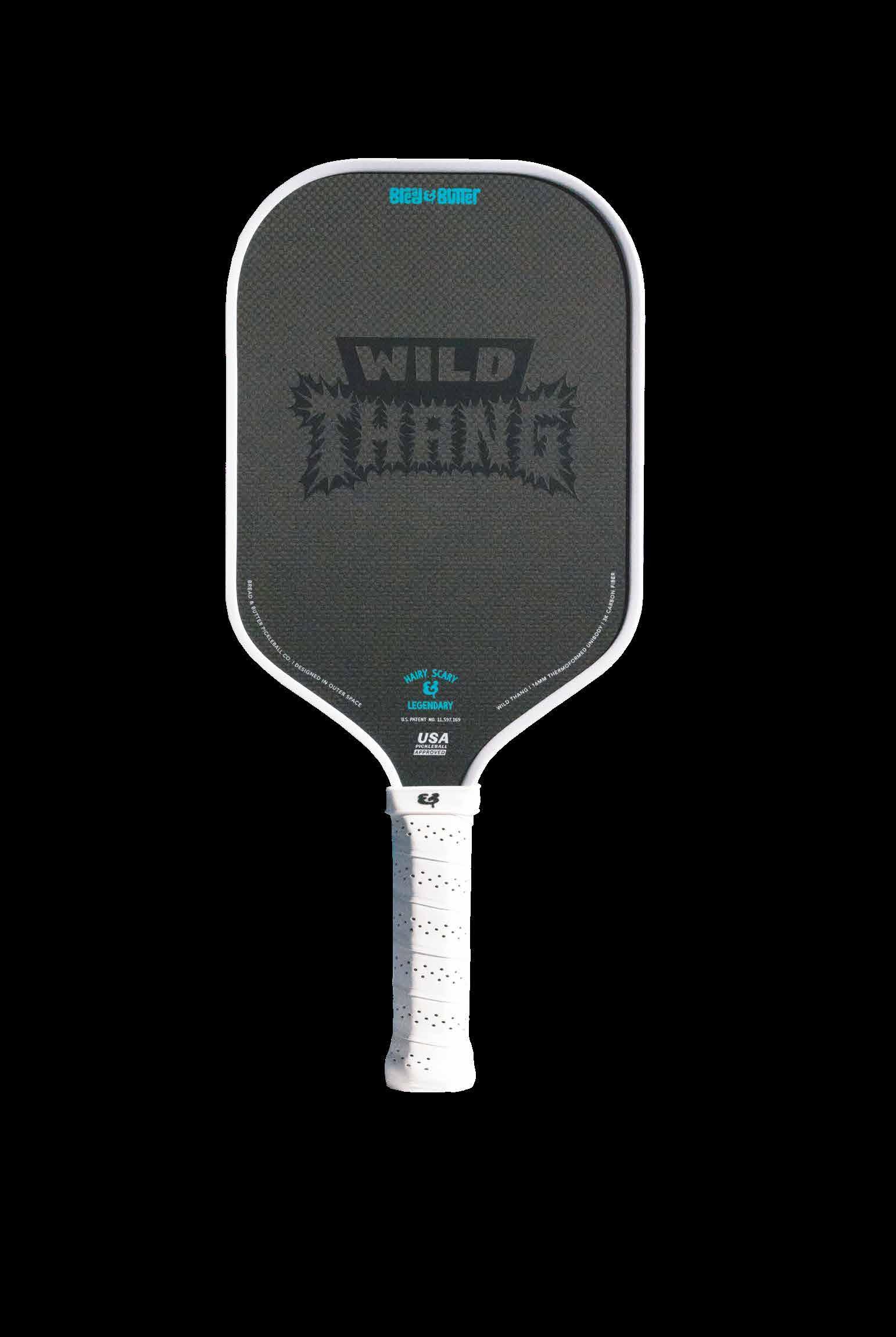



As pickleball celebrates its 60th anniversary and National Pickleball Day approaches on August 8, there’s no better time to revisit its birthplace: Bainbridge Island, Washington. With our own Hawaii Pickleball Magazine turning two on the same day, this timely reflection is a nod to how far the sport has come— and the surprising ways it continues to challenge perspectives and bring people together across cultures, courts, and communities.

A feature by Kerrie Houston Reightley
For die-hard pickleball fans, you may already know that Bainbridge Island, Washington, is the “birthplace” of pickleball. Bainbridge Island is a picturesque bedroom community of Seattle, WA, a 35-minute ferry ride away. It’s nestled between the Olympic mountain range to the west, the Cascade mountain range to the east, Mt. Rainier to the south, and Mt. Baker to the north.
Pickleball is celebrating its 60th Anniversary, and was invented on Bainbridge Island, in 1965, by then Washington State Representative Joel Pritchard, Bill Bell, and Barney McCallum. The original court has become a tourist destination. In 2019, Bainbridge Island began hosting an annual “Founders Tournament,” with play taking place at local tennis courts. By 2020, an outdoor “Founders Courts” complex opened, with six, pristine, outdoor courts. In 2022, then Governor Jay Inslee, declared pickleball the official sport of Washington state. This year’s tournament will be held August 13 – August 17, with up to 400 competitors, coming from as far away as Hawaii.
With all the excitement around the “fasting-growing sport” in the U.S., there is another side.
Just like players all over the world, there are those who just can’t get enough of pickleball! But, on the other end of the spectrum—are tennis players of the recreational and competitive United States Tennis Association, U.S.T.A, variety, like me—who have, dare I say?, had enough of pickleball players, claiming prime real estate as their own, and turning already established indoor and outdoor Pacific Northwest tennis courts, into pickleball courts.
But pickleball fans, don’t stop reading, yet.
To save the day, though, indoor pickleball facilities, complete with bars and restaurants, are popping up all over Seattle. And just 12 miles away from Bainbridge, is the new Poulsbo Pickleball Kingdom, PPK.
Having a nearby indoor pickleball facility is music to Bainbridge Island tennis players’ ears. Bainbridge Island Recreational Center, formerly a private tennis club, recently painted permanent pickleball lines on one of the four indoor tennis courts, fueling the fire of tennis players here, vowing to “NEVER cross over to the ‘dark side’ [of pickleball],” that we somewhat affectionately refer to, as “The cult.”
So, when I was invited as a guest, to a PPK soft opening, I felt like a modern-day Mata Hari, peering into the inner sanctum of pickleball.


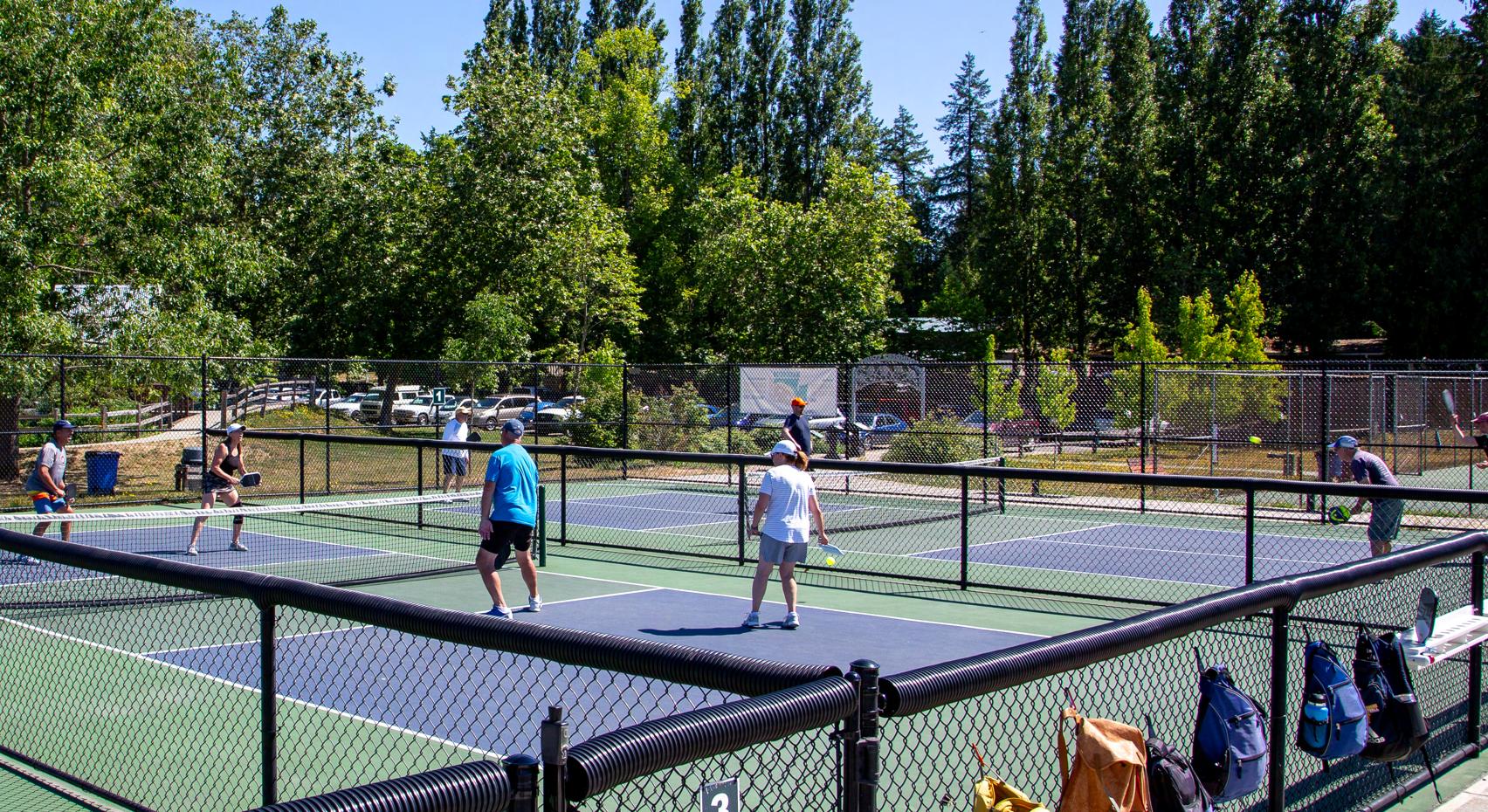
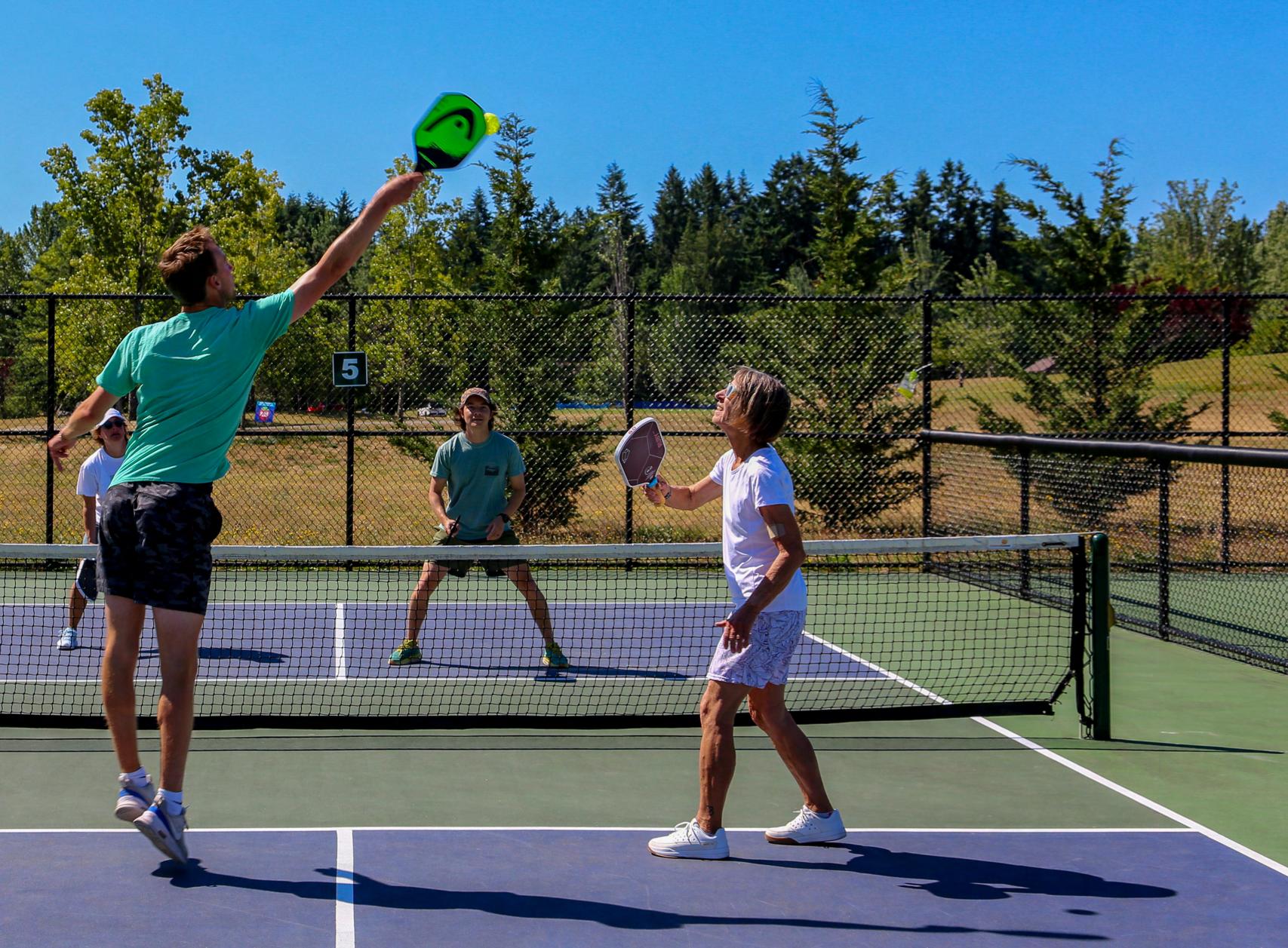
Surprisingly, I was impressed. When I entered PPK, I was taken aback by the Hollywood-esque lighting, showcasing 12, luxurious, climate controlled, a Blue Angels shade of dark-blue courts, with light, sky-blue “kitchens.” And a hand shake and a hug, by the decidedly TV-attractive staff. I felt genuinely welcomed, like I was in an episode of “The Love Boat” or “Fantasy Island.” Hmm. Can’t say I’ve ever been greeted that way at a tennis club.
Admittedly, I now have pickleball envy, about the state-of-the-art pickleball technology. Huge screens hung on every court, for scorekeeping, and an entertaining “Instant Replay” feature. The crown jewel, somewhat hidden on a back wall, is by PIQLZ, an “interactive pickleball wall experience for training, competing, and having fun.”
My main take away? Tennis is about hiding your feelings; pickleball is about literally laughing out loud, and you can even cry if you want to.
So, will I crossover to the dark side, and give up my U.S.T.A. rating that has fluctuated between 4.0 and 4.5 for decades, and apply for a Dynamic Universal Pickleball Rating (D.U.P.R.), and become a 2.5-rated pickleball player? And will I give up my leopard-print Dona Jo “Flirty” tennis skirts, and hot-pink Lucky in Love racer-back tops, for long-sleeved shirts, leggings, and a baseball cap? I don’t know.
What I do know, is that I’ve witnessed the dark side. And I liked it. HPM
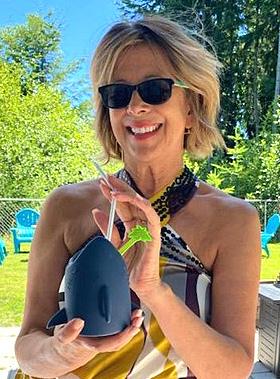
Kerrie Houston Reightley is a freelance writer. Her work has appeared nationally/internationally in The New York Times; Huffington Post; Oprah.com; The Guardian; and A.A.R.P. magazine. Regionally, she’s written for Seattle and Seattle Met magazines. She is a regular contributor to PNW Bainbridge magazine. Her work can be viewed at: www.Kerriehoustonreightley.com
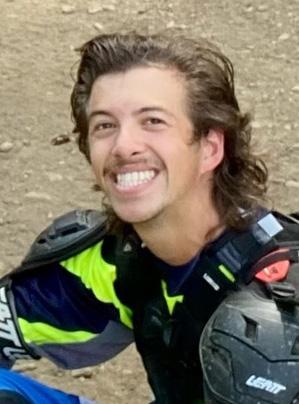
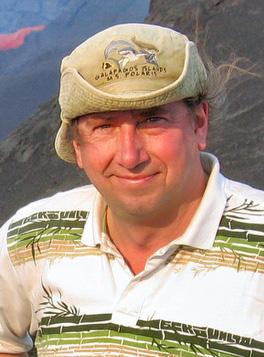
Tanner Reightley is a photojournalist, living on Bainbridge Island, WA. His work has appeared in PNW Bainbridge magazine. He’s currently pursuing a B.A. in Fine Arts, with an emphasis in photography, at Western Washington University. NOTE: Tanner took the photos of the Founder’s Courts on Bainbridge Island.
Starting in 1980 with Silver Halide Photography, Kelvin moved with the times and the advances of technology to branch out first into video production then computer animation followed by web design and finally back to his first love ... the still image… only this time harnessing the full power of the digital revolution to produce truly stunning imagery for his clients. Note: Kelvin took the photos of and from Bainbridge ferry.
Kelvin Hughes Productions Cell: 360.265.6796

MAUI PLAYERS VISIT PICKLEBALL’S BIRTHPLACE FOR THE FOUNDER’S TOURNAMENT


In a special trip this summer, members of the Aloha Pickleball ‘Ohana from Maui traveled to Bainbridge Island—the birthplace of pickleball—to celebrate the sport’s 60th anniversary. The group presented lei to Bainbridge Island Pickleball leadership and David McCallum, son of co-founder Barney McCallum, as a gesture of aloha and connection. They also had the chance to step onto “hallowed ground”—the original court where pickleball was first played. In a full-circle moment, Maui’s Nancy Beach reconnected with her former schoolmate David McCallum, sharing a game on the very court where they once played together in the 1970s! HPM
BELOW: Nancy Beach and David McCallum playing on the original court. Nancy and David went to school together in the 70's.
RIGHT: Aloha Pickleball on hallowed ground at "the original court" where it all started.


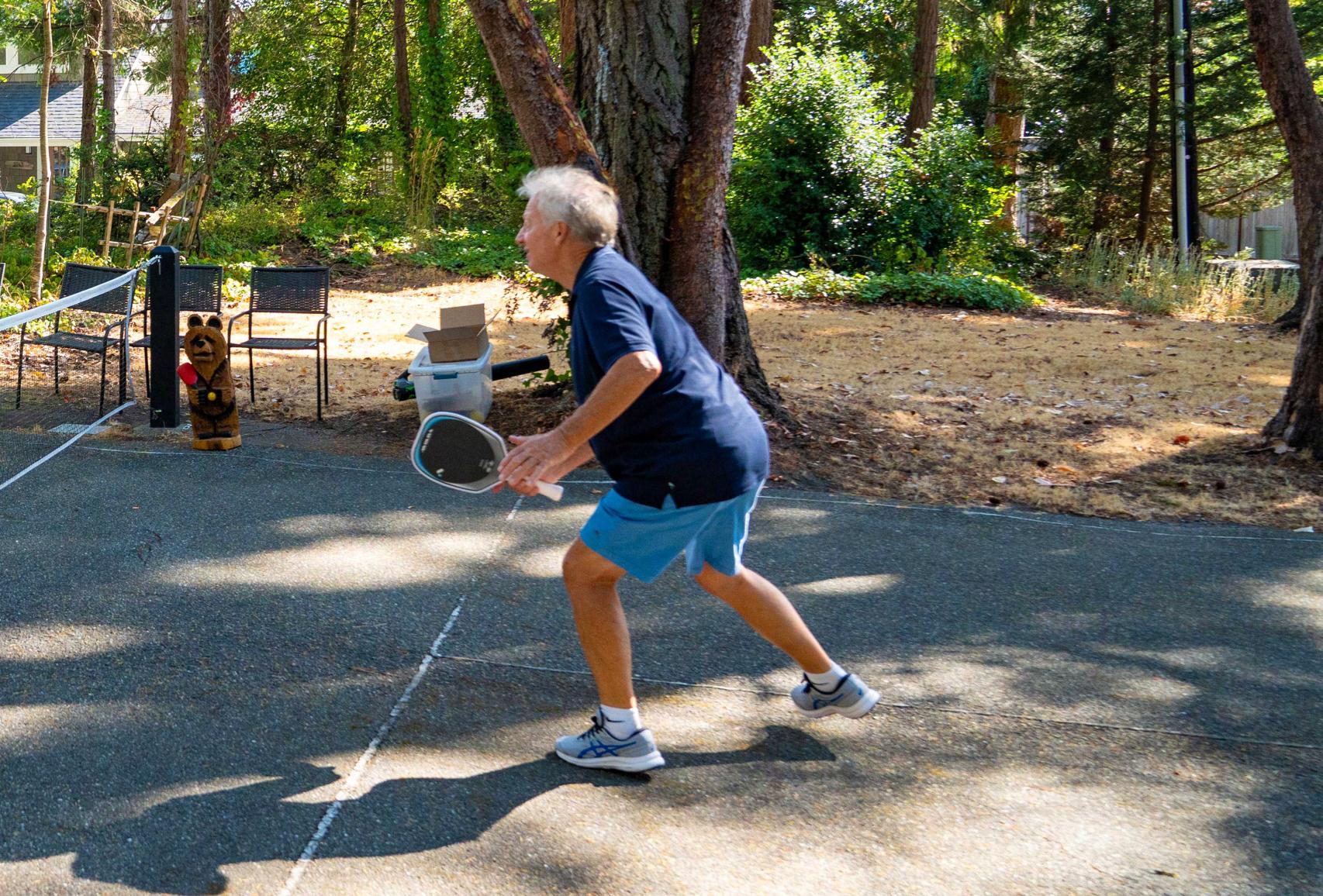
We had the best time celebrating our 2-Year Anniversary with the pickleball community — giveaways, games, and good vibes all around. Our sponsors helped make it possible, and they brought along some seriously cool products worth sharing. Think of this as our party favor to you: a round-up of Featured Picks we love and think you’ll love too.
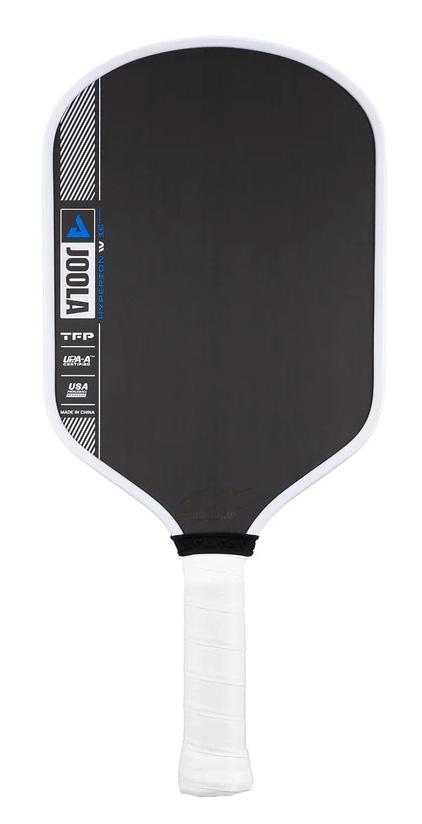
BEN JOHNS PERSEUS PRO IV 14MM PICKLEBALL PADDLE
The Perseus Pro IV 14mm packs precision and power into a sleek design — a go-to paddle for players chasing their next level.
https://joola.com/collections/proiv/products/joola-perseusiv-14mm-pickleball-paddle-1
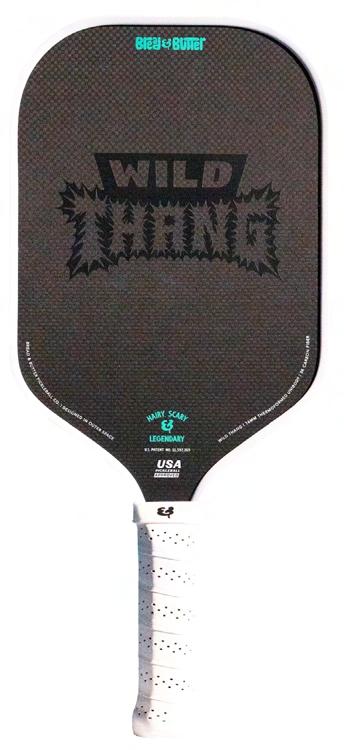
BREAD AND BUTTER PICKLEBALL “WILD THANG” PADDLE
Bold, playful, and performance-driven, the “Wild Thang” proves that gear can be both fun and fierce on the court.
https://www.bnbpickleball.com/ collections/wild-thang/ products/the-wild-thang-16mmpickleball-paddle
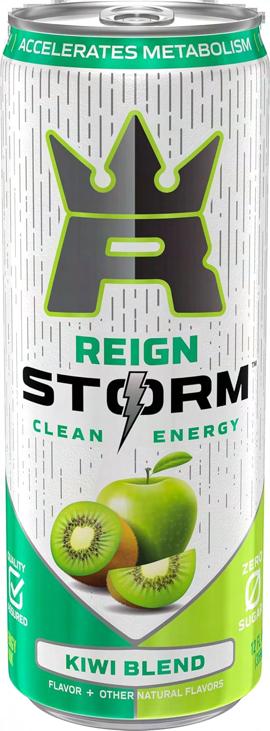
Light, refreshing, and packed with electrolytes, Reign Storm is the clean energy drink pickleballers reach for to stay powered through long days on the court (and at our Anniversary Celebration!). https://www.reignstorm.com/en-us/
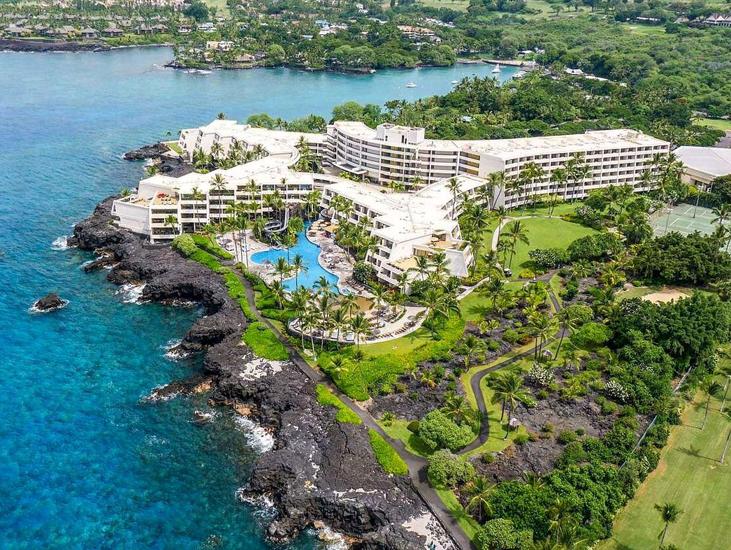
With breathtaking ocean views and signature Hawaiian hospitality, Outrigger Kona Resort & Spa is a must-visit — and this October, they’ll host a tourney you won’t want to miss.
https://www.outrigger.com/hawaii/hawaii-bigisland/outrigger-kona-resort-and-spa?utm_ campaign=OKR&utm_medium=web&utm_source=Google
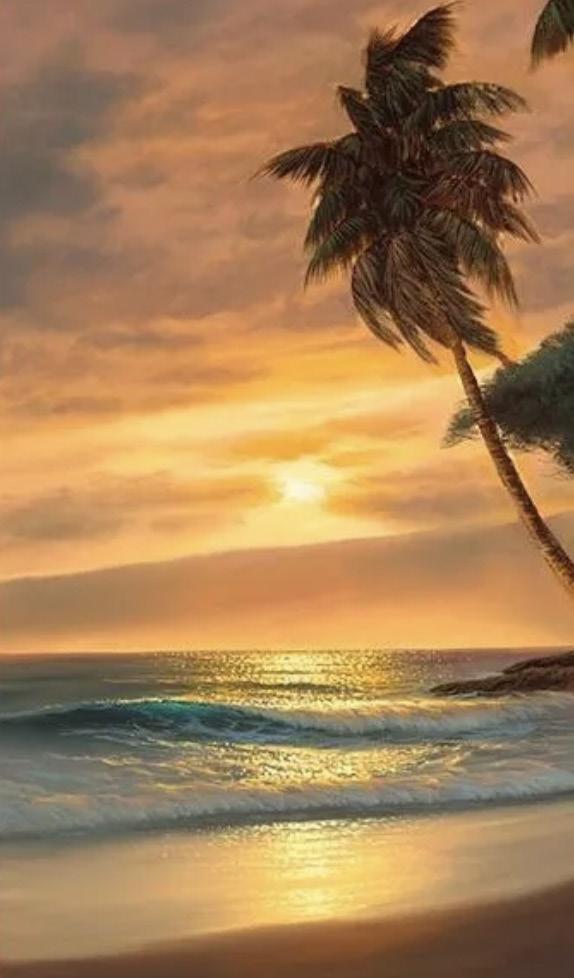
Known for his signature Reflections style, Walfrido’s art captures Hawa‘i’s landscapes in vivid detail — a striking way to bring the island feel into your home.
https://walfrido.com/?srsltid=AfmBOorSTF
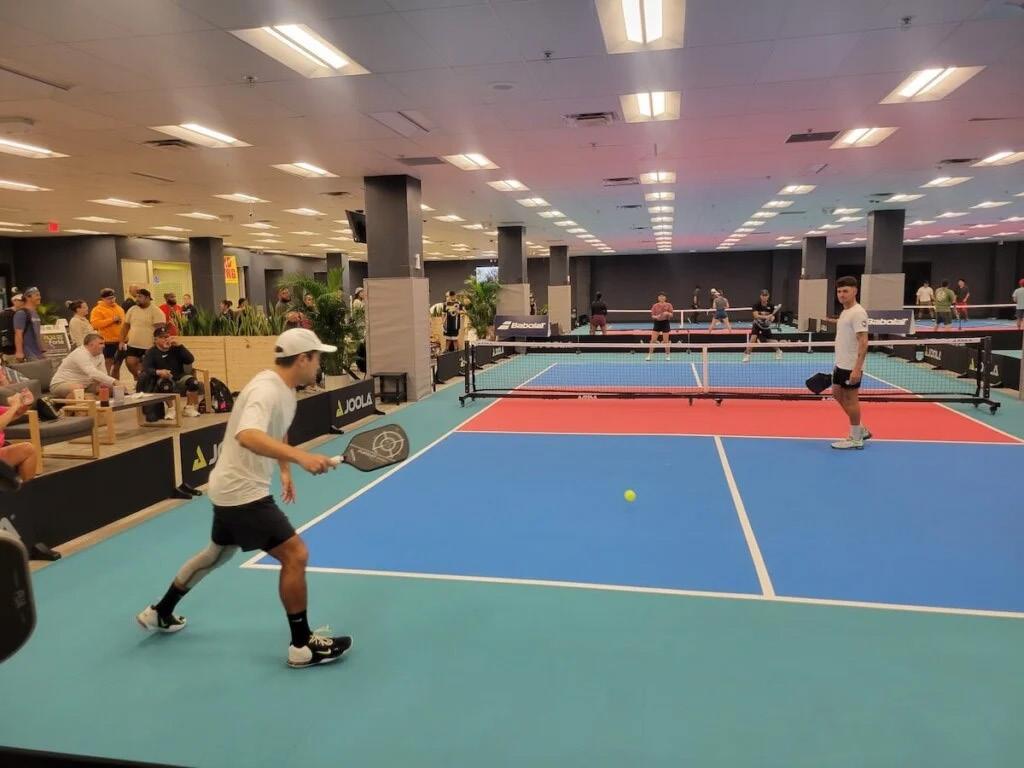
Hawaii’s only members-only indoor pickleball club (and our incredible event host), Pickles at Forté offers year-round play, free of wind, rain, and sun.
https://www.picklesatforte.com/

With one-on-one expert assisted stretching, StretchLab helps players increase mobility, recover faster, and prevent injuries so they can keep playing to their heart’s content.
https://www.stretchlab.com/location/ honolulu

Gorgeous, 22K gold pickleball pendant. Show off your PB pride on and off the court, in luxe gold.
https://studio22k.com/product/ pickleball-pendant/

Pickleballers swear by this locally made CBD balm for quick relief on sore muscles and joints, keeping them ready for the next match.
https://lanikaibathandbody.com/ collections/cbd-therapy-skincare/ products/cbd-balm-for-painreli ef-lanikai-bath-and-bodybrand?variant=51157294940441
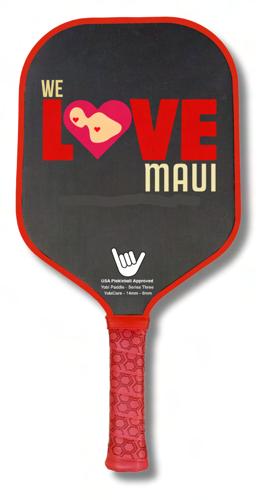
The Yobi We Love Maui Paddle pairs solid performance with a heartfelt design that honors the spirit and resilience of Maui.
https://yobipaddle.com/product/ maui-standard-shape-thermo-14mm/
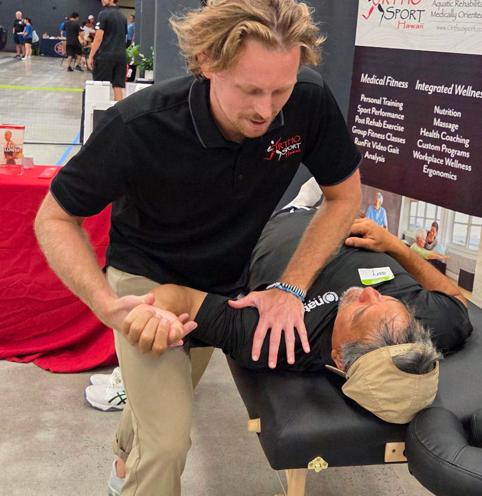
With expert physical therapy, massage, and training, OrthoSport helps players bounce back stronger, move with confidence, and keep enjoying the game they love.
https://orthosport.com/
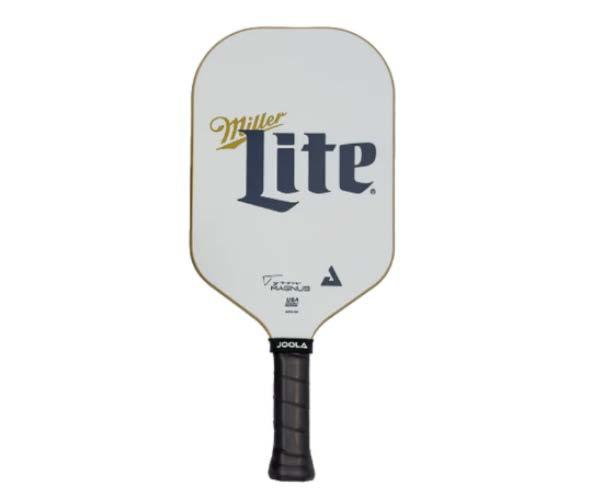
The original light beer…light, crisp, and refreshing— Miller Lite is the classic postpickleball brew players reach for after a long day on the courts.
www.millerlite.com
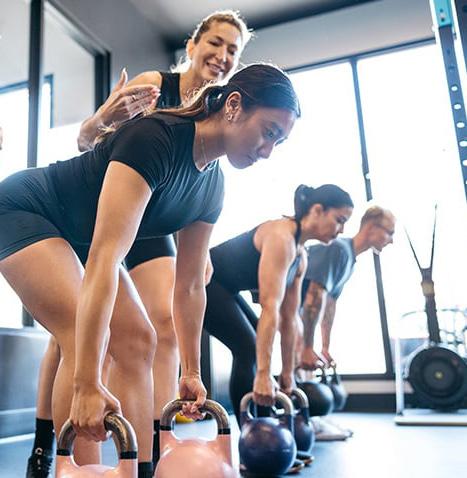
With science-based group workouts led by expert coaches, BFT helps players build strength, endurance, and agility to level up their game.
https://www.bodyfittraining.com/ location/honolulu
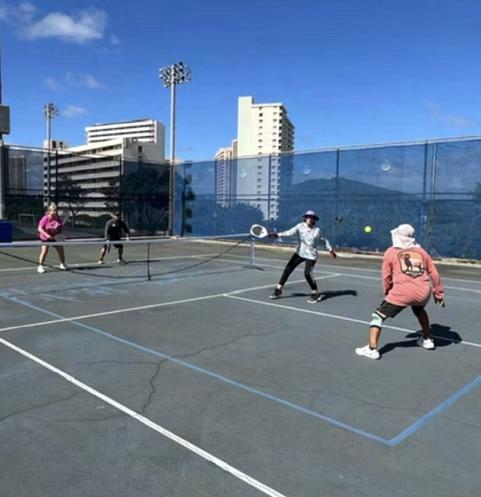
K2 Pickleball hosts monthly tournaments — giving players the chance to test their skills and be part of a growing community.
https://www.k2tens.com/copy-oftennis
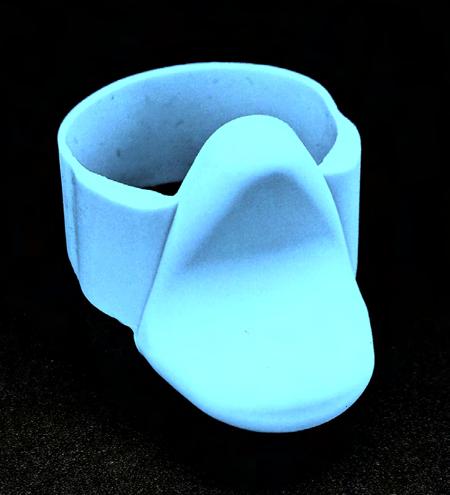
Built to improve grip strength and stability, Trigger Grip Pro helps players prevent slips, reduce strain, and overall uplevel their game.
https://www.triggergrippro.com/

Born on Maui, the PKOLL paddles are designed based on the premise that smaller paddles = less drag and more velocity.
https://pkoll.com/

From yoga to meditation, Still & Moving Center offers mindful movement classes that keep players balanced, flexible, and grounded both on and off the court.
https://stillandmovingcenter.com/
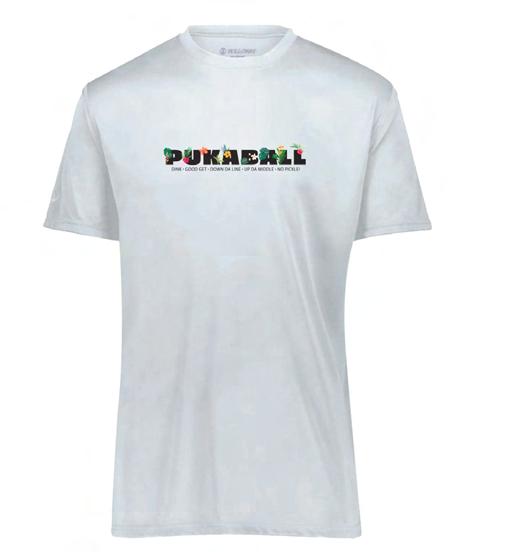
Lightweight and moisturewicking, this Pai Pickleball tee keeps you cool on the court while repping Hawai‘i’s pickleball style.
www.paipickleball.com/shop/p/pbhishort-sleeve-wicking-t-x8mpw-fpb3ck8t75-hked6-ca2ww-3rl59
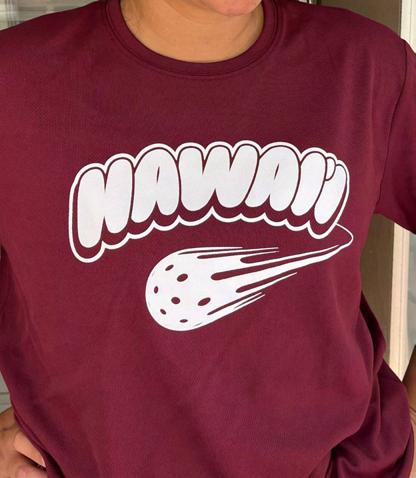
Lightweight, sweat-wicking, with glow-in-the-dark ink. Nuff said.
https://allgoodpickleball.com/ products/the-full-tilt-aka-gritty-bynature
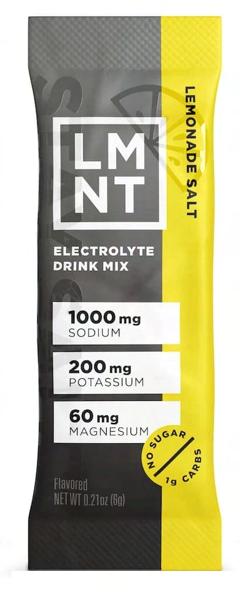
Stay Salty with LMNT’s drink mix formulated to help anyone with their electrolyte needs.
https://drinklmnt.com
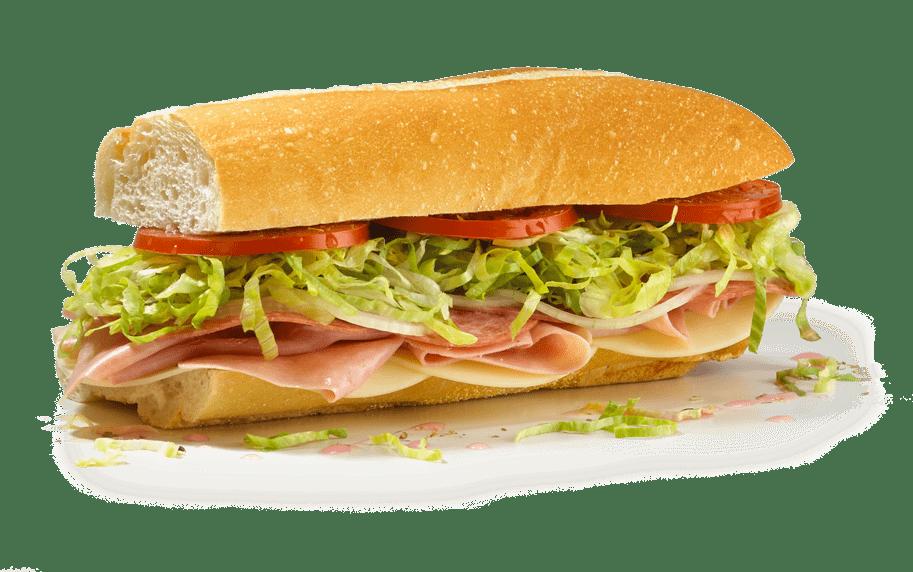
The Stickball Special for the W…Jersey Mike’s hit the spot after pickleball. https://www.jerseymikes.com/menu/coldsubs/11-stickball-special
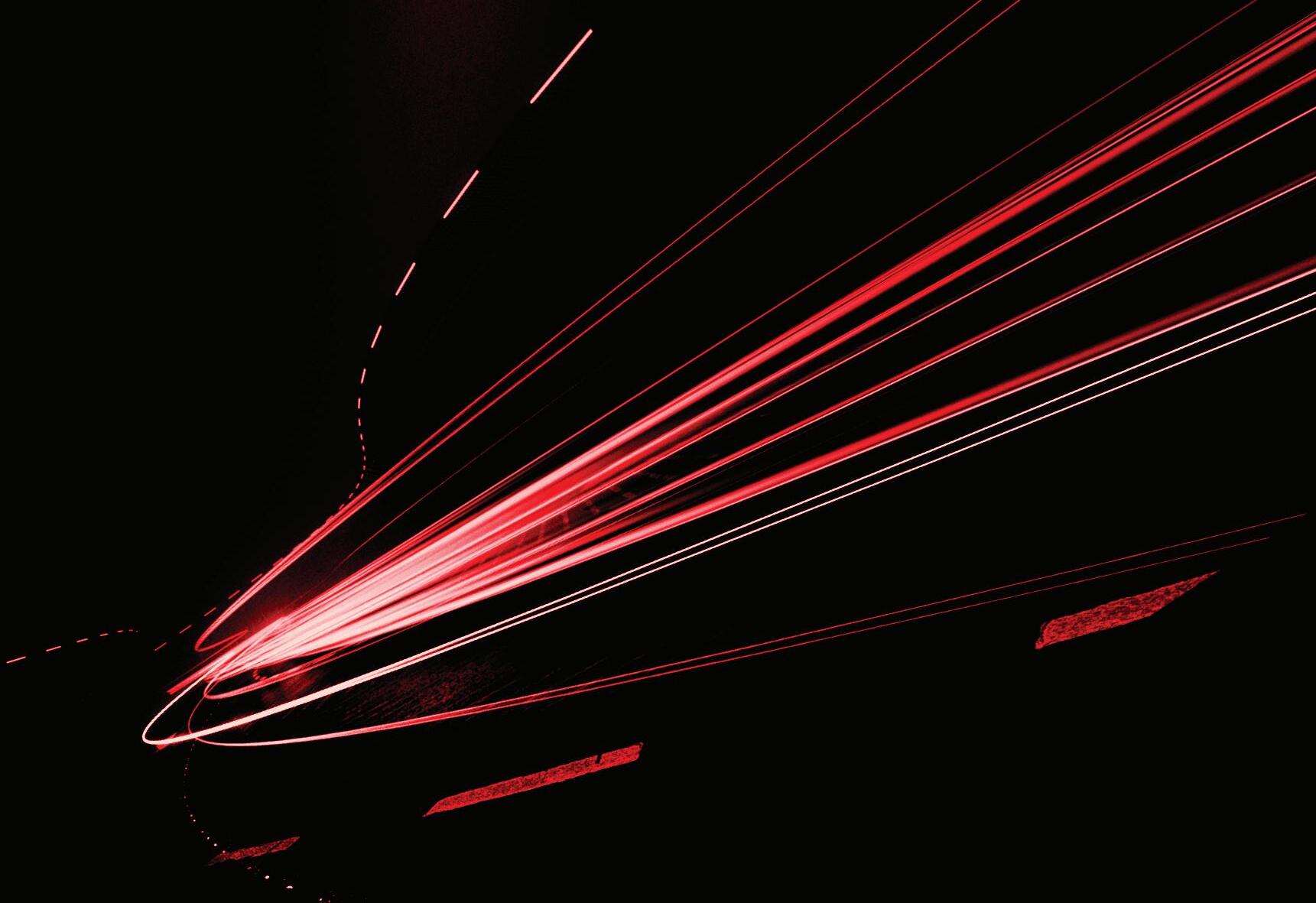
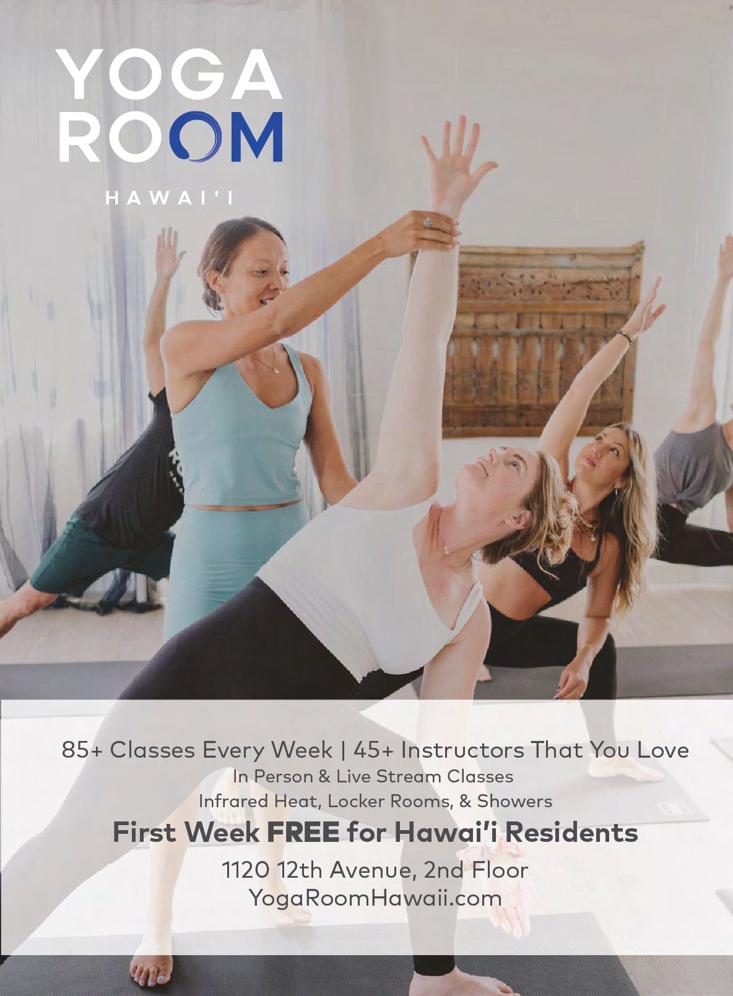




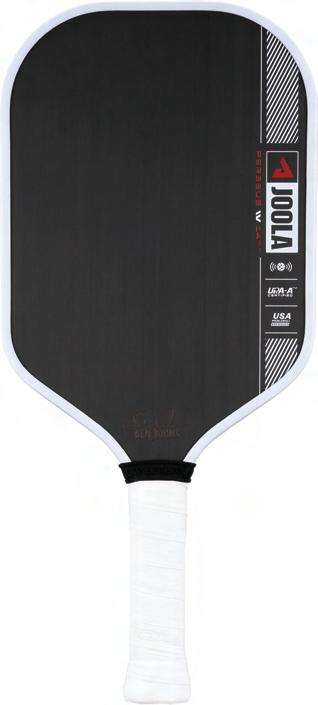






The August K2 Pickleball Doubles Tournament was held on August 9-10, 2025. Check out the results and a full gallery of photos!
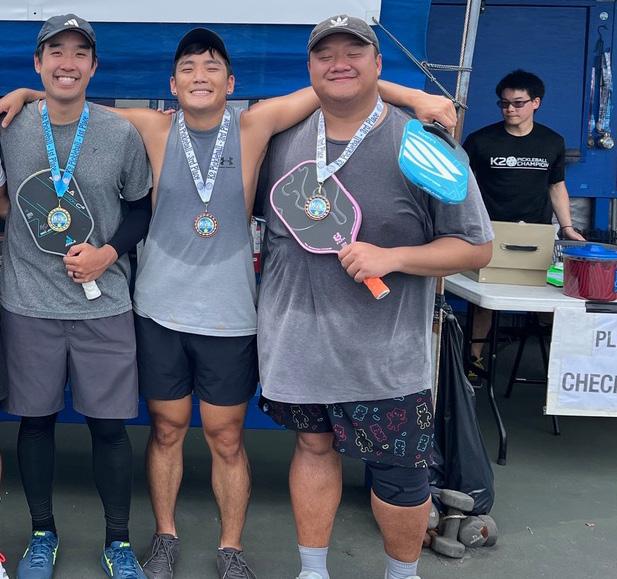
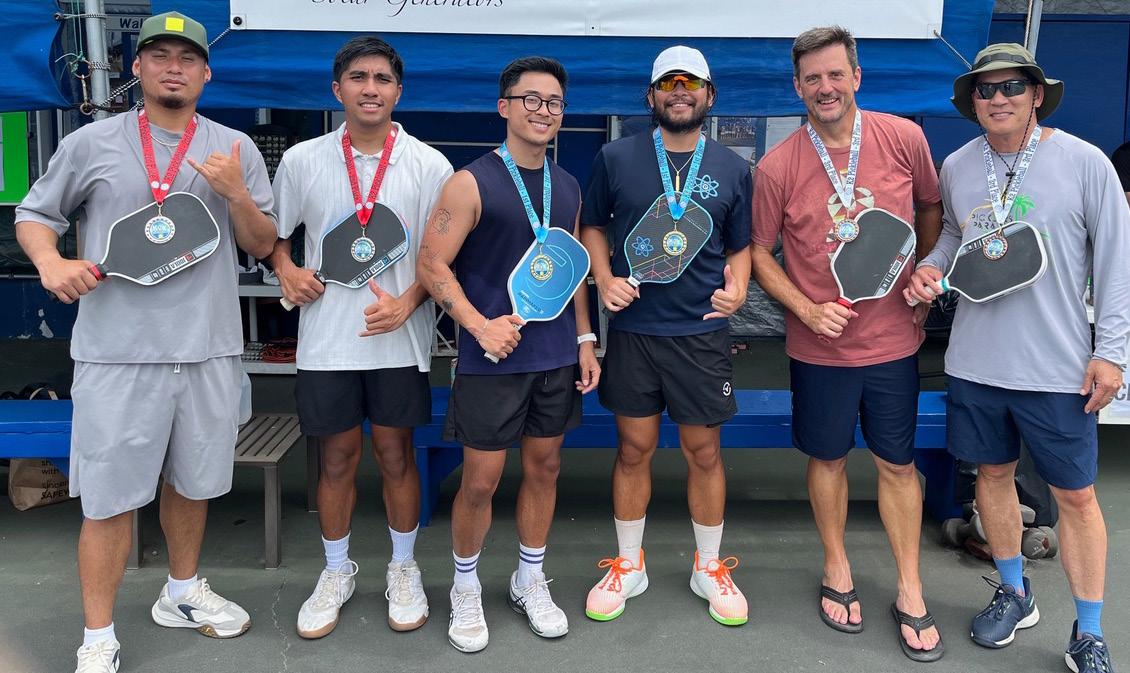
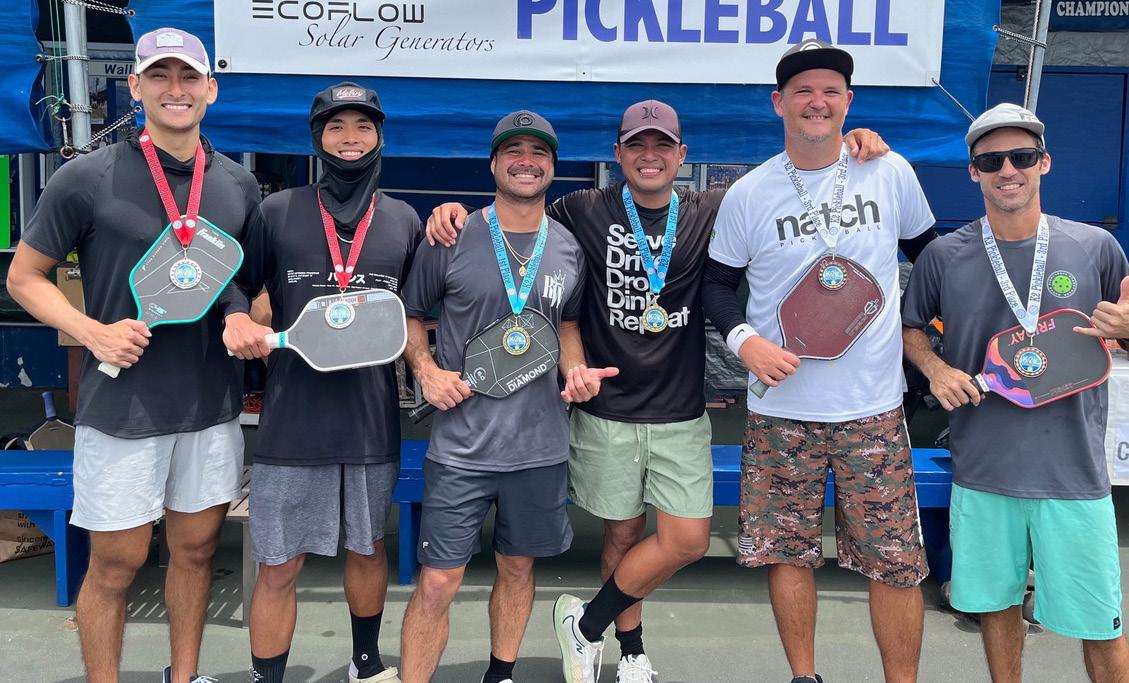
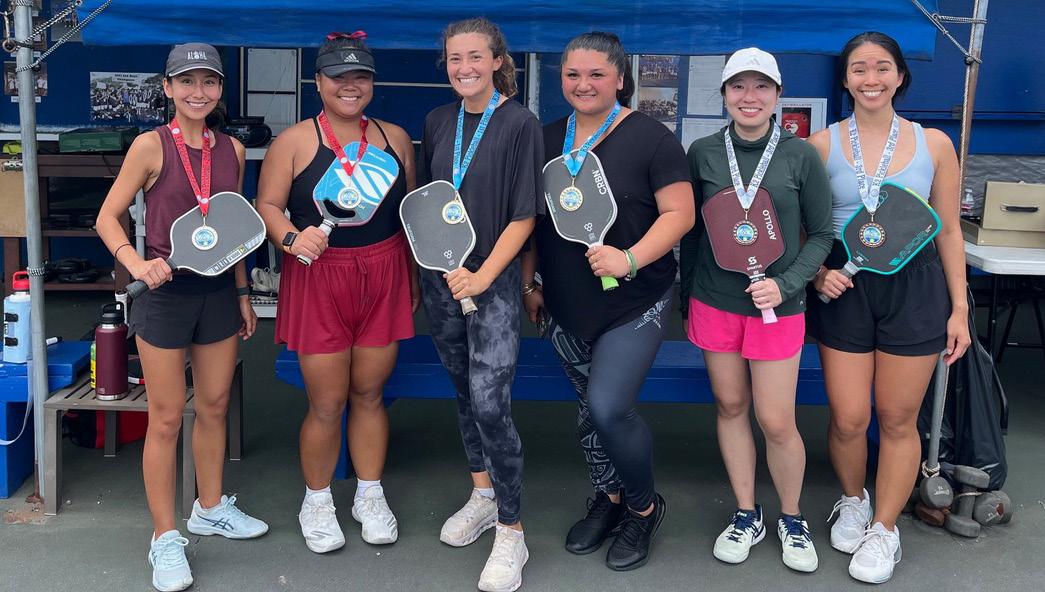
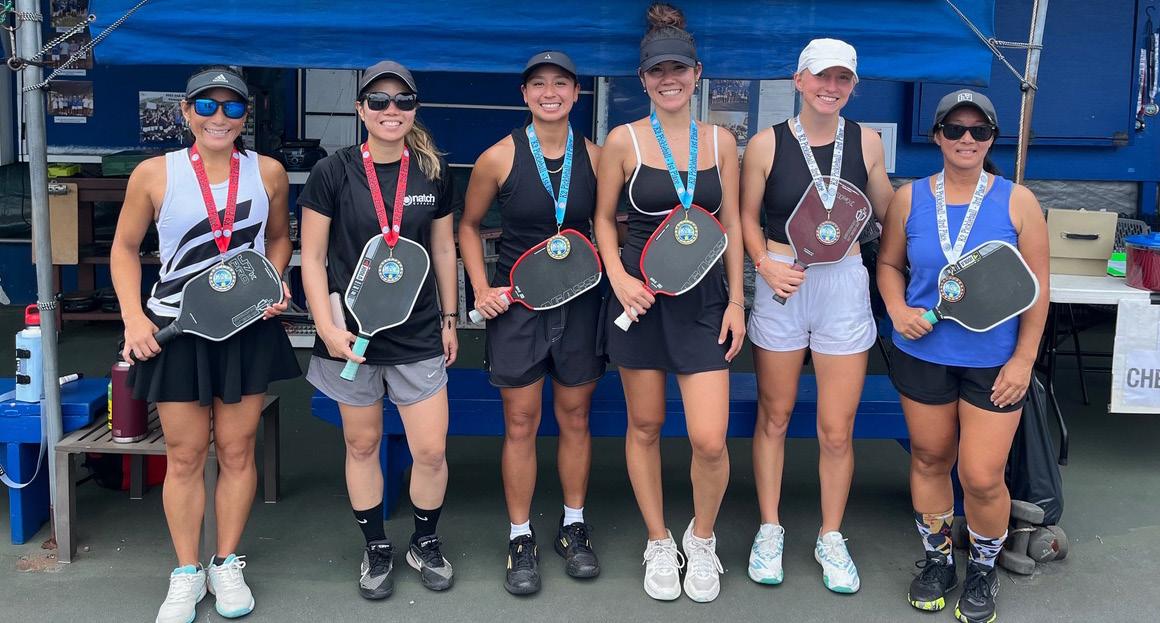





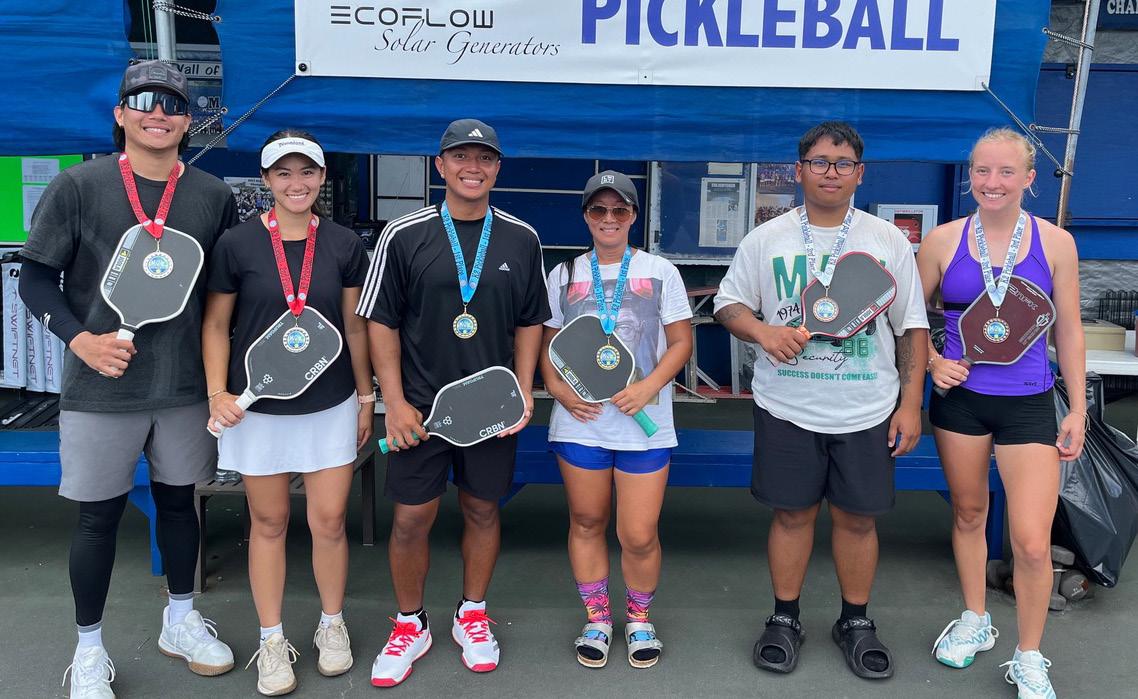
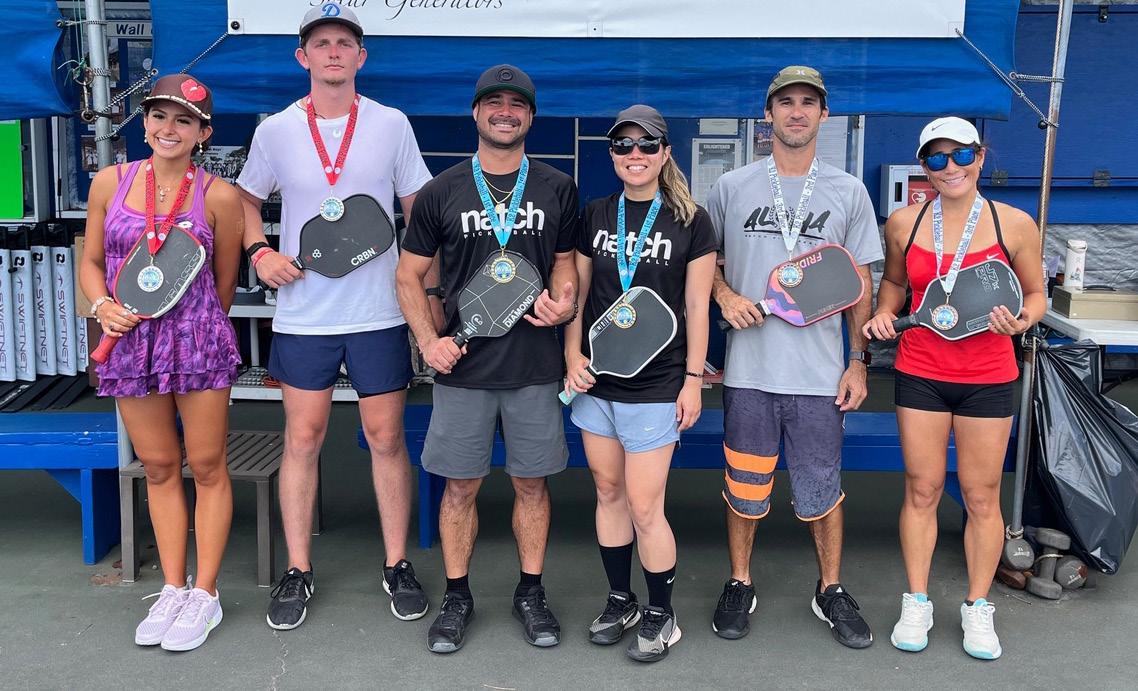





Hawaii’s first men-only pickleball event brings nearly 50 players together

On August 2nd, Palama Settlement turned into the ultimate man cave on the court as guys showed up for Hawaii’s firstever men-only pickleball event. No brackets, no medals—just five hours of spirited play, friendly ribbing, and plenty of high energy. Organized by HPM Ambassador Norman Kawakami, this fundraiser for Palama Settlement drew nearly 50 men of all ages and skill levels, proving that sometimes the best way to make history is simply by showing up with a paddle and a love for the game.
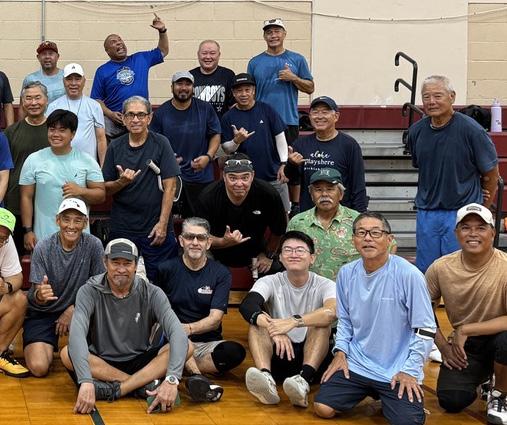
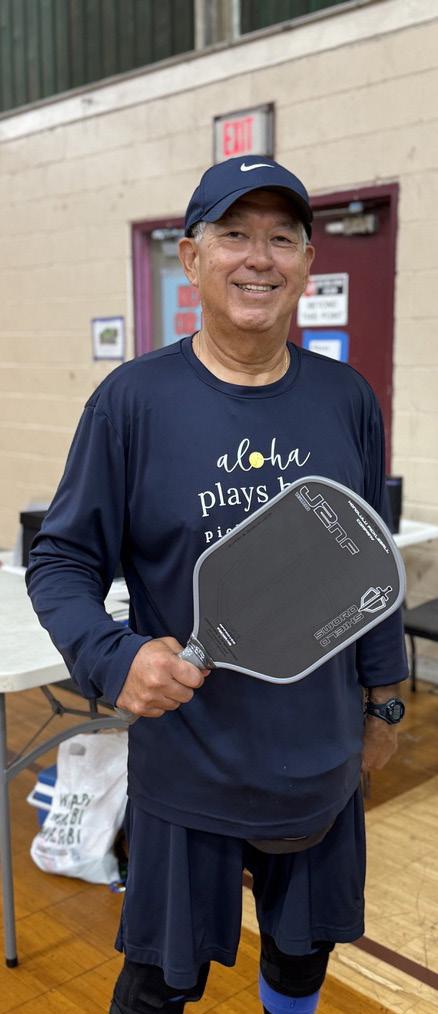


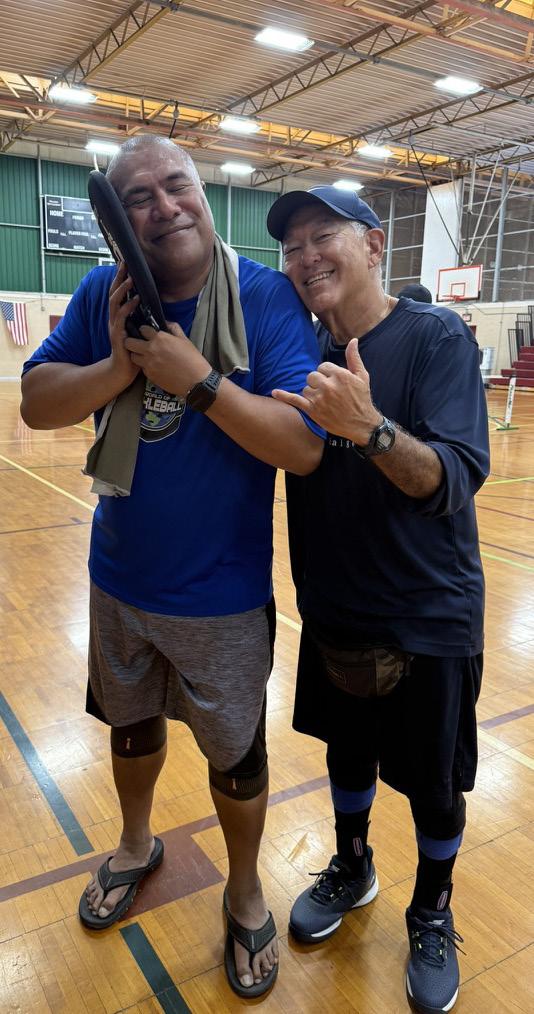

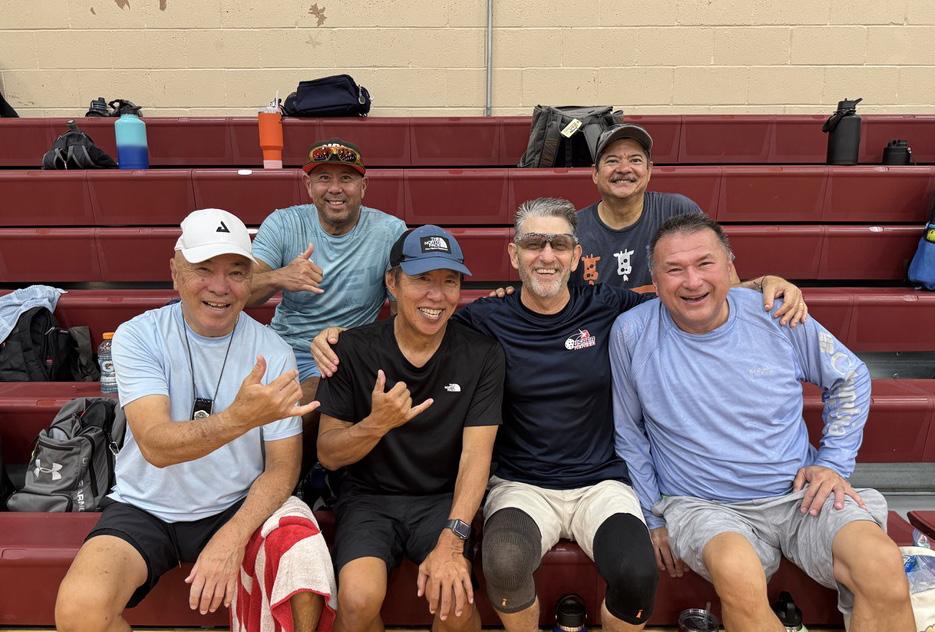
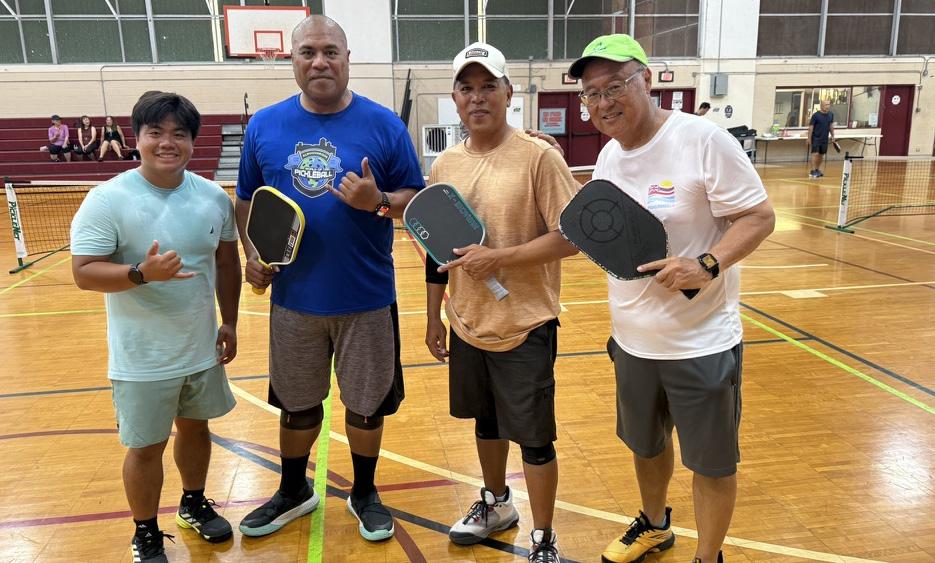

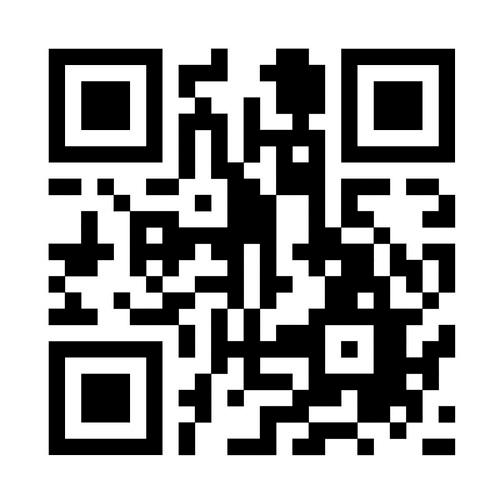

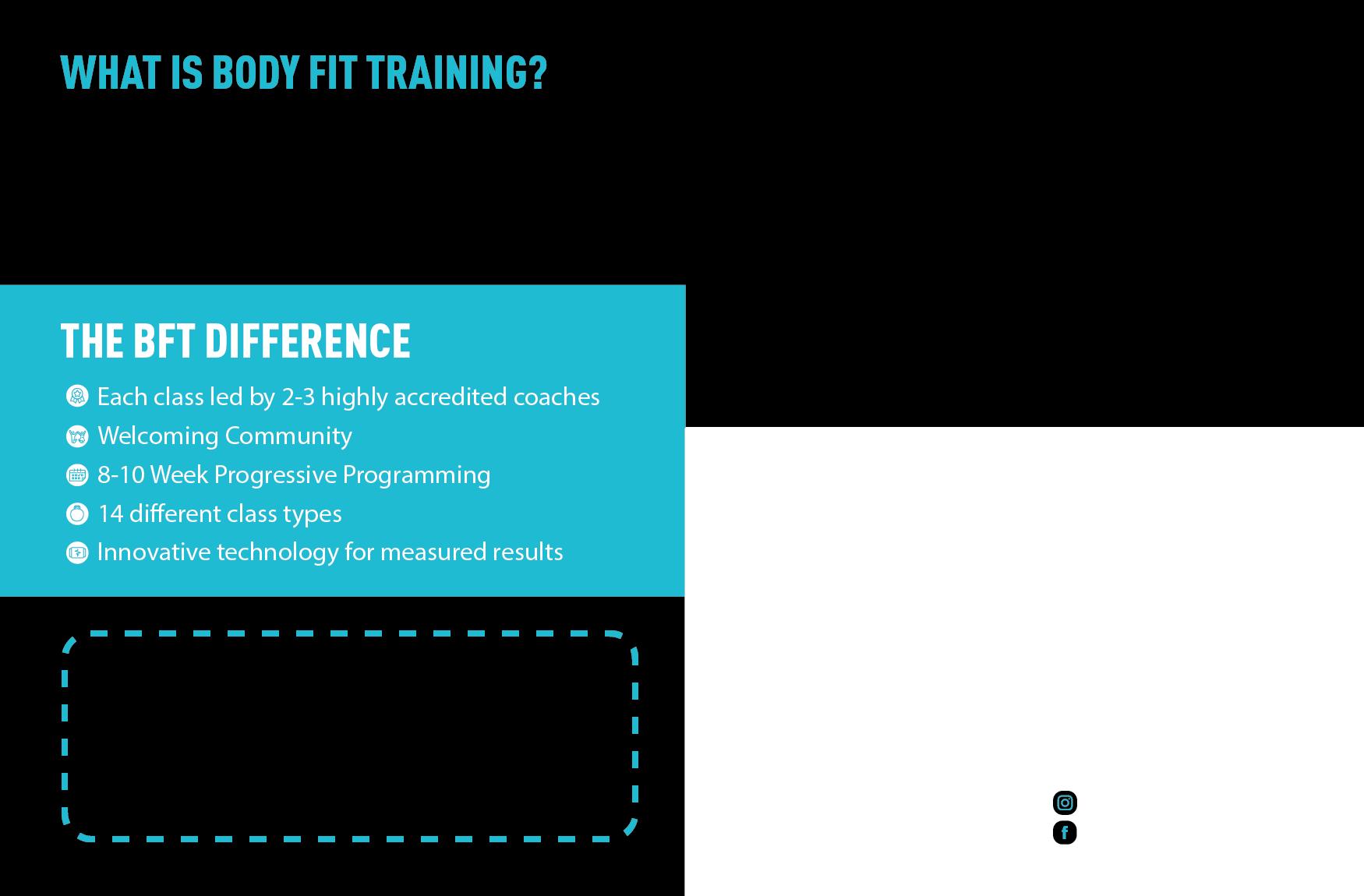
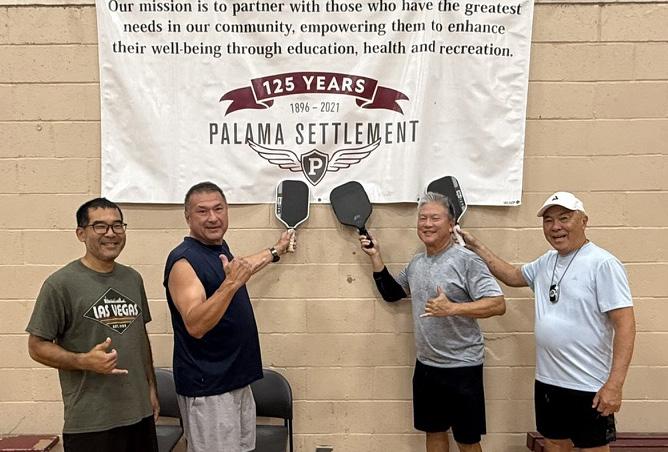
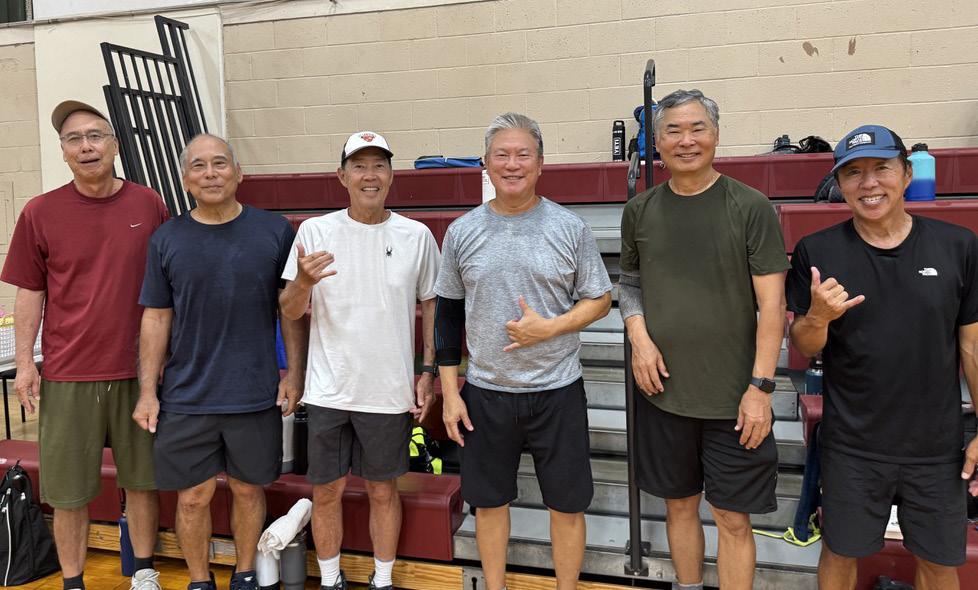

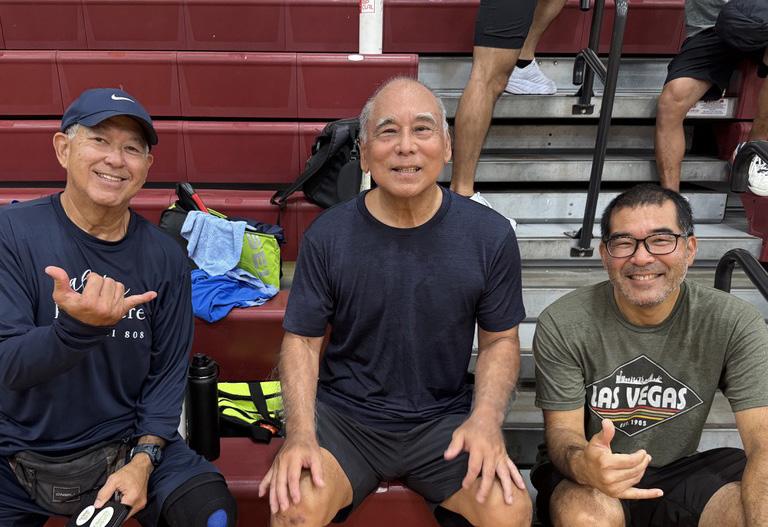

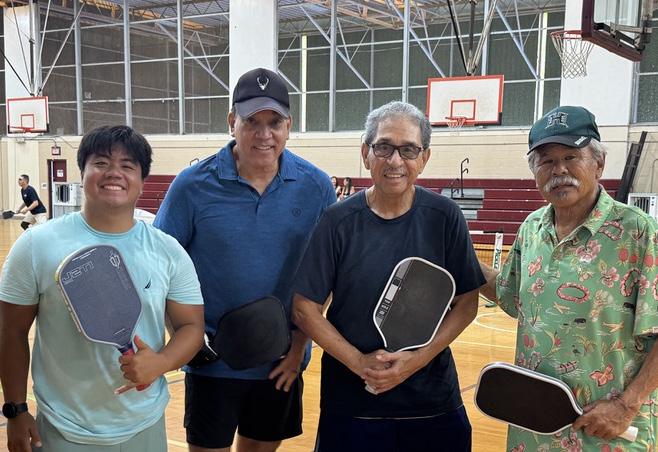
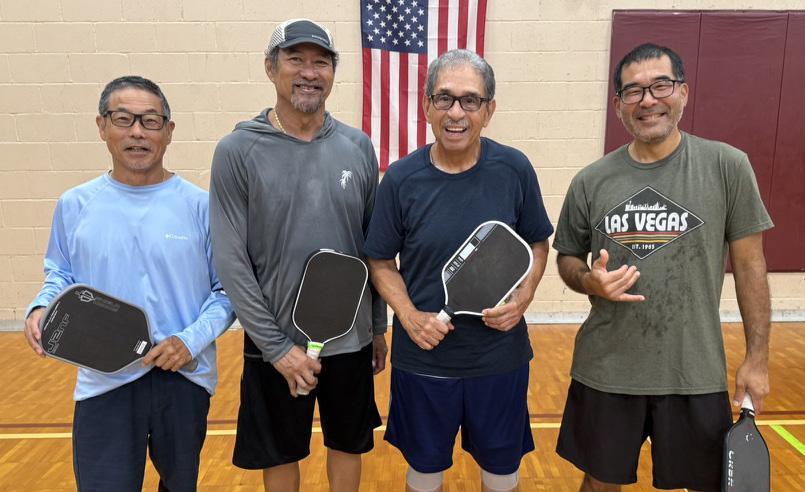
Marking the milestone with games, friends, and aloha
On August 8, about 130 Hawaii pickleball friends and influencers gathered at Pickles at Forté to celebrate the magazine’s 2-year anniversary. The theme of the night was gratitude–and its presence was felt in every corner.
Our media celebrities, Jana and Gary, live-streamed portions of the event, and got in some “Courtside Qs” with attendees. See the coverage of the event on our Instagram or Facebook pages.
The celebration featured open play with a pro, mix-in social courts, a Beat the Pro “Survivor-style” competition (sponsored by Joola) with Keven Wong, and a dinking game.
Off the court, guests joined yoga with Still & Moving Center, stretch sessions from Stretch Lab, injury screenings by Ortho Sport, and a creative bookmark activity with Arty Parties Hawaii.
A highlight was the Pro vs. College exhibition match featuring Kata Biakina, Clemens Graute, Conner Koga (UH), and Daniel Rodi (Seattle U).
Raffles kept the energy high, capped by three grand prizes: a Swiftnet, a Bread & Butter Court Caddy package with a newly released “Wild Thang” paddle (valued at over $500) and a 2-night ocean-view stay at the Outrigger Kona Resort & Spa (worth $1,200).
Subs from Jersey Mike’s, pizza, drinks from Reign Storm and Miller Lite, and swag bags stocked with LMNT samples and Diamond Bakery cookies kept everyone fueled.
A gratitude station offered space for reflection, and the event was made possible by the support of our amazing volunteers.
More than a celebration, it was a reminder of what’s been built in two years—players and partners coming together to grow Hawaii’s pickleball community.
Here’s to the next chapter!






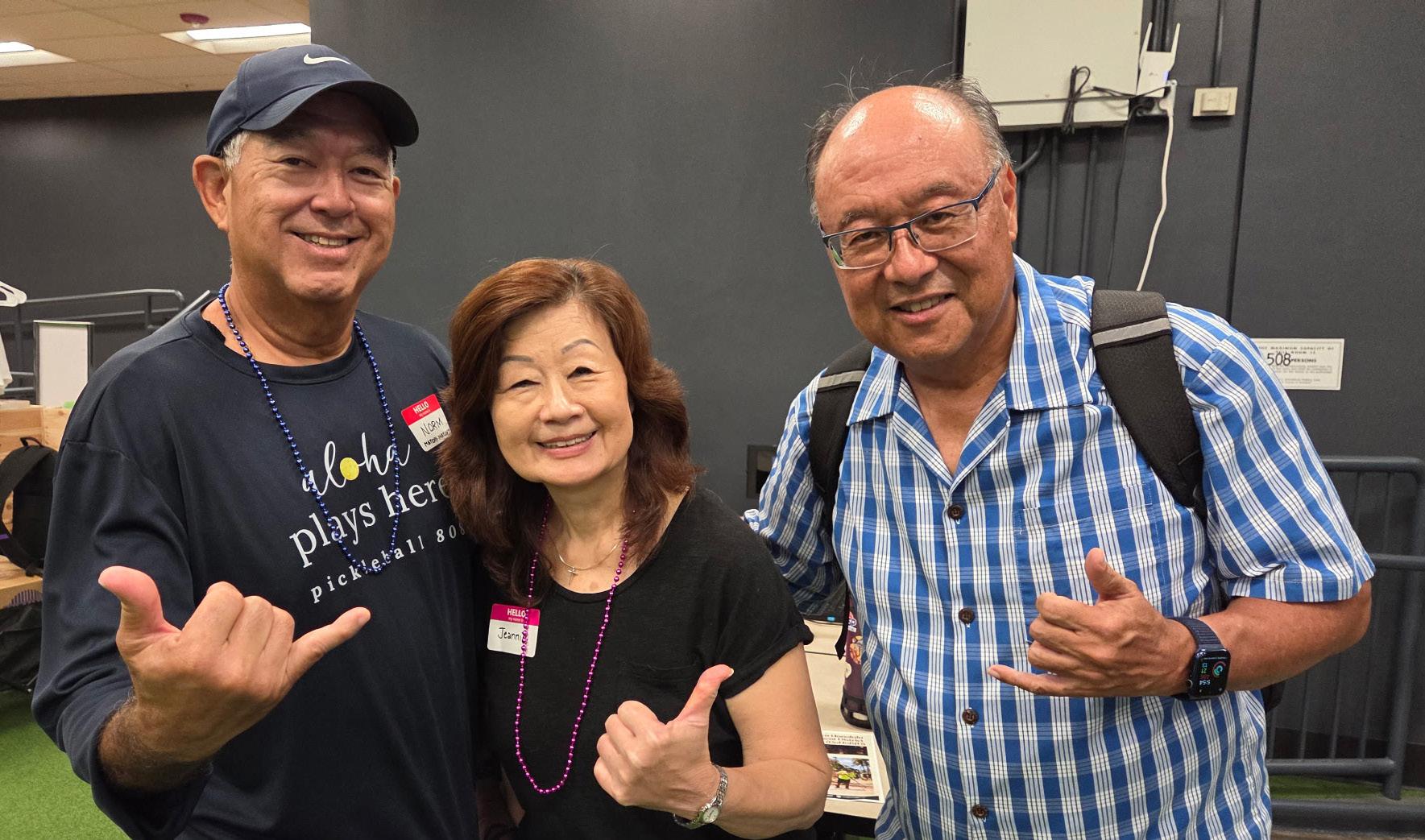
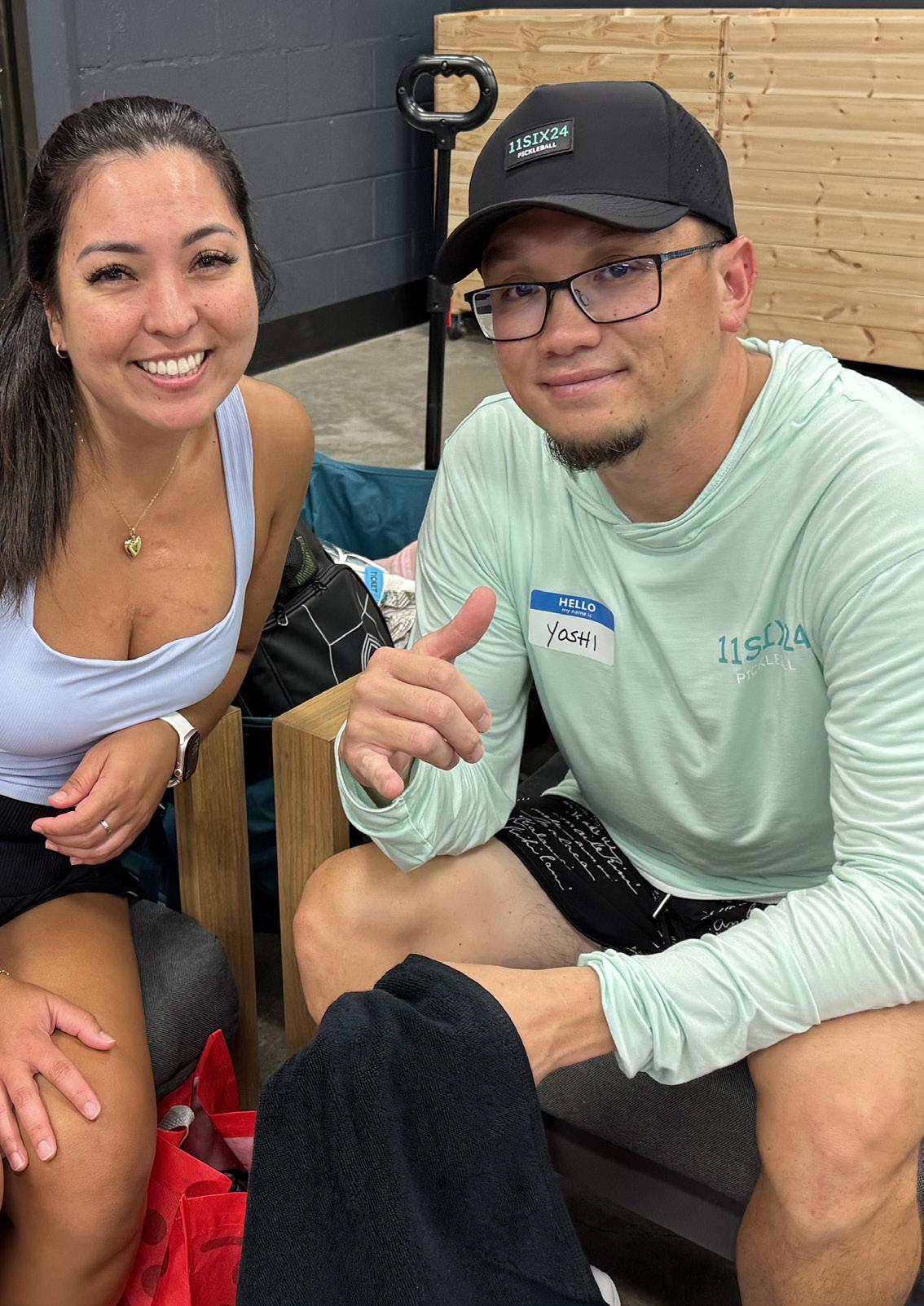

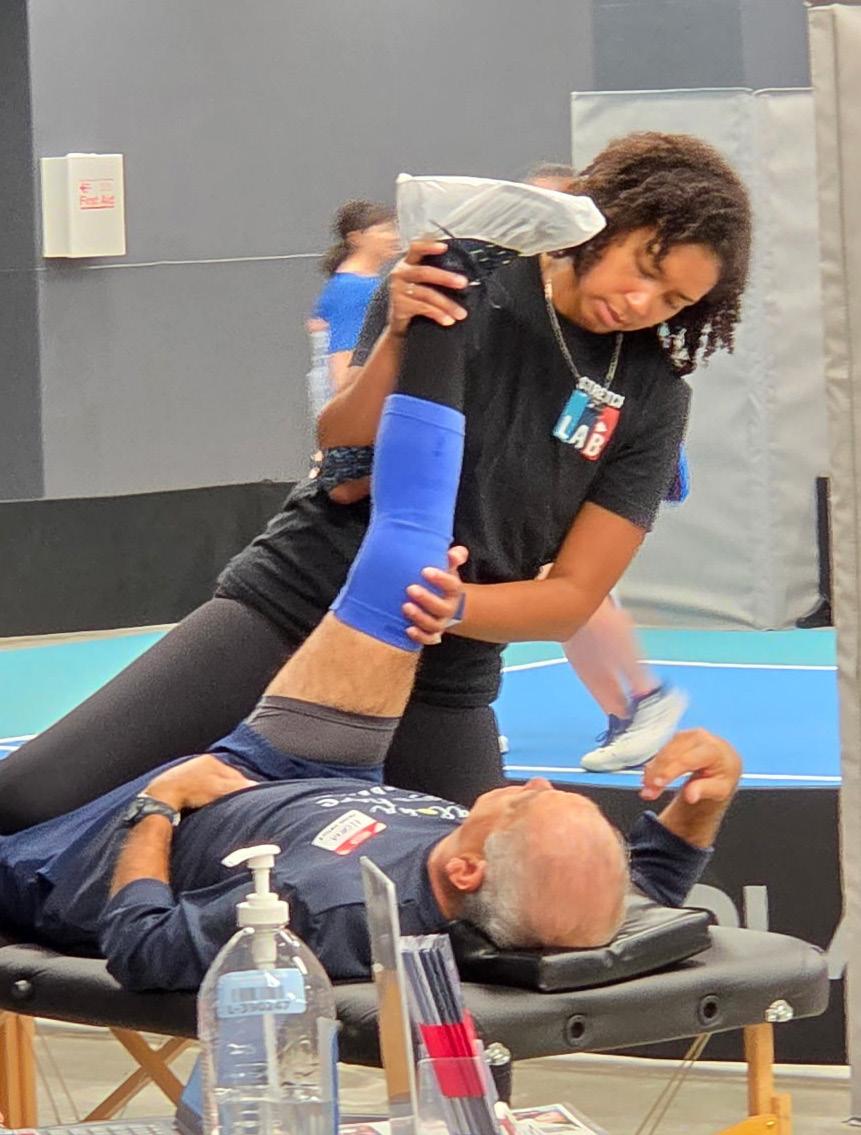

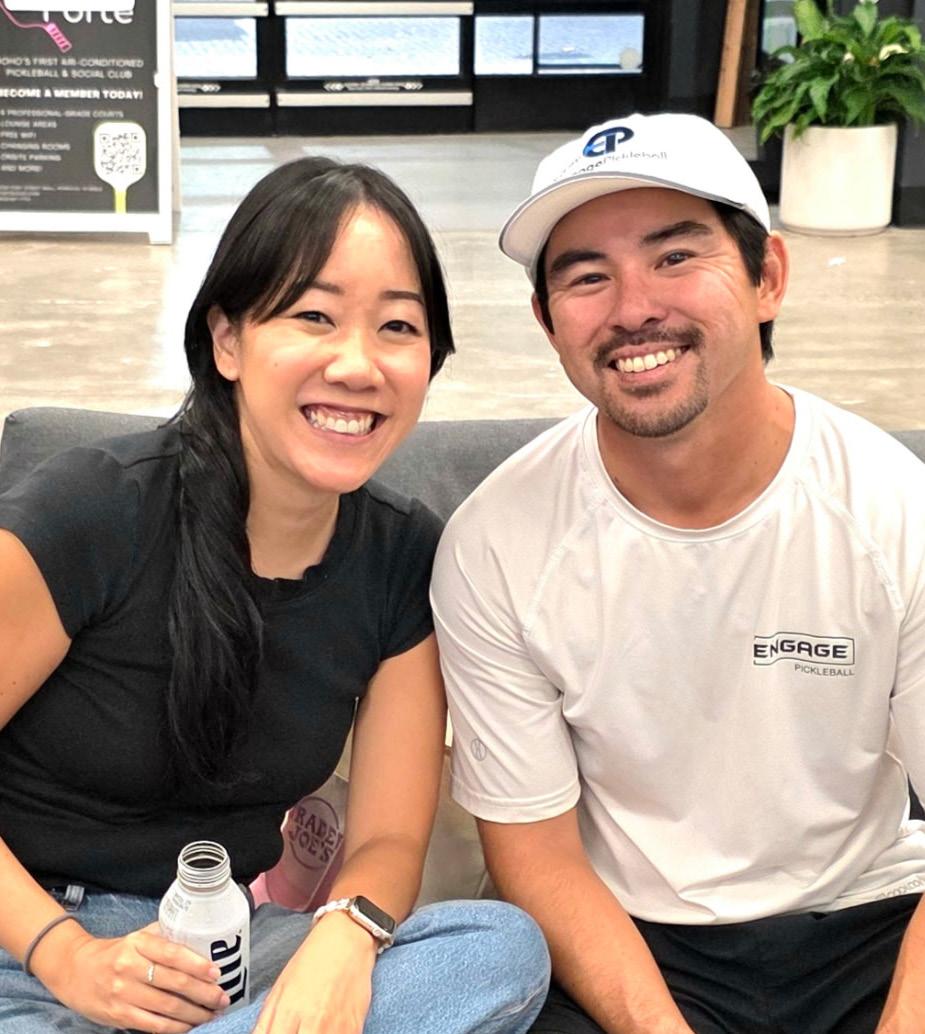
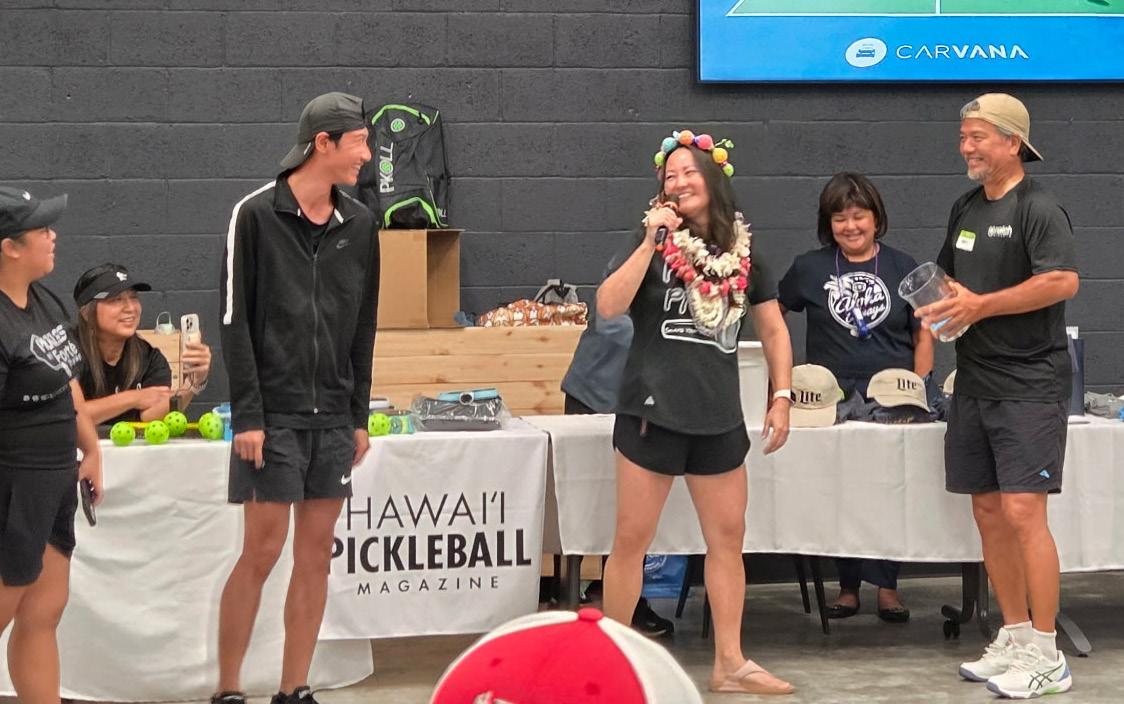
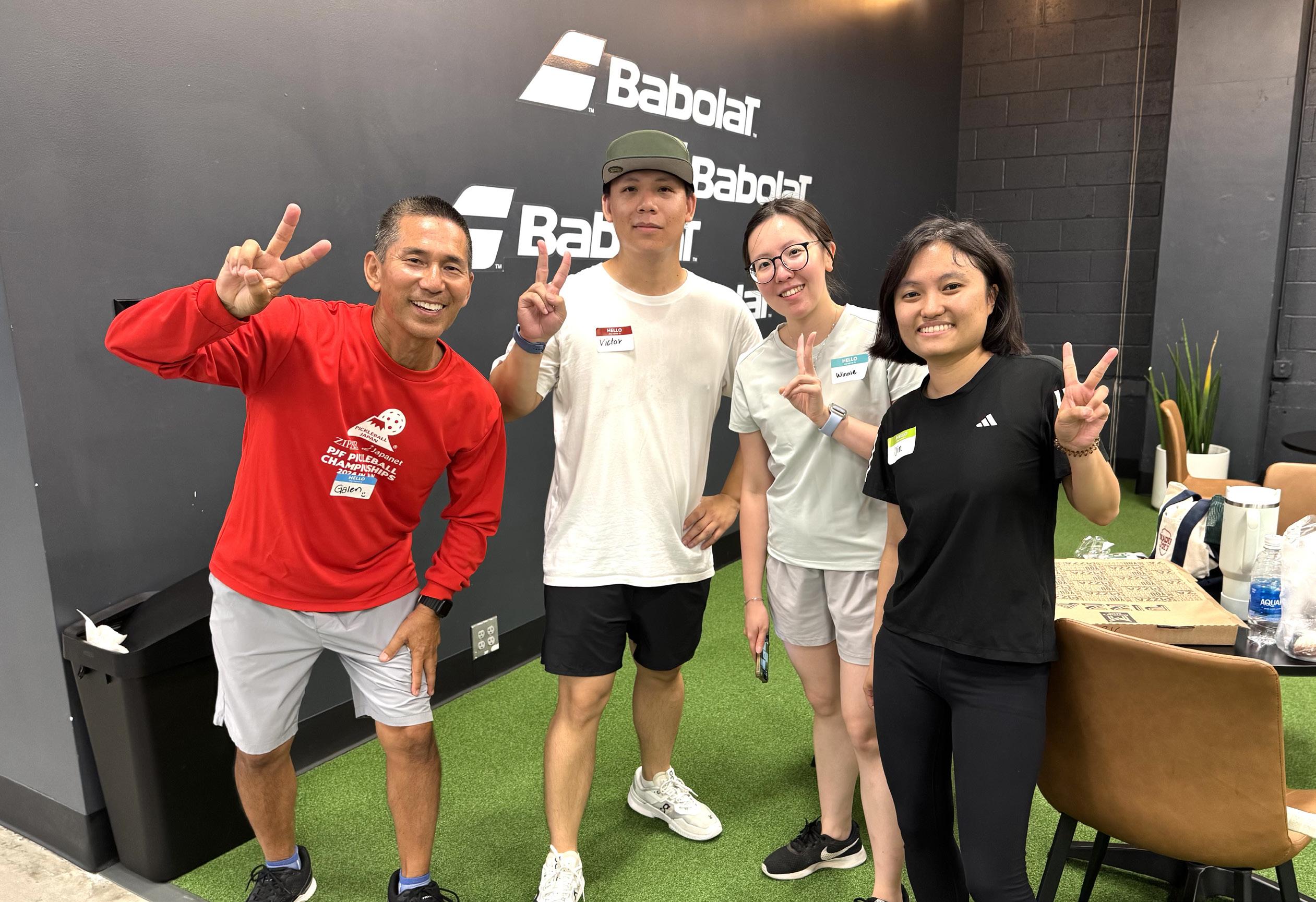

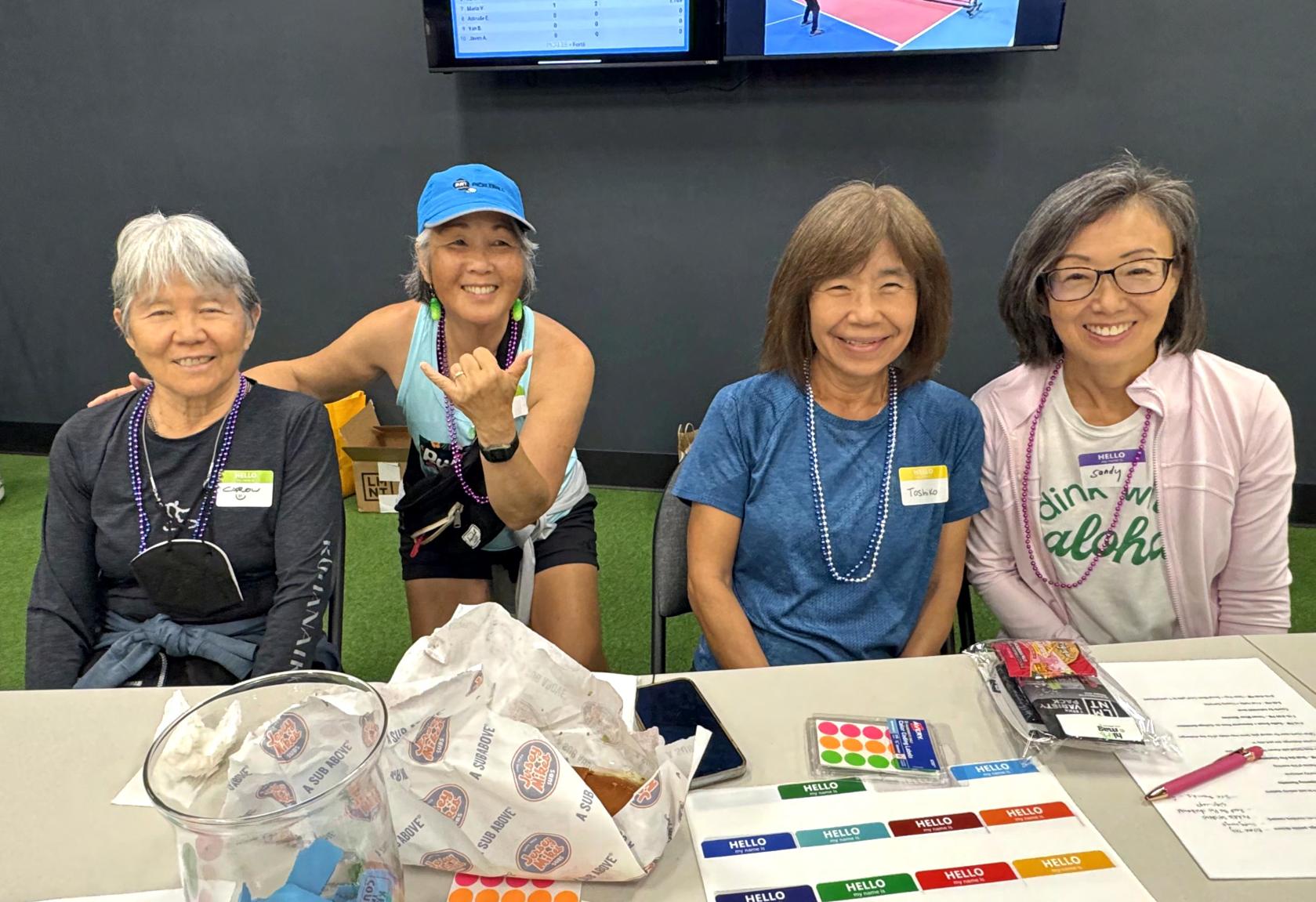

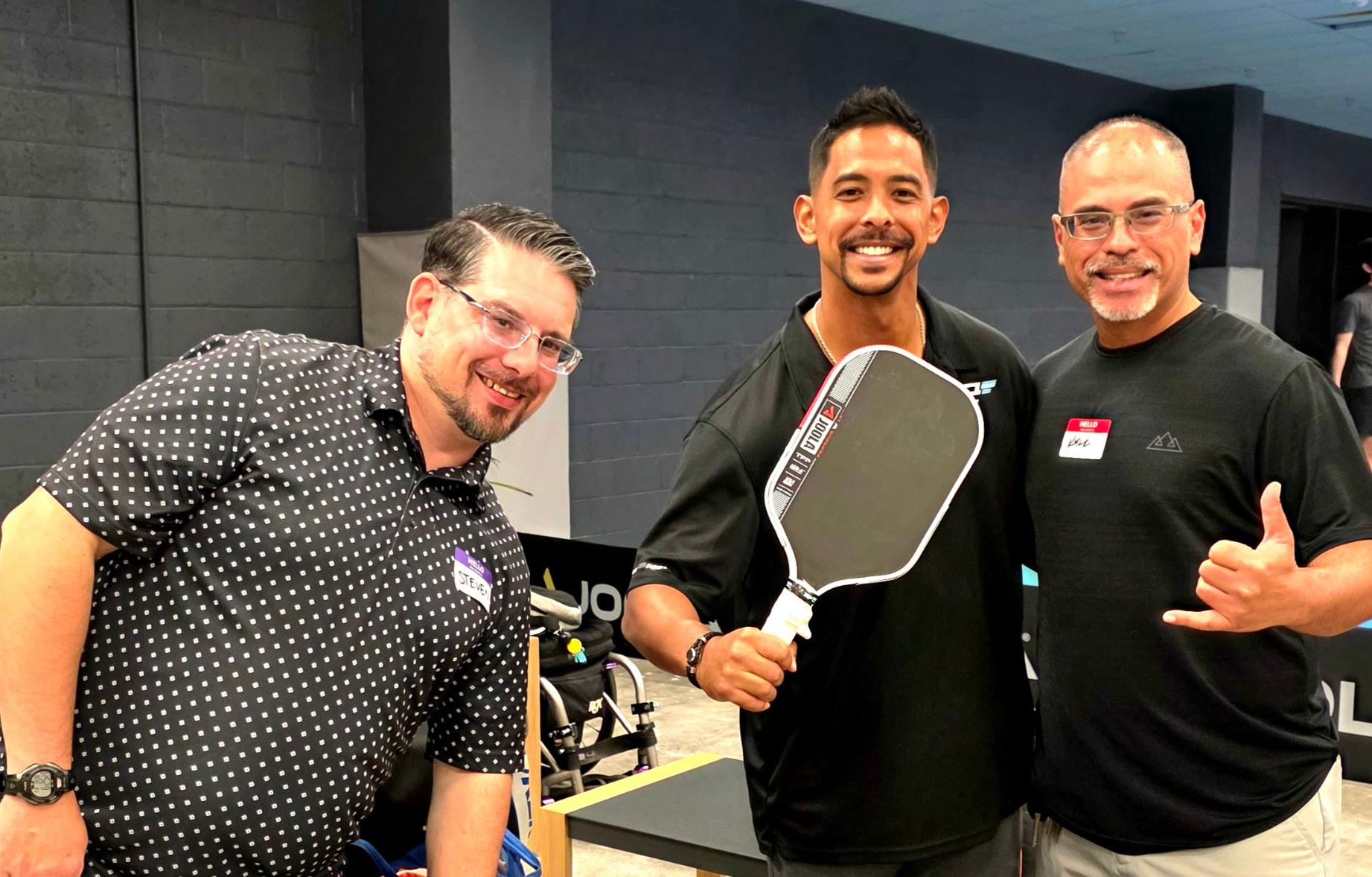



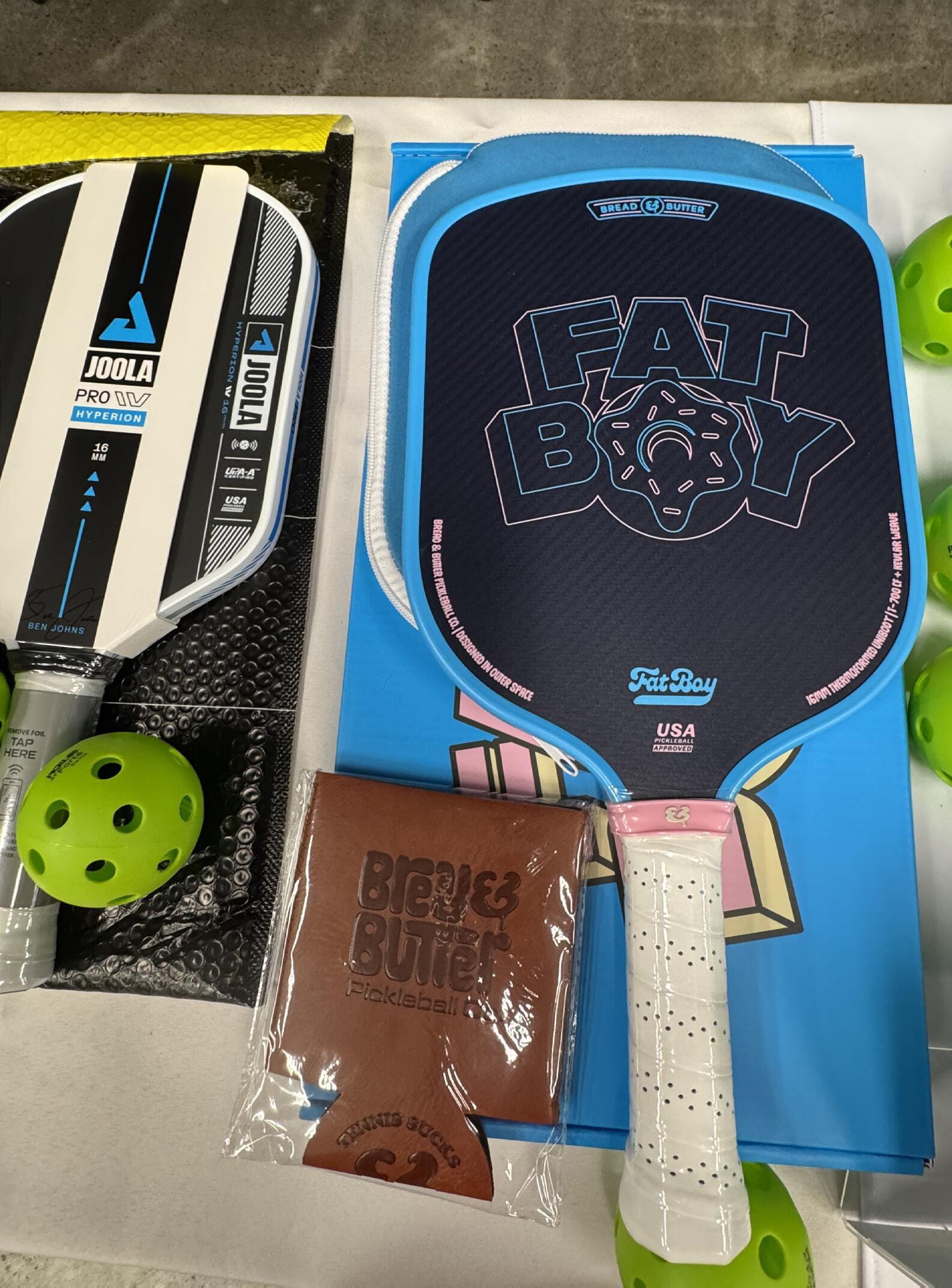
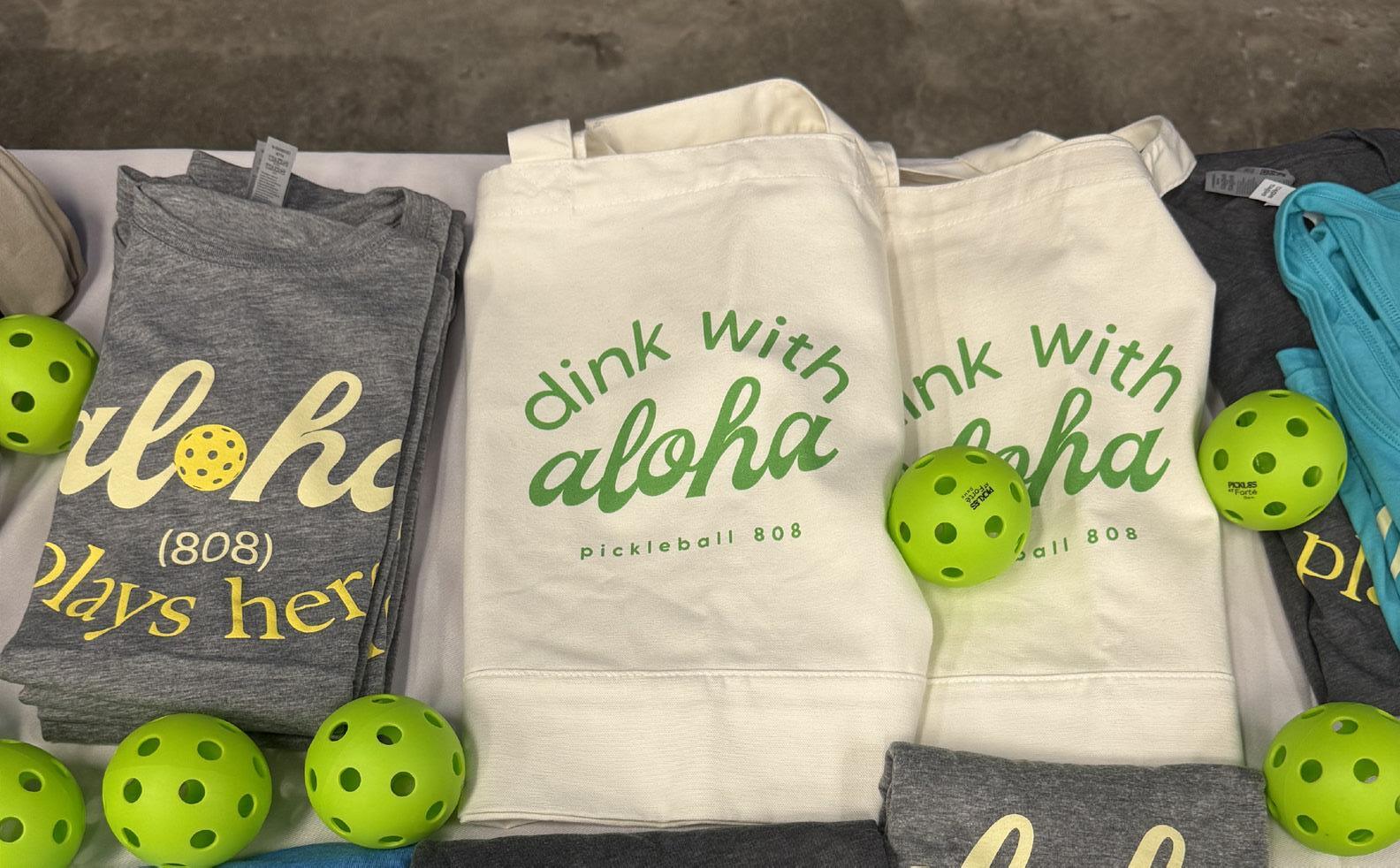



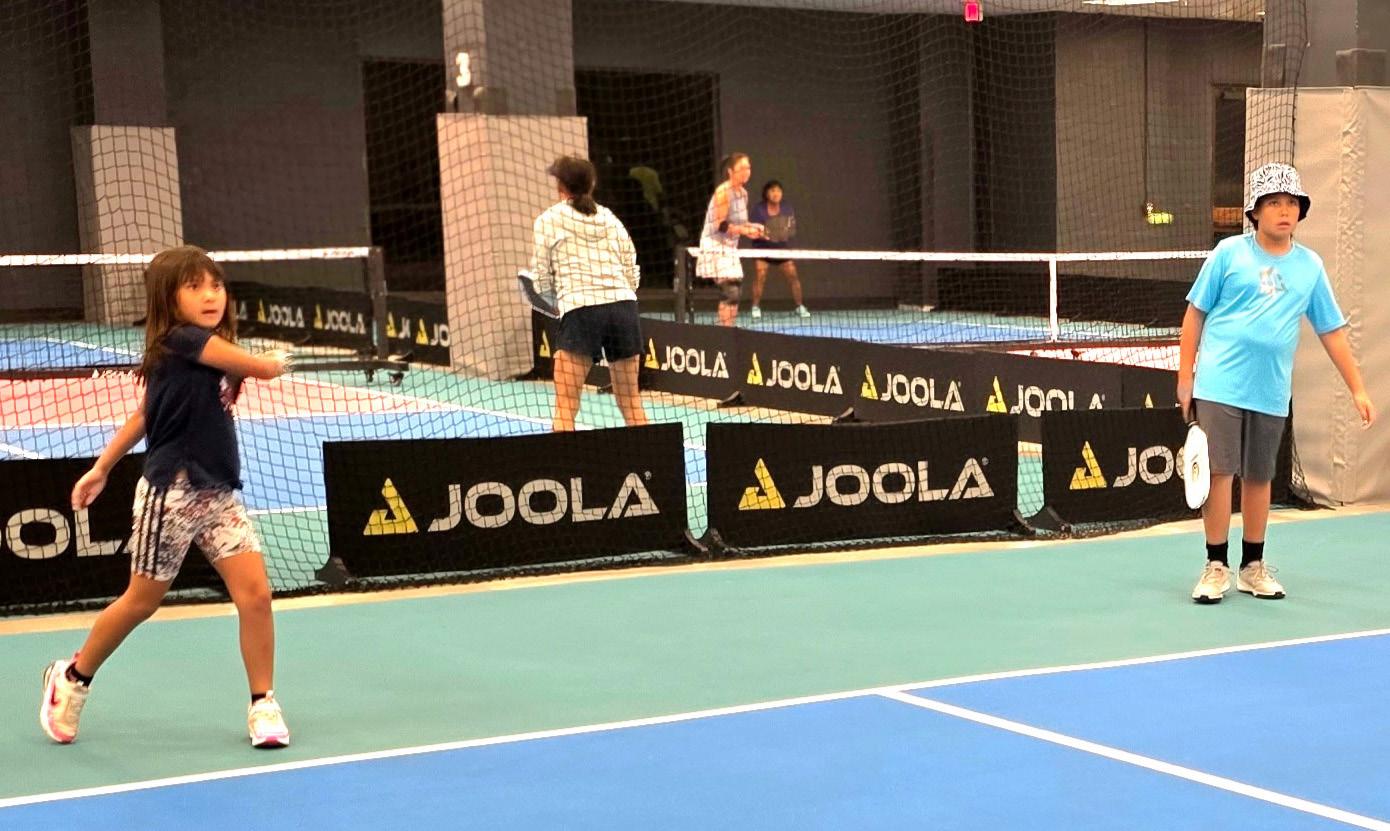


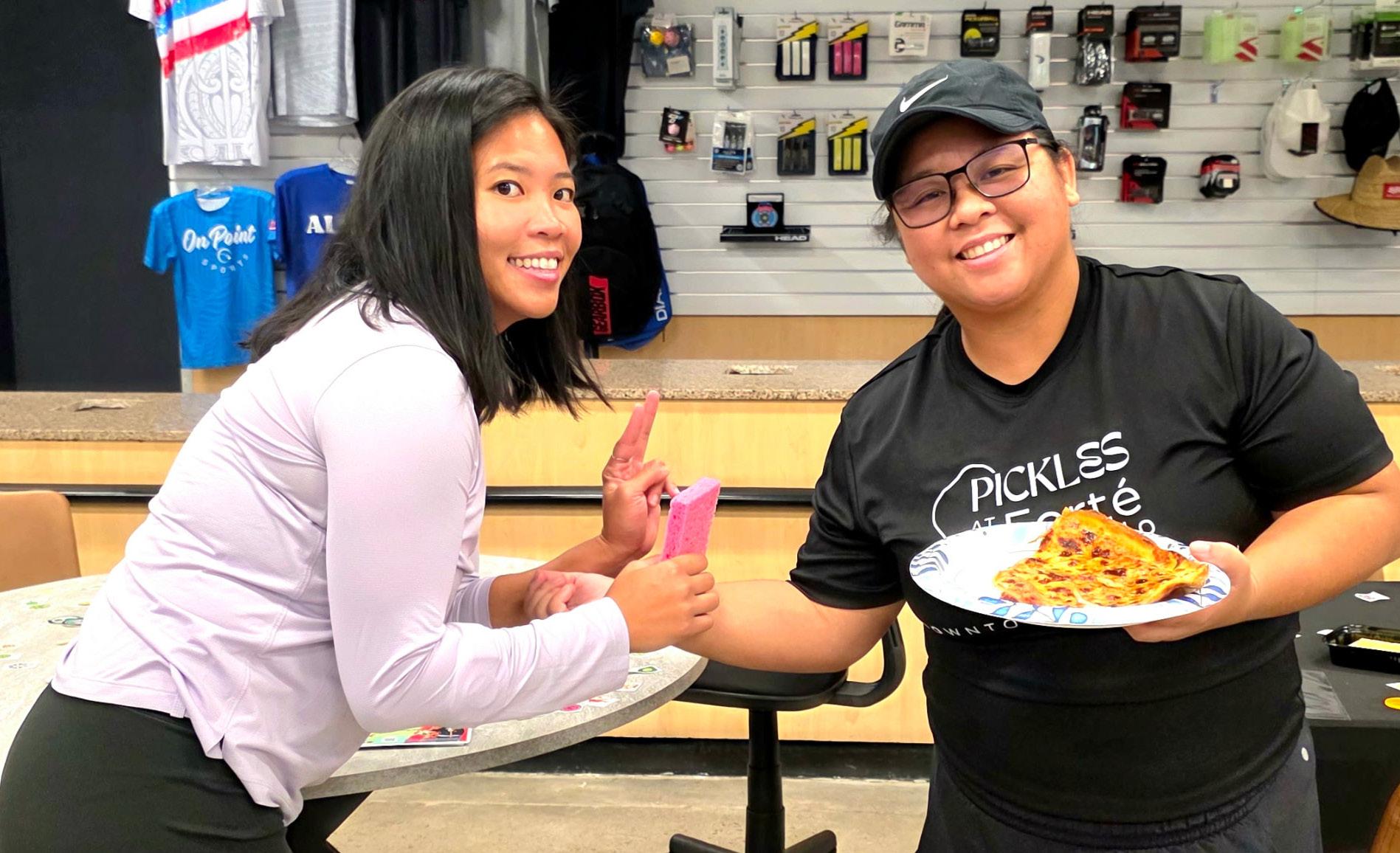
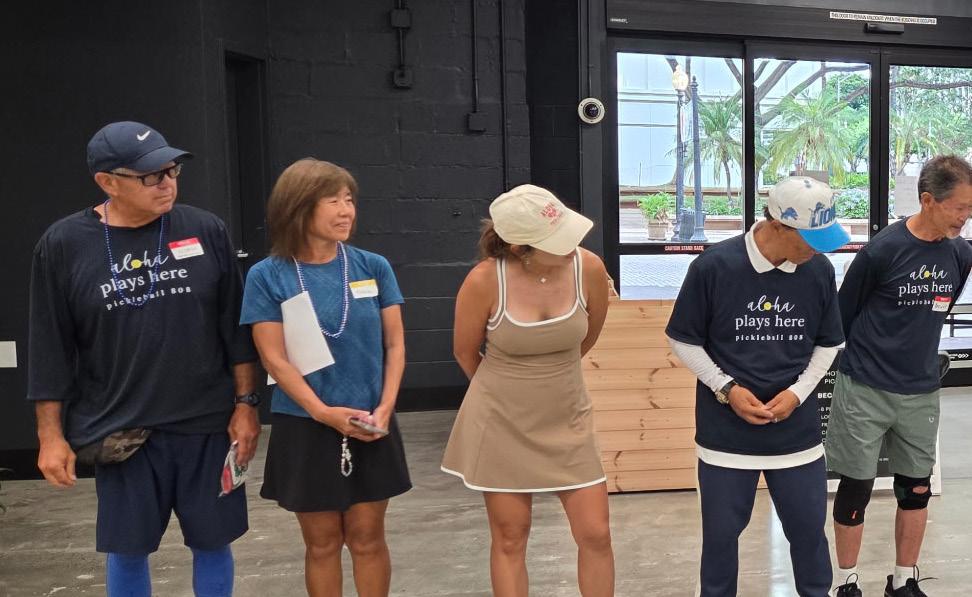
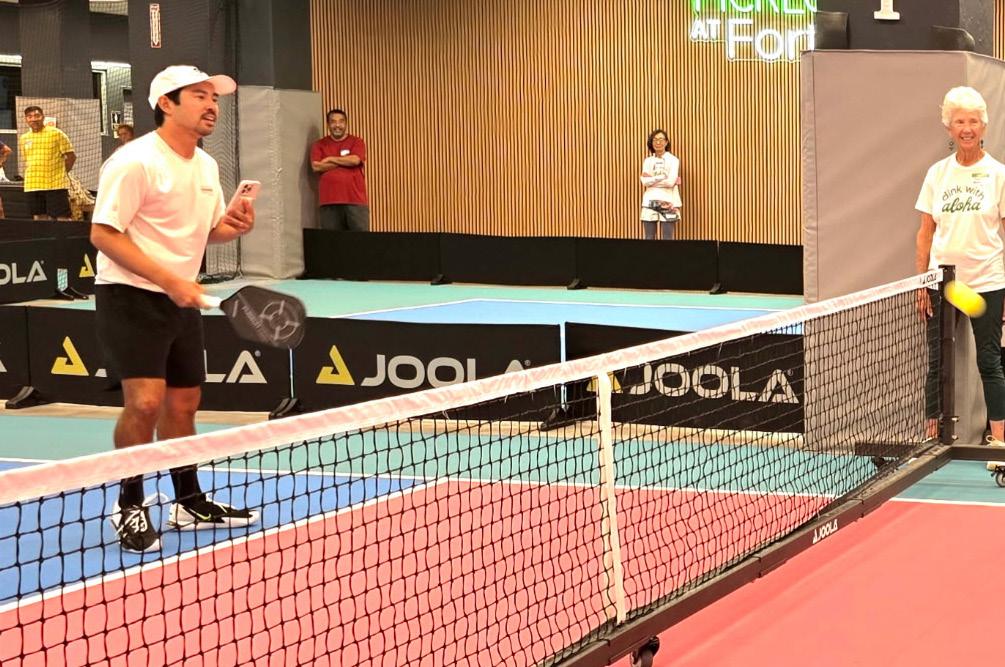



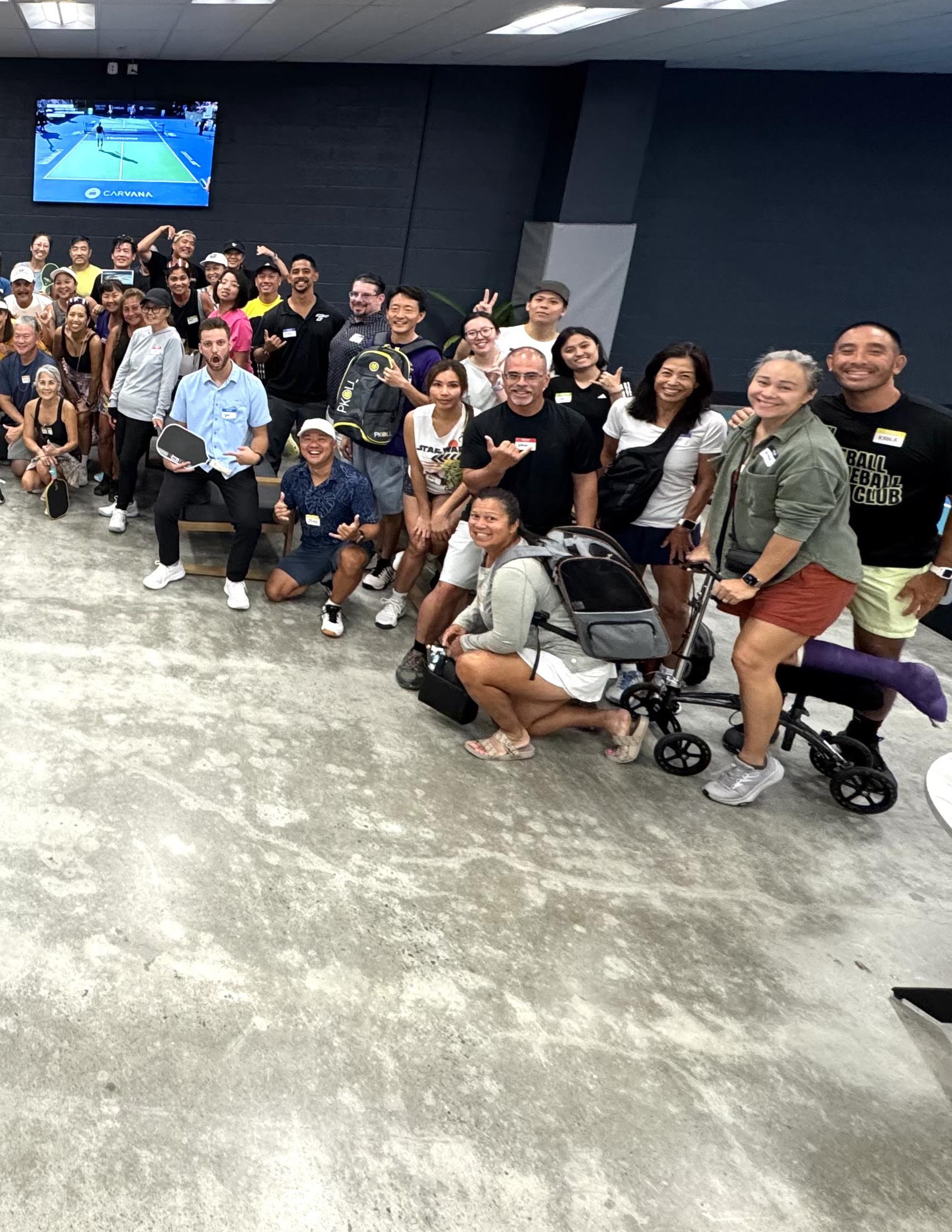
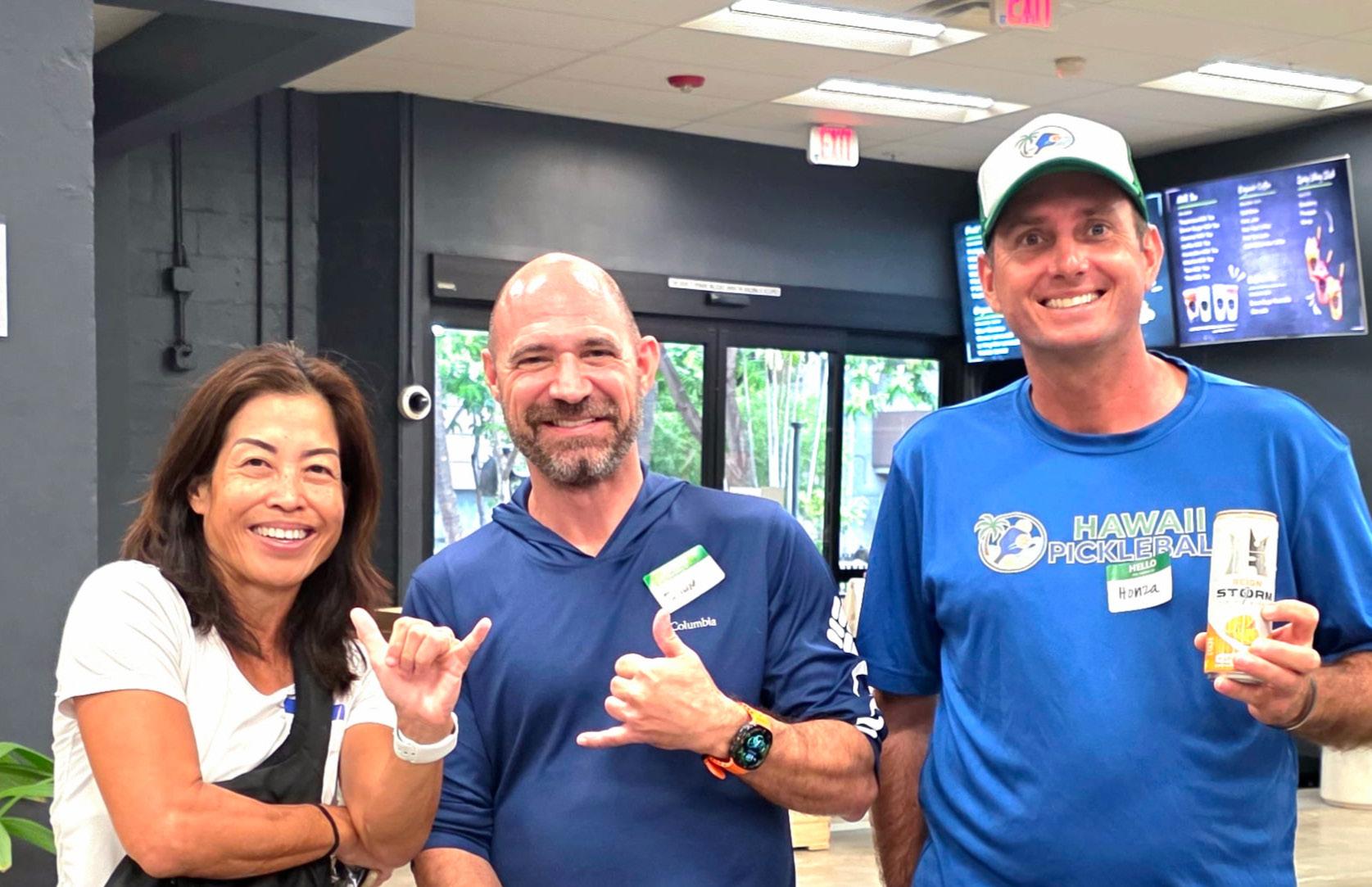

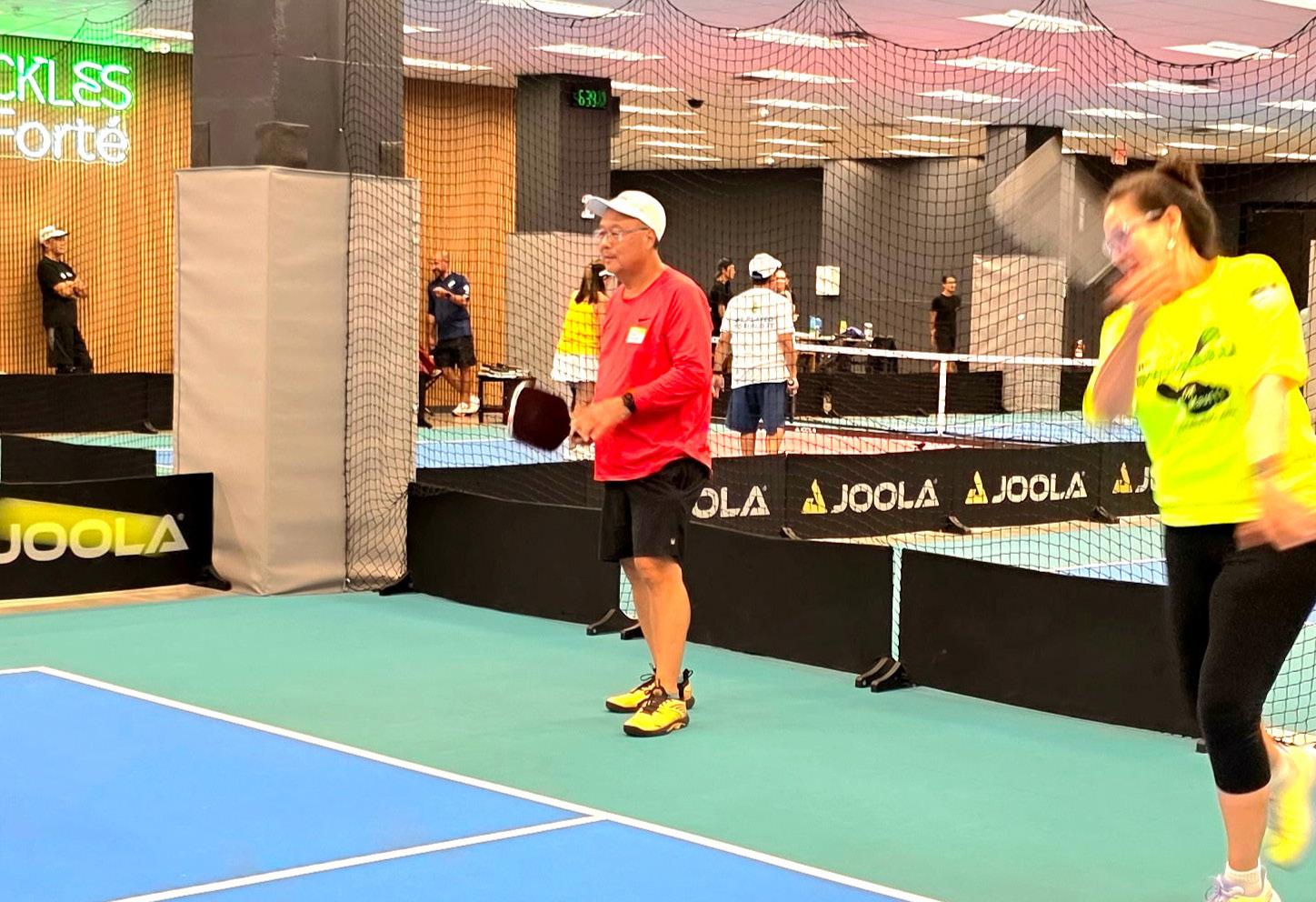


PICKLES AT FORTÉ

LEGACY AND BEAT THE PRO SPONSOR: JOOLA

BREAD AND BUTTER PICKLEBALL PRIZE VAULT SPONSOR: BREAD AND BUTTER PICKLEBALL

COLLECTOR’S SHOWCASE SPONSOR: WALFRIDO
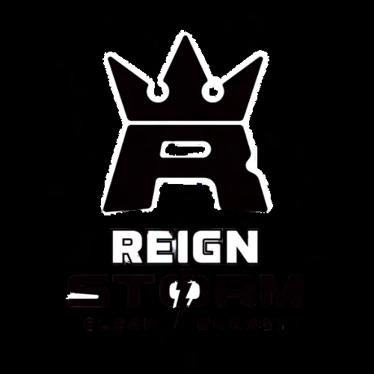
BIG ENERGY PARTNER: REIGN STORM

ISLAND GETAWAY SPONSOR: OUTRIGGER KONA RESORT AND SPA


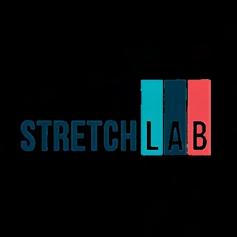


Studio 22K Trigger Grip Pro Stretch Lab Body Fit Training Ortho Sport HI
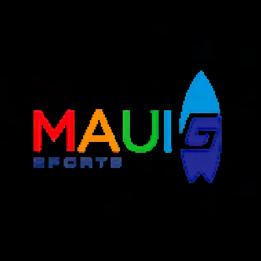


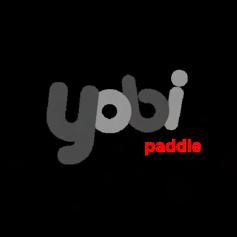
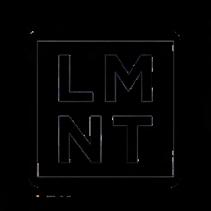
Maui-G Sports Lanikai CBD Sports Therapy K2 Pickleball Yobi Paddle LMNT





Jersey Mike’s PKOLL All Good Pickleball Still and Moving Center



SPONSORS

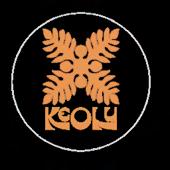


PickAloha Five Birdies Yoga Room Bakery Keolu Brand Hard Mountain Dew On Point Sports
COMMUNITY SPONSORS:
Ukulele Hale Holbrook
Pukaball Maui
Waiakea Water
Edgy Pickleball
PICKLEBALL FRIENDS FROM OUR COMMUNITY: Bruce Fujimoto and Sandy Kobayashi, Susan Kurisu, Carol Furuya, Stacy Hiramoto, Daphne Manago, Kipp Sakata, Nanna Brown/ The Kitchen Line, and a PB friend who wishes to remain anonymous
Everyday Player’s Paddle Review: Komodo Katana Kevlar® Pro 16MM
Real, relatable, and practical paddle + gear reviews for everyday players — through the eyes of real players, not just pros.







MAUI: September 4-7, 2025: 2025 PKOLL Maui Open
HILO: September 19-21, 2025: Doubles Dink for Cancer 2025
May 17: Oahu: Hookuku Pickleball Tournament, Schofield Barracks
May 24: Oahu: King Intermediate Pickleball Fundraiser, Kaneohe
May 17: Oahu: Hookuku Pickleball Tournament, Schofield Barracks
May 31: Oahu: Maui Wildfire Disaster Relief Pickleball Fundraiser, Honolulu
May 24: Oahu: King Intermediate Pickleball Fundraiser, Kaneohe
May 31: Oahu: Maui Wildfire Disaster Relief Pickleball Fundraiser, Honolulu
The complete list of all upcoming tournaments and events in Hawaii
The complete list of all upcoming tournaments and events in Hawaii

• Played a sunrise match this week •
• Cheered for your opponent’s point •
• Tried a new court •
• Forgot your water bottle •
• Made a new friend on the courts •
• Read this magazine cover to cover •
• Subscribed to our newsletter (right?) •
• Told a friend to do the same •
• Got a story or a player we should feature? Let us know! •
• Know someone who’d love to connect with this community?
We’d love to hear from them!
Want to get involved? Become an ambassador or contributor— we’re always looking forpeople who love the game and our Hawaii PB community.
Not getting our emails? Check your spam, promotions, or updates folder— and move us to your Primary inbox so you never miss a beat. © 2025 Hawaii Pickleball Magazine. All rights reserved. We love sharing our community’s stories — please don’t reuse without permission.

